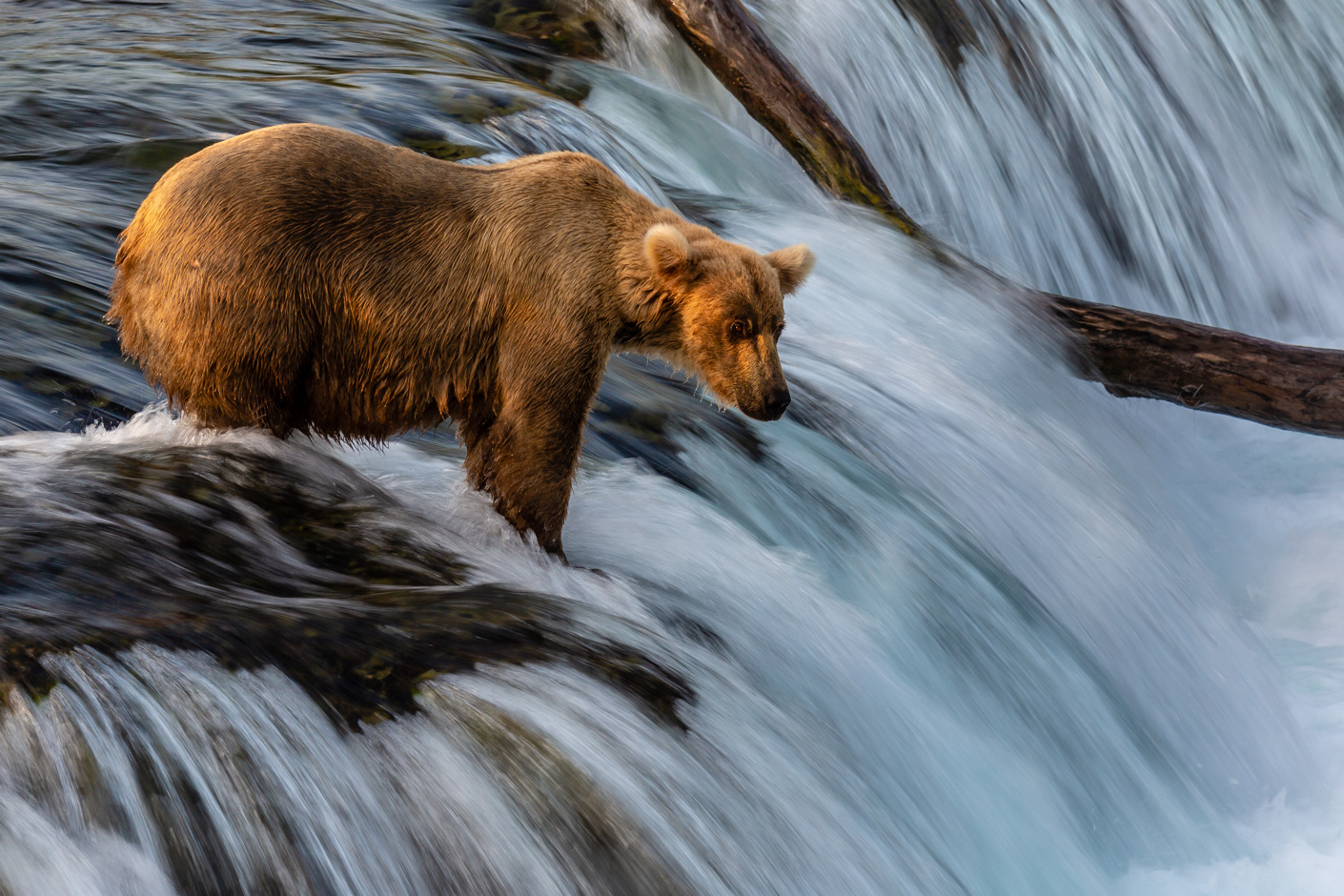
During the 2019 summer season in Katmai National Park, temperatures reached record highs for the sixth time in the last ten years. With temperatures soaring over 33 degrees celsius (90 Fahrenheit), the sockeye salmon run completely shutdown for two weeks. Hungry bears still waited at Brooks Falls in anticipation for the return of the salmon for as long as they could before hunger drove them to forage elsewhere. After two weeks, the temperature broke and the salmon run exploded, with over 500 fish jumping the falls per day. Taken in Katmai National Park, July 2019. Photo by Ben Blankenship.


This little snake has spunk. Though only mildly venomous, with rear facing fangs, it lashes out at anything that gets too close. This is a daytime photo taken with a low-powered ring flash to reduce stress on the animal. Taken in Puerto Jimenez, Costa Rica. December 2019. Photo by Ben Blankenship.

One of my favorite Costa Rican birds, the emerald toucanet loves its fruit, as can be seen here. But it also hunts other birds’ eggs and chicks, including the famous resplendent quetzal. Taken in San Gerardo de Dota, Costa Rica. December 2019. Photo by Ben Blankenship.



A juvenile three toed sloth on Costa Rica’s Osa Peninsula. September 2021. Photo by Ben Blankenship.

A dominant male howler stares me down unafraid and in full display of his dominance. Taken on the Osa Peninsula of Costa Rica. Taken April 2019. Photo by Ben Blankenship/©2020

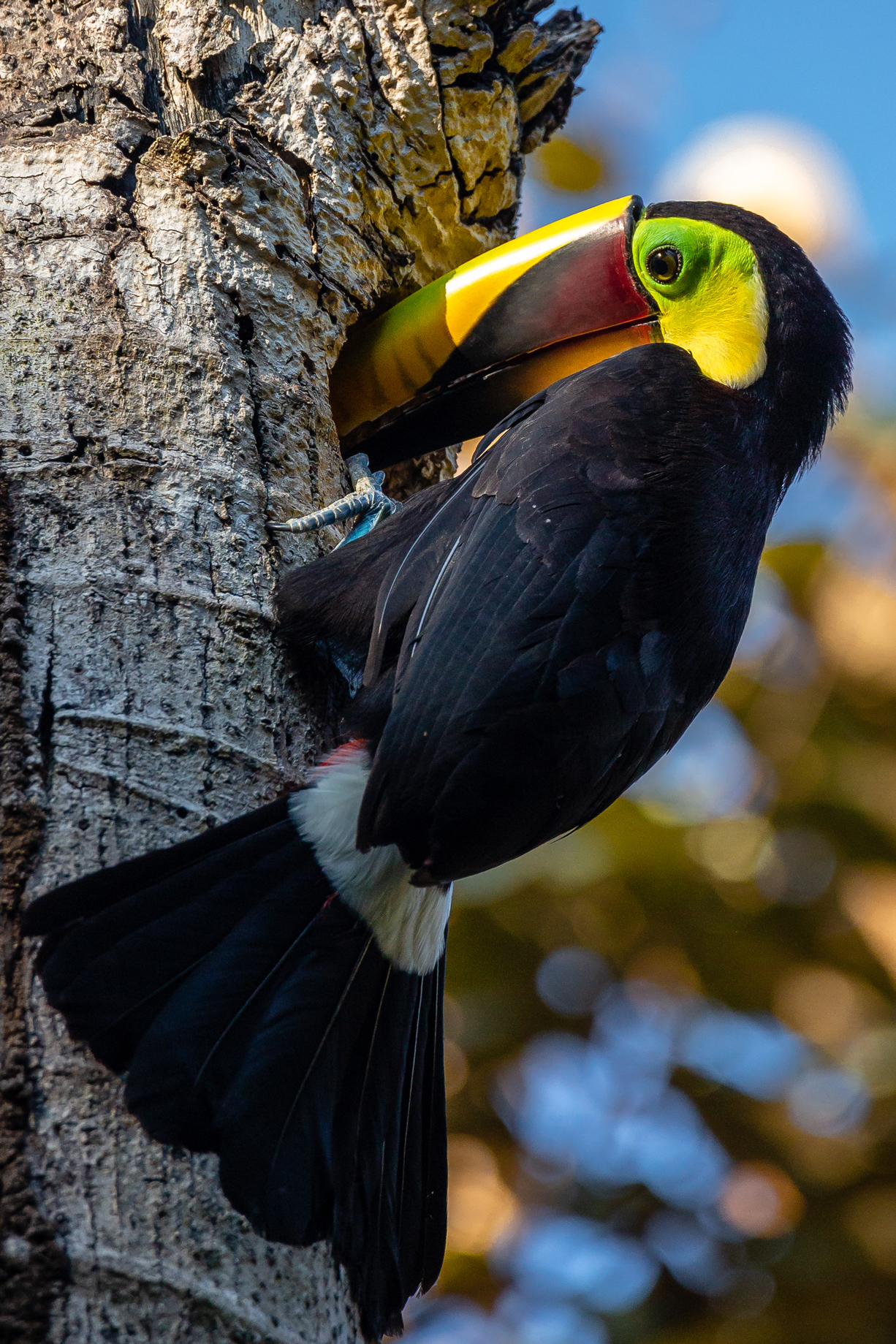
Many people don’t realize that toucans are opportunistic omnivores. They do eat fruits and nuts, but also are notorious amongst Costa Rican locals for raiding the nests of other birds, snatching up eggs and even baby birds. Taken in Carate, Costa Rica, February 2019. Photo by Ben Blankenship.




Katmai NP, Alaska. September 2021. By Ben Blankenship.




Osa Peninsula, Costa Rica. September 2021. By Ben Blankenship.

Kenai Fjords NP, Alaska. June 2021. By Ben Blankenship.

Yellowstone National Park. October 2020. By Ben Blankenship.
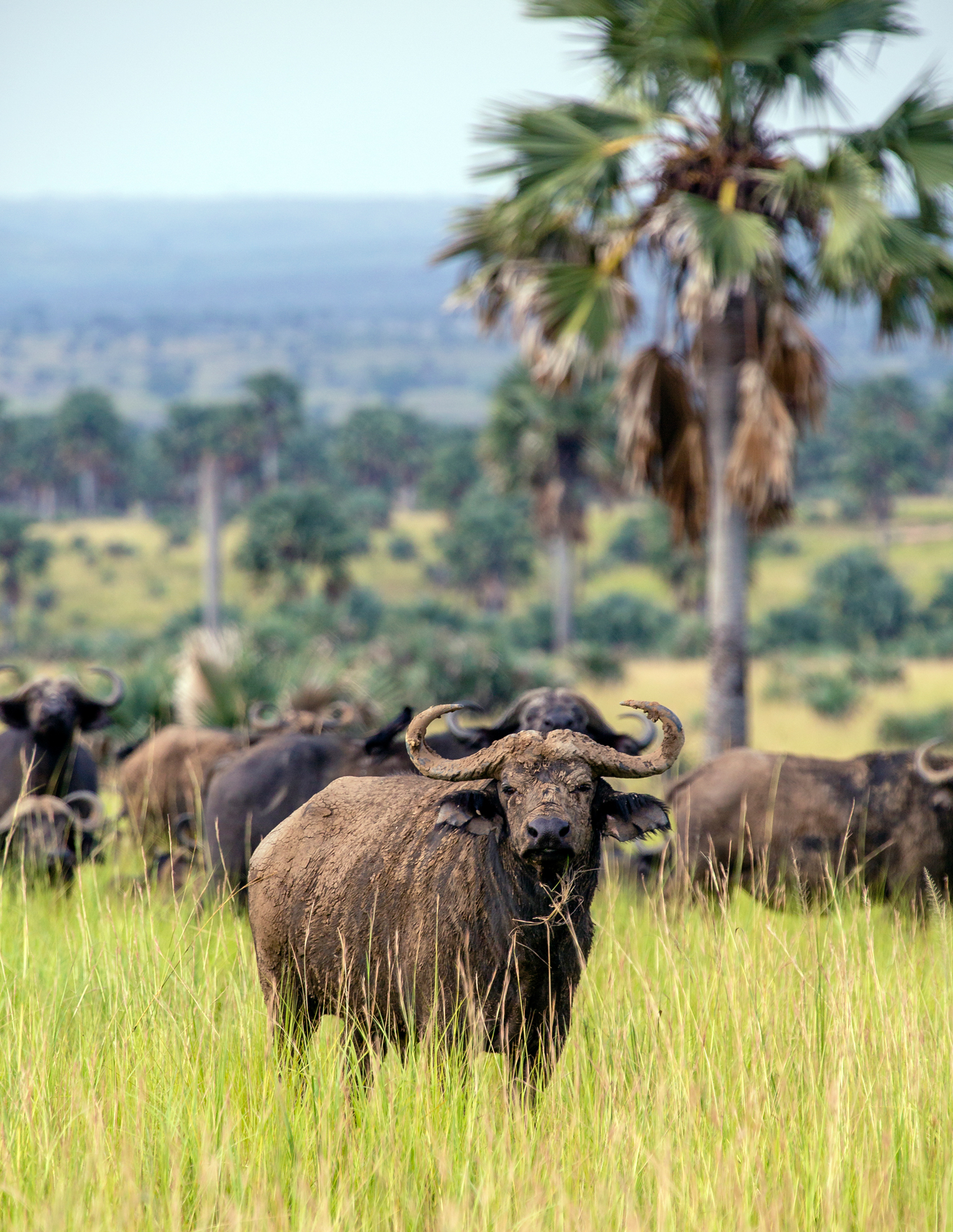
Taken in Murchison Falls National Park, Uganda. July 2018. Photo by Ben Blankenship.

A dominant male brown bear shows off his battle scars in Katmai National Park, Alaska. Taken September 2019. Photo by Ben Blankenship/©2020
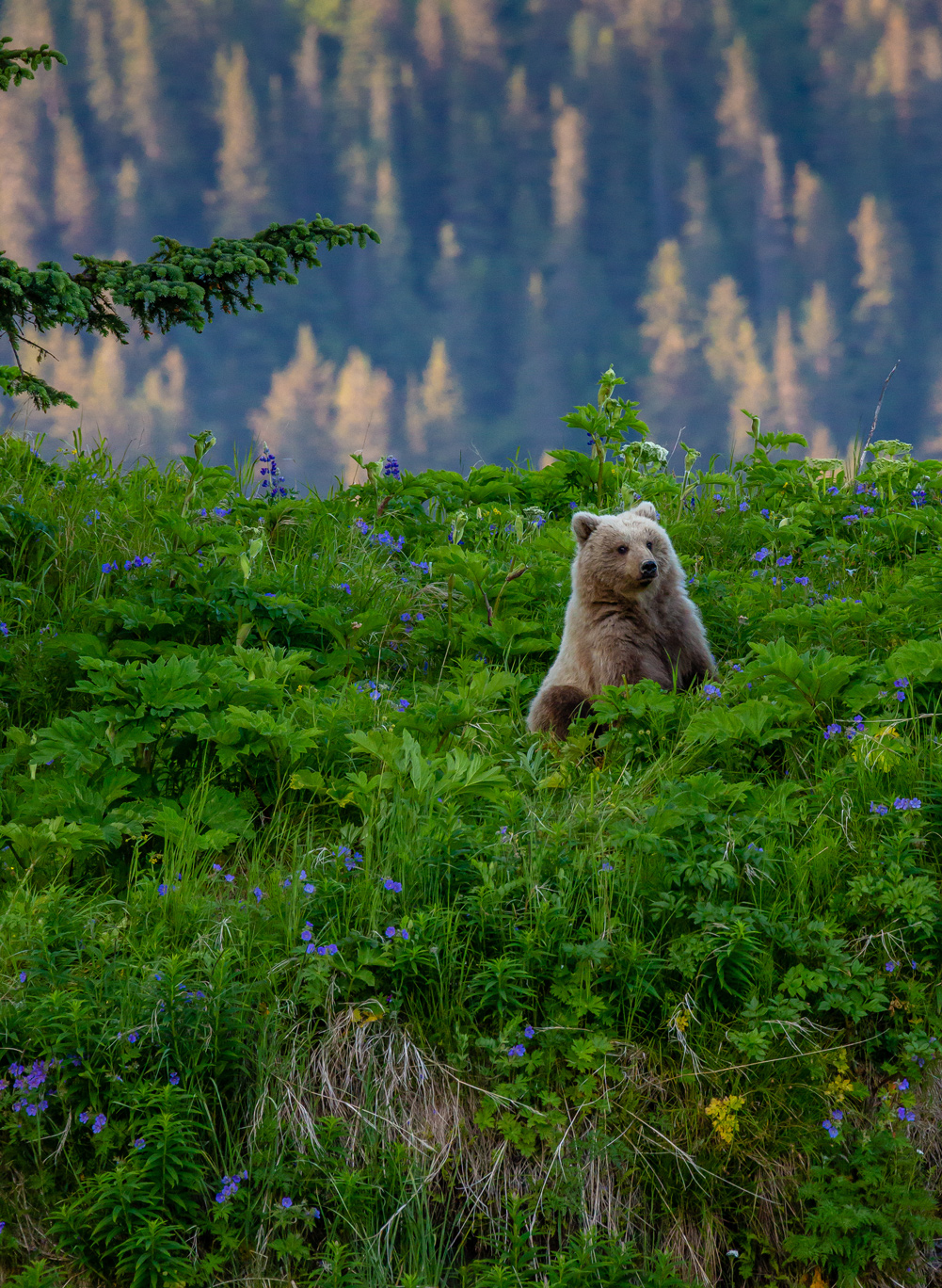
For my 2019 trip into Lake Clark National Park, I found myself surrounded by brown bears from sun up oil sun down and beyond. This subadult bear had picked a perch to bed down for a few hours between feeding amongst the arctic lupine flowers. This image is one of my favorites from the trip, as it has a magical feel to it. Taken in Lake Clark National Park, June 2019. Photo by Ben Blankenship.


The unofficial mascot of Costa Rica, the red eye tree frog is a photographer’s favorite. Its blood red eyes and blue stripes make it a real stunner. This day time photo was made with the assistance of the amazing folks at Osa Interactive Gardens in Puerto Jimenez. Taken December 2019. Photo by Ben Blankenship.

A violet eared humming bird feeds on a flower in the cloud forests of Costa Rica’s Talamanca Mountains. Taken February 2020. Photo by Ben Blankenship. ©2020

A three toed sloth moves through a tree with her young offspring clinging to her underside. Sloths like these are common along the canals of Tortuguero National Park, Costa Rica. Taken in February 2020. Photo by Ben Blankenship/©2020

This is Benita, a young boa constrictor that was hit by a car several months back near Puerto Jimenez, Costa Rica. It was brought to Osa Interactive Gardens to be rehabilitated under the watchful care of the property’s owners. Now the snake is used to educate local students on how to deal with snakes safely, an important lesson in Costa Rica! Taken December 2019. Photo by Ben Blankenship.

Kenai Fjords NP, Alaska. June 2021. Photo by Ben Blankenship.

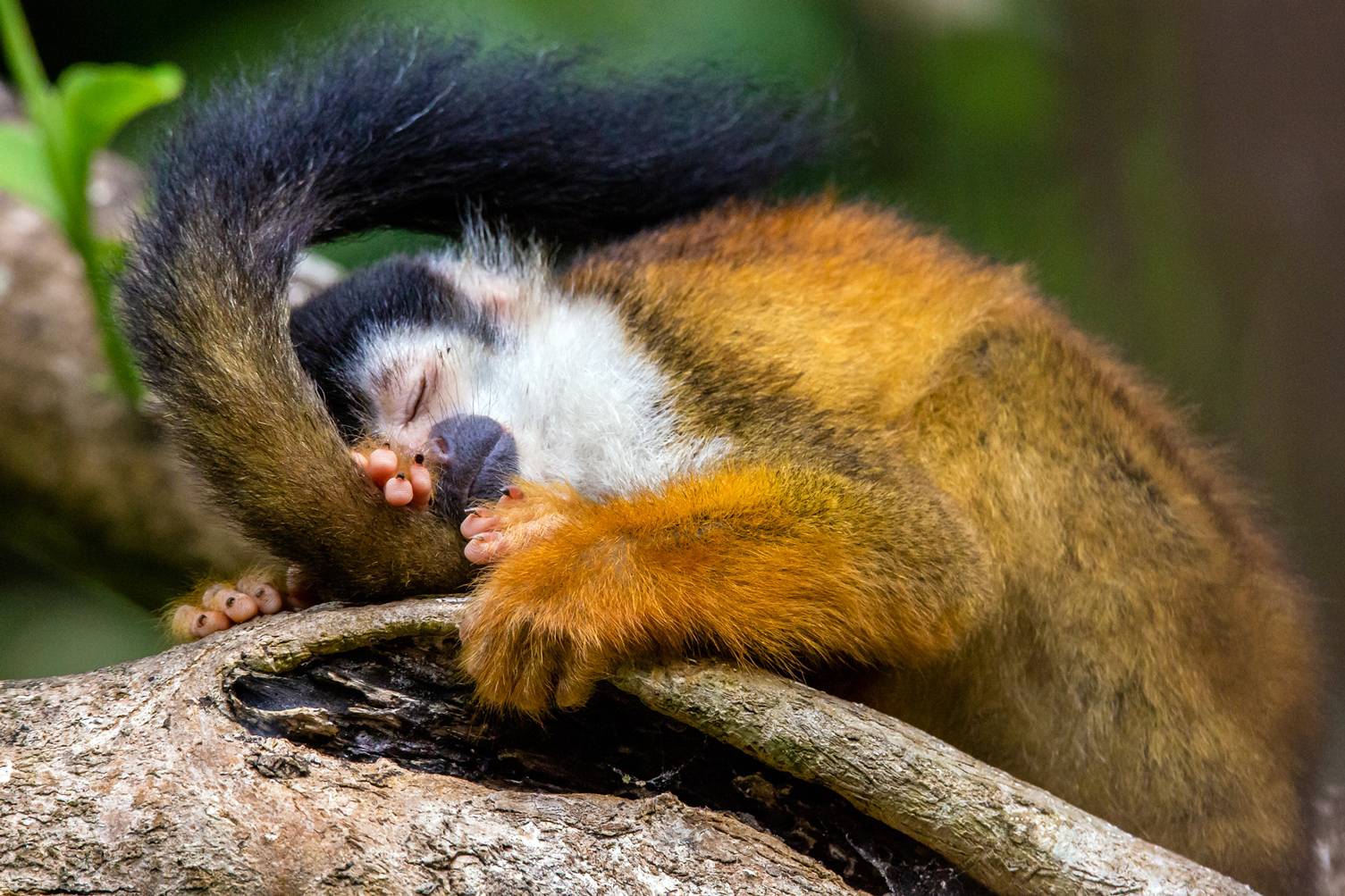
This squirrel monkey took a short break from foraging and closed its eyes for a few moments on Costa Rica’s Osa Peninsula. Taken in Carate, Costa Rica. December 2018. Photo by Ben Blankenship.

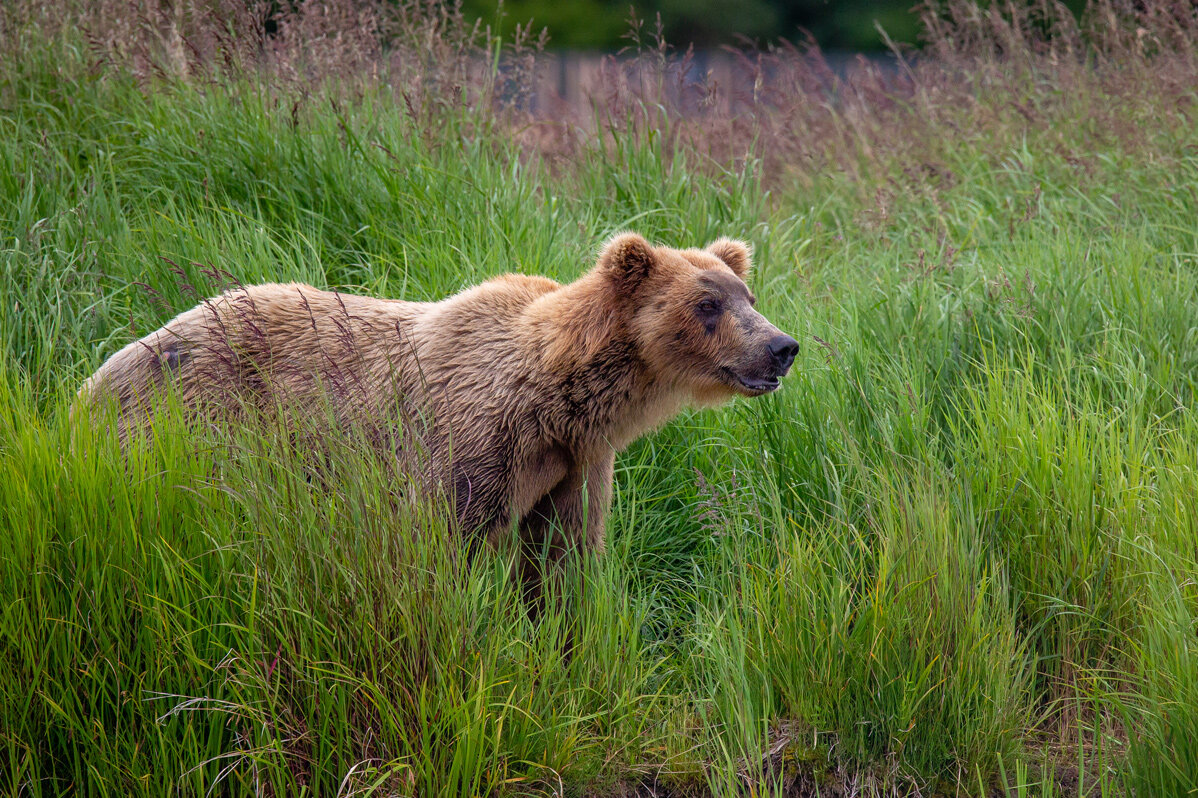
Wading along the Brooks River in Katmai National Park is like performing a constant dance to keep a safe viewing distance from the multiple brown bears fishing in the river. This pretty young female emerged from the tall grasses just behind me, giving me a real surprise. I retreated to a safe distance for shooting this image. Taken in Katmai National Park, July 2019. Photo by Ben Blankenship.

I spotted this quetzal in the cloud forests near San Gerardo de Dota, Costa Rica. You can tell by the length of his tail that he is a young male. A mature male’s tail can be over 75% longer than this bird’s. Taken December 2019. Photo by Ben Blankenship.

A juvenile spectacled caiman rests on a log on Costa Rica’s Osa Peninsula. Taken February 2020. Photo by Ben Blankenship. ©2020


The depth of this tapir’s eyes tell of a soul and intelligence beyond our ability to understand. This female was moving through thick underbrush in Costa Rica’s Corcovado National Park. Taken in February 2020. Photo by Ben Blankenship/©2020

The red eye tree frog is the unofficial mascot of Costa Rica, and is one of my favorite macro subjects to photograph. This female frog was hanging around the ponds of Osa Interactive Gardens which allowed some daytime shots of this little beauty. Taken in Puerto Jimenez, Costa Rica, December 2019. Photo by Ben Blankenship/©2020
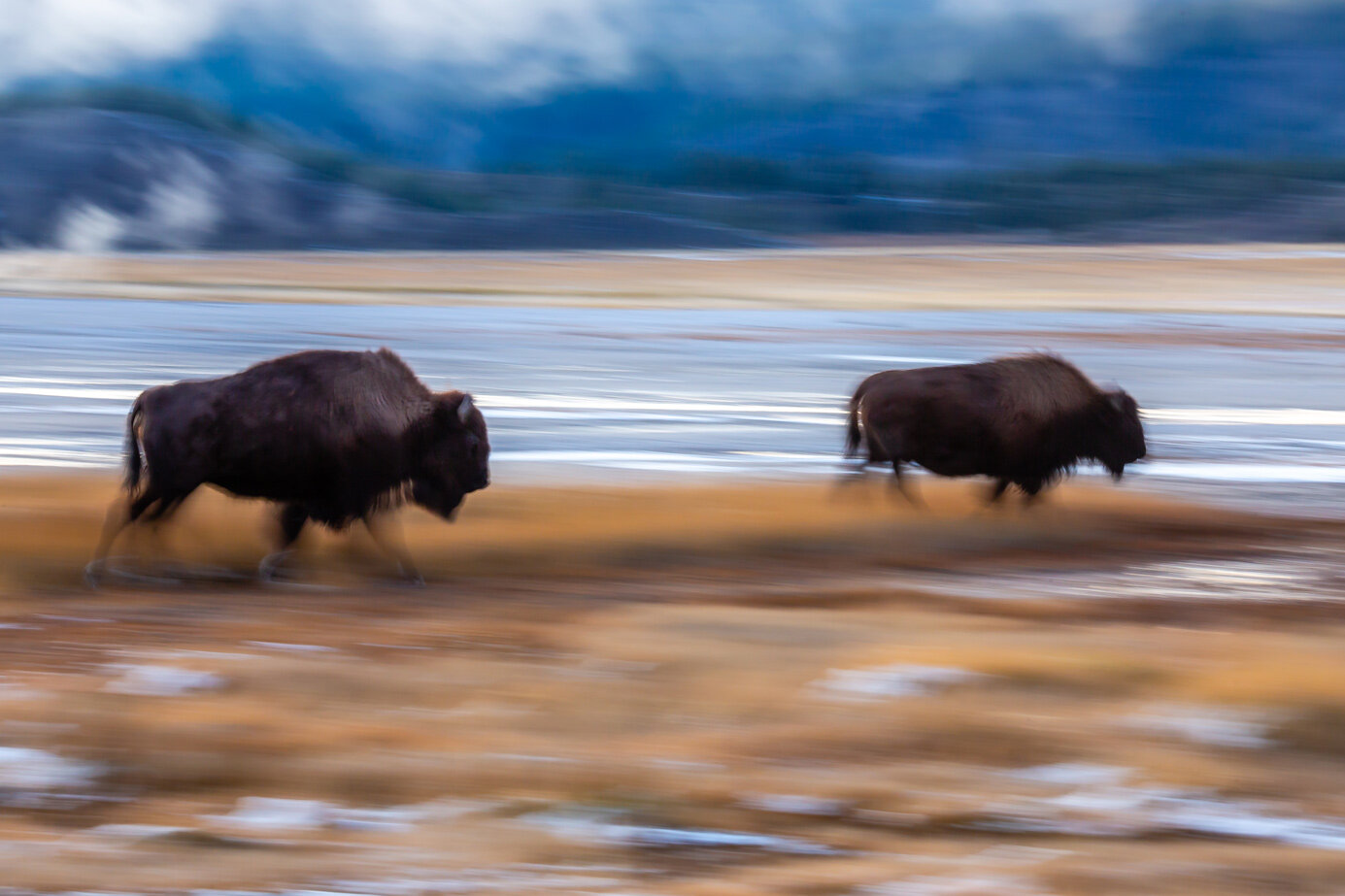
A bull bison follows a female across the lower geyser basin in Yellowstone National Park. Taken in September 2019. Photo by Ben Blankenship.
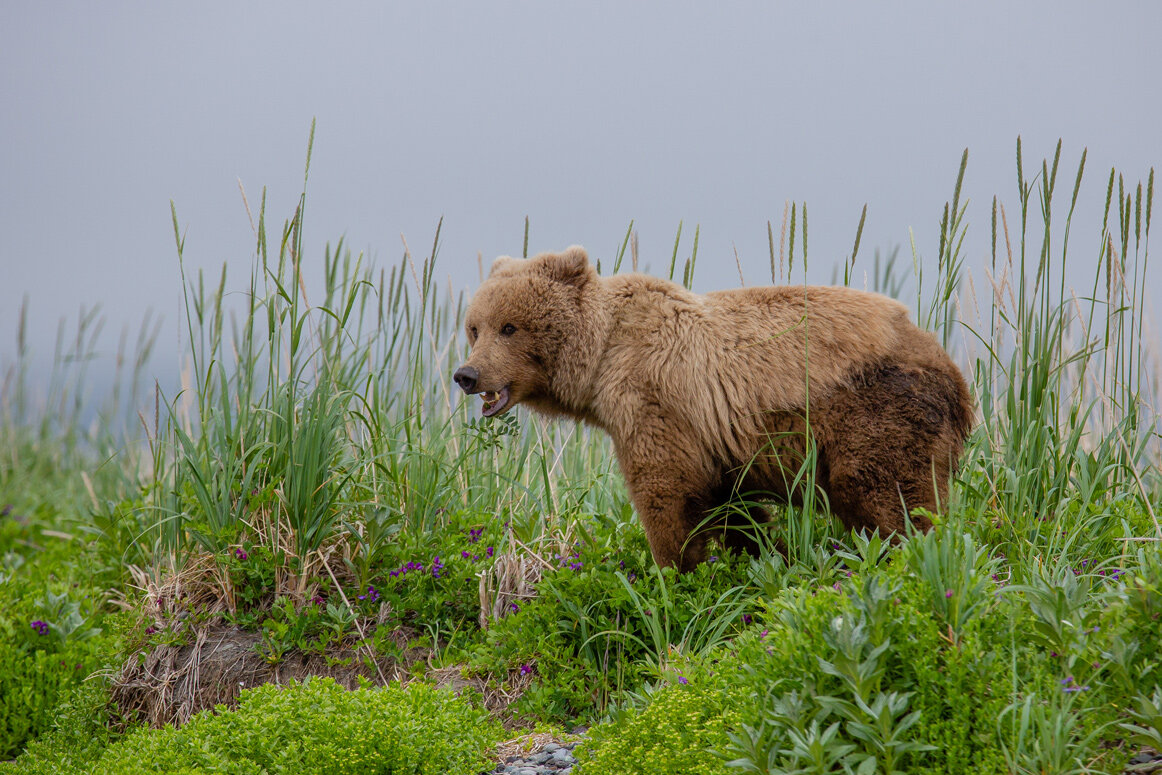
This young female became known as Limpy during my stay in Lake Clark National Park. A noticeable wound can be seen on her left rear leg, most likely caused by another bear. Brown bears in Lake Clark National Park, like other brown bears, are constantly jockeying for dominance, occasionally fighting. This young bear was most likely caught off guard by another bear, as she is too small to want to stand up and fight at this point in her life. Taken in June 2019. Photo by Ben Blankenship.

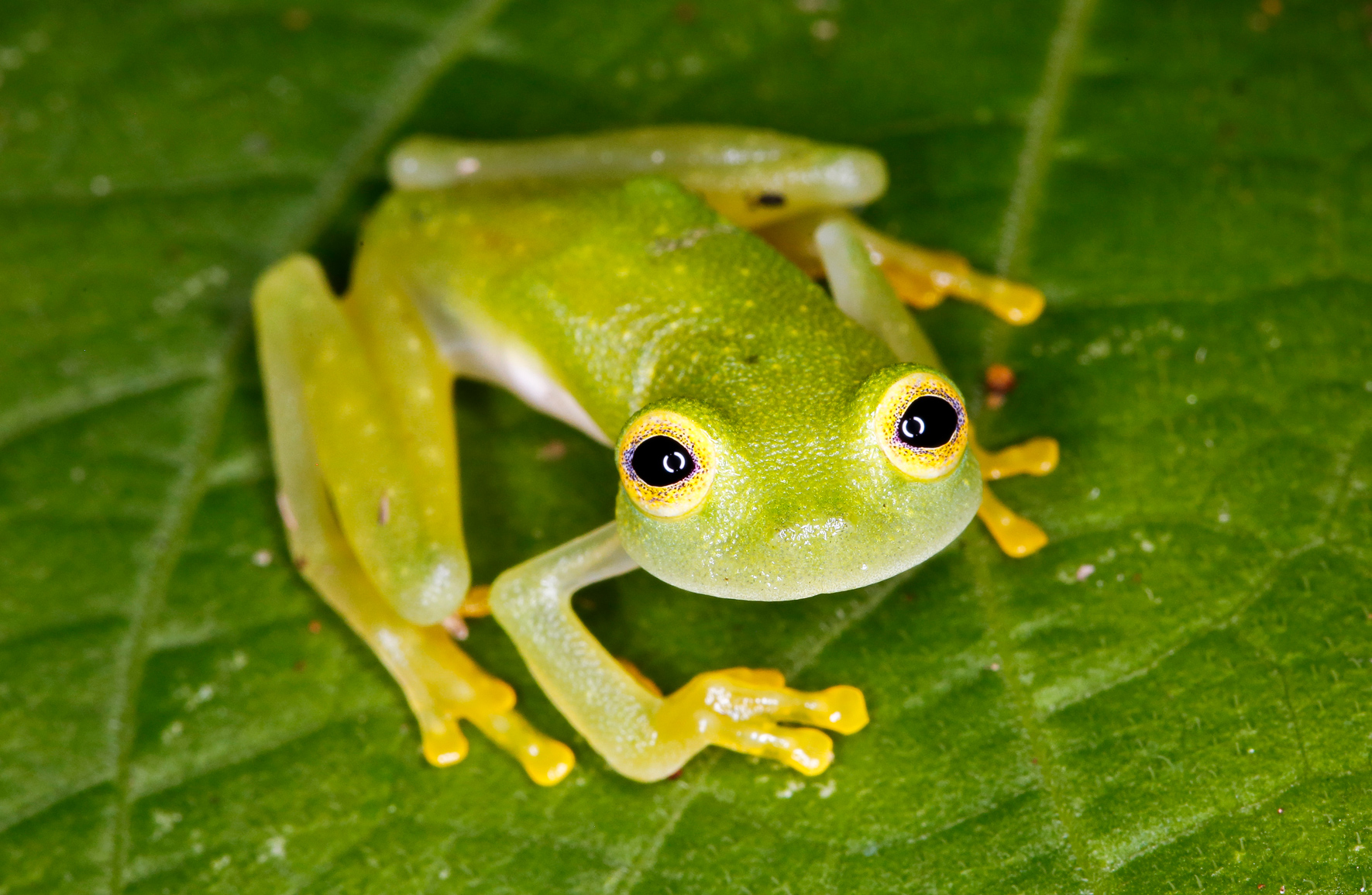
Glass frogs get their name from their characteristic translucent skin which allows them to better blend in with whatever surface they are sitting on as a defense mechanism. The bare hearted glass frog is considered to be the most transparent of all of the glass frog species. This individual was smitten with the camera flash. After this image was taken, the frog jumped onto the camera lens, crawled up onto the flash, and then jumped onto my face. Taken March, 2017. Carate, Costa Rica. Photo by Ben Blankenship.



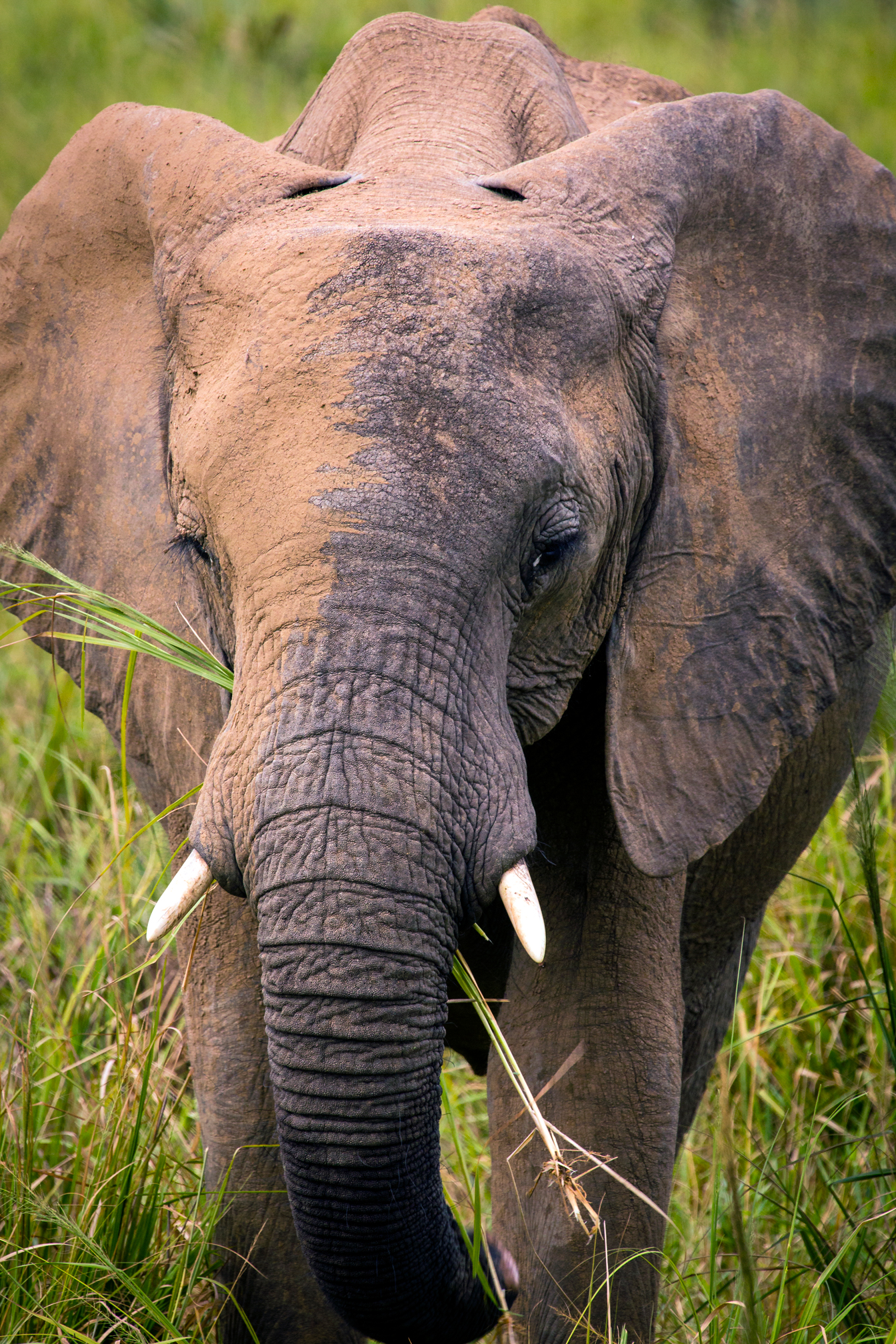
Taken in Murchison Falls National Park, Uganda. July 2018. Photo by Ben Blankenship.

Taken in the could forests of San Gerardo de Dota, Costa Rica. December 2019. Photo by Ben Blankenship.
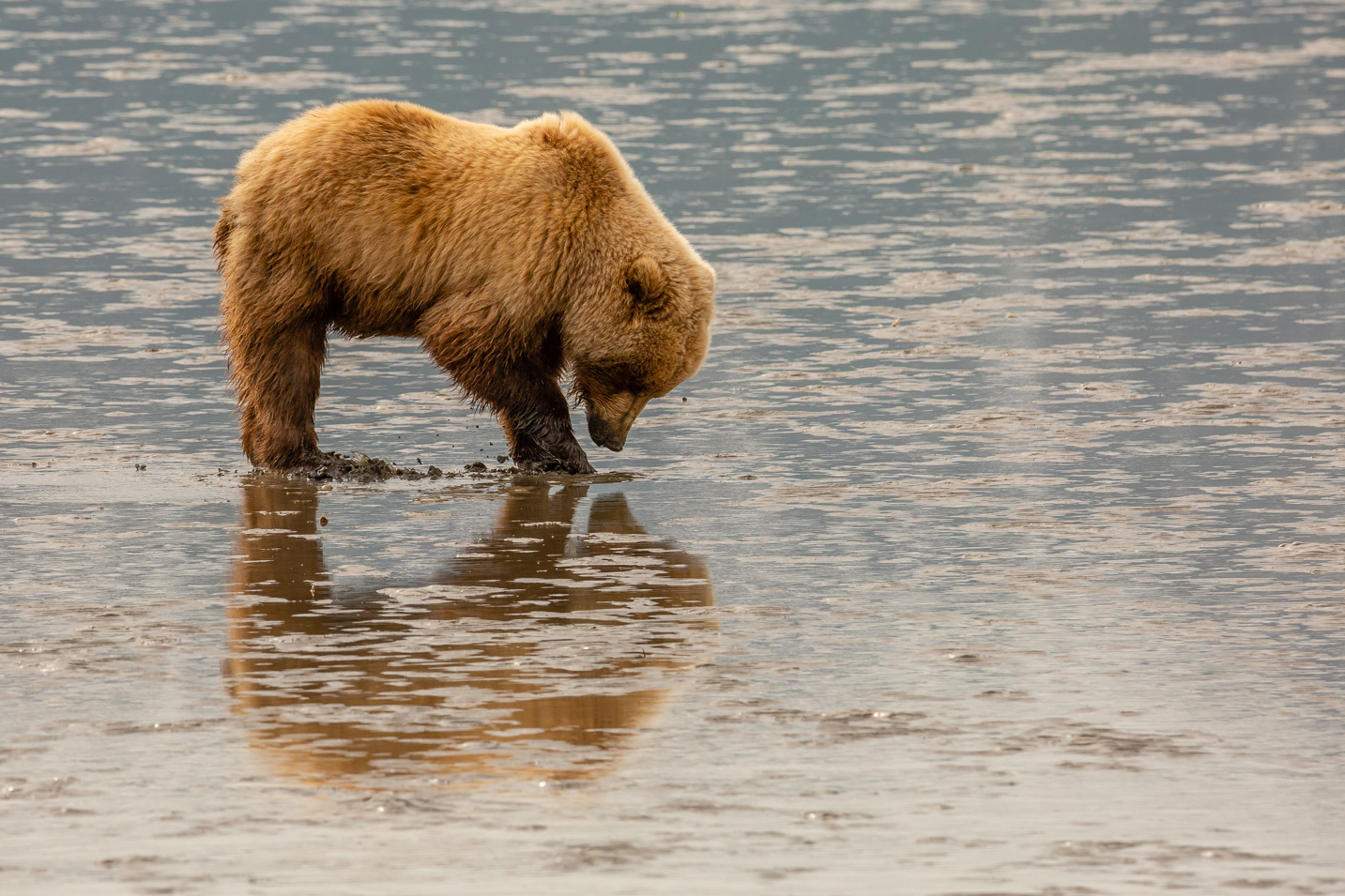
A subadult brown bear digs for clams at low tide on Chinitna Bay in Lake Clark National Park, Alaska. Twenty years ago, only a few of the local bears were known to dig for clams during low tide. But, this generation of coastal brown bears has taken up clamming as one of their primary means of finding protein after they leave their dens in the spring. Taken in Lake Clark National Park, Alaska. June 2019. Photo by Ben Blankenship.
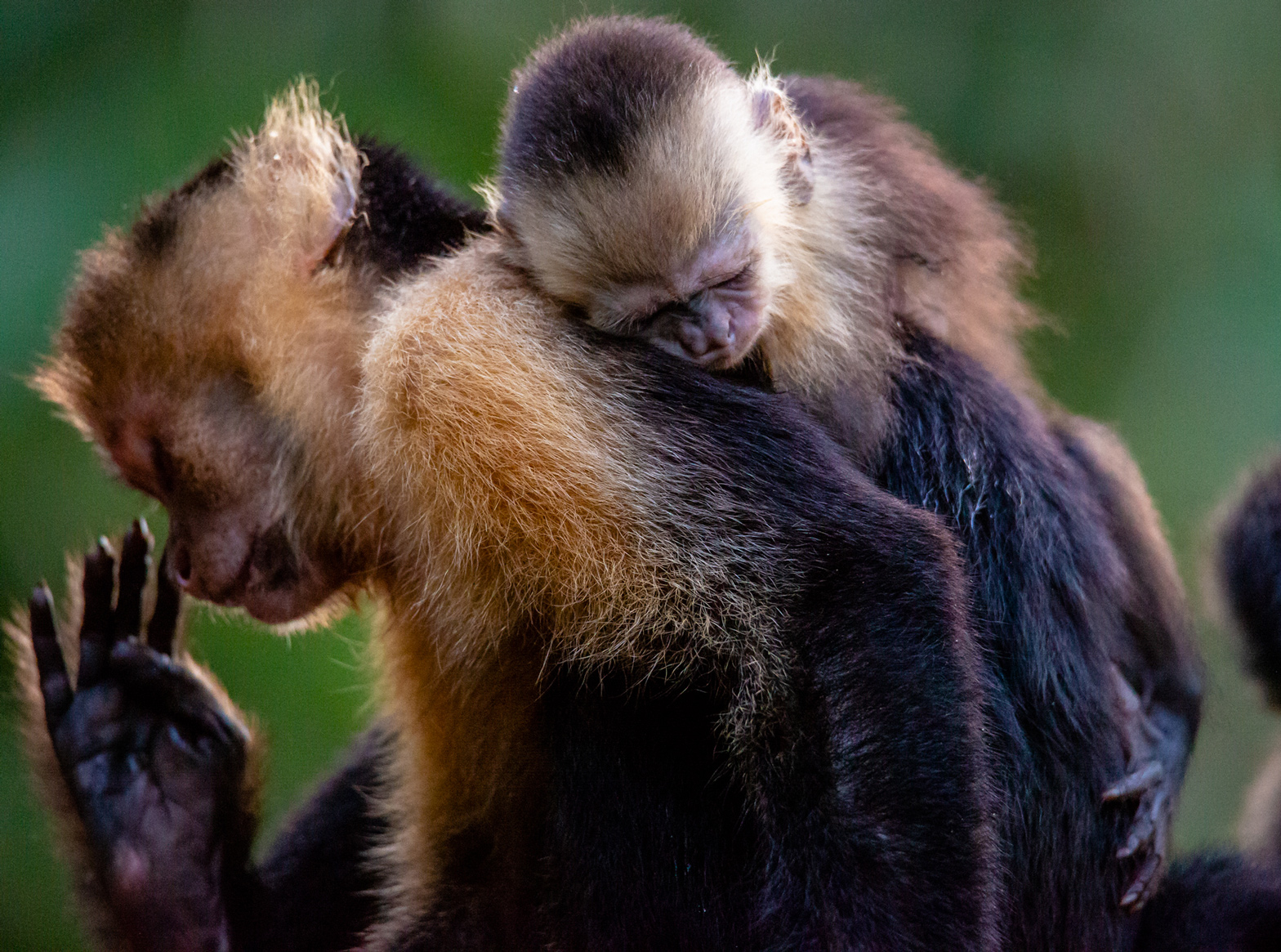
A baby white faced capuchin clings to its mother’s back in Costa Rica. Taken in Carate, Costa Rica. December 2018. Photo by Ben Blankenship.
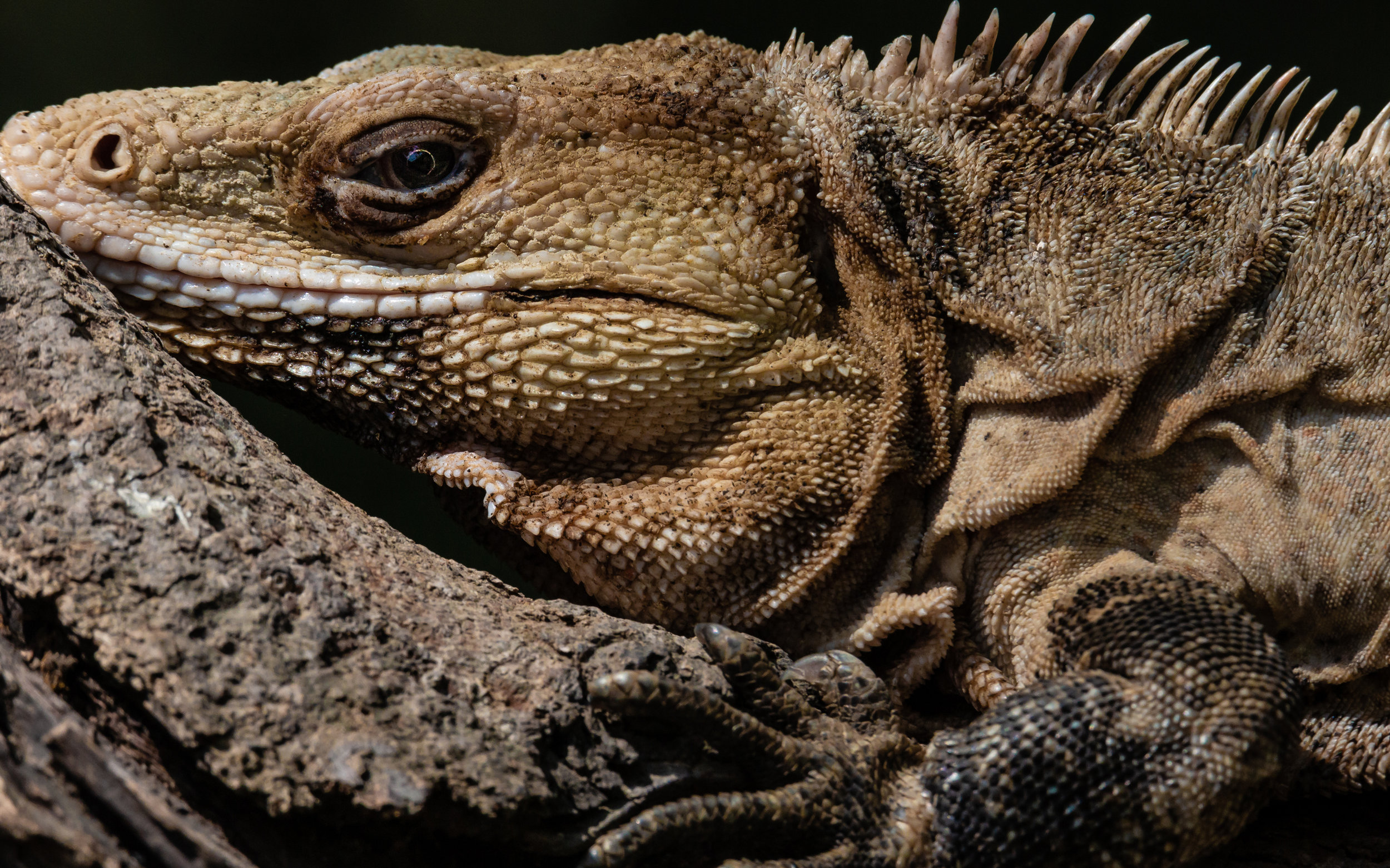
Amongst the most common of Osa Peninsula reptiles, the black spiny tailed iguana may be photogenic, but has attitude! This big male has occupied the same tree for the last two years, scaring off any rivals with that gaping mouth and aggressive head banging. Taking in Carate, Costa Rica, February 2019. Photo by Ben Blankenship.
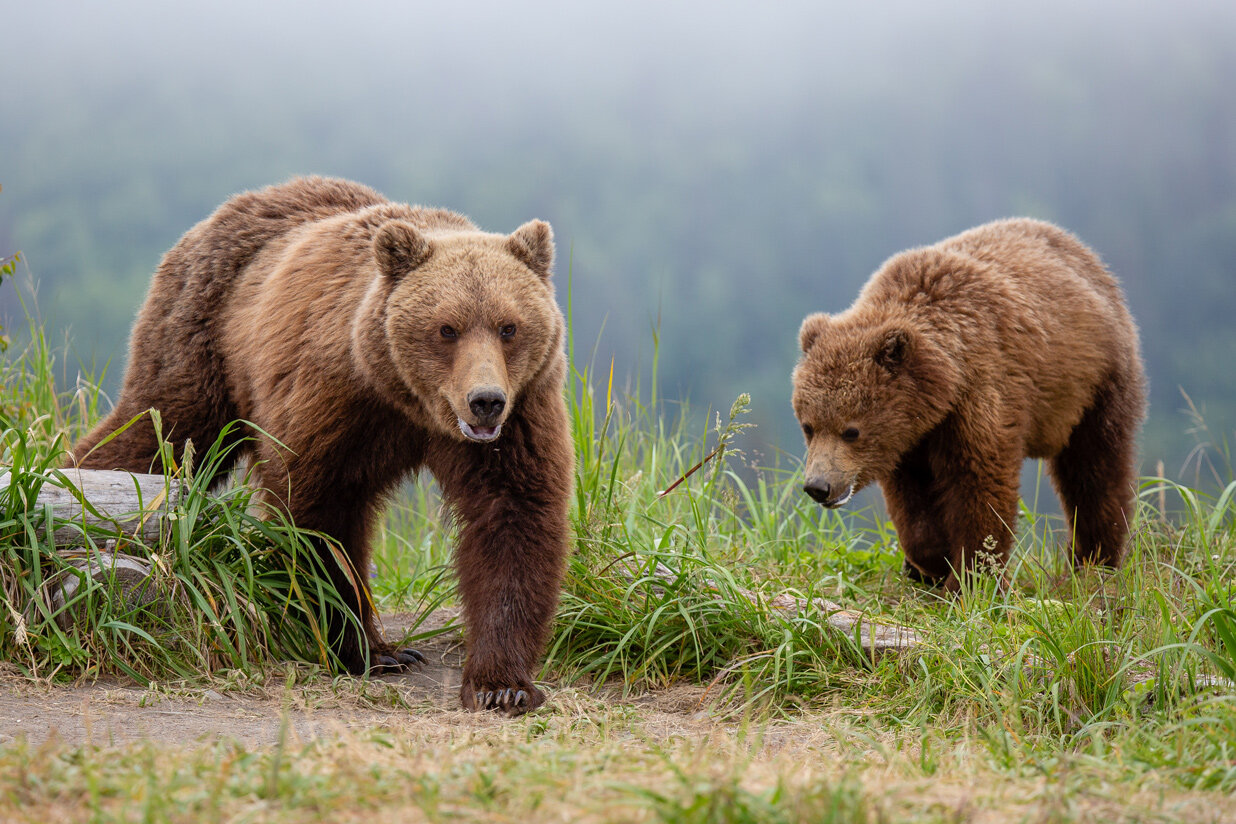
I’ve photographed brown and black bears in several destinations in Alaska, Montana, and Wyoming. And of those, Lake Clark National Park is my favorite. The bears here are everywhere and wild. This mother and cub surprised me by coming over a low hill on my left while I was photographing a different female bear. I was able to grab a quick shot before slinking back out of their way. Taken in June 2019. Photo by Ben Blankenship.
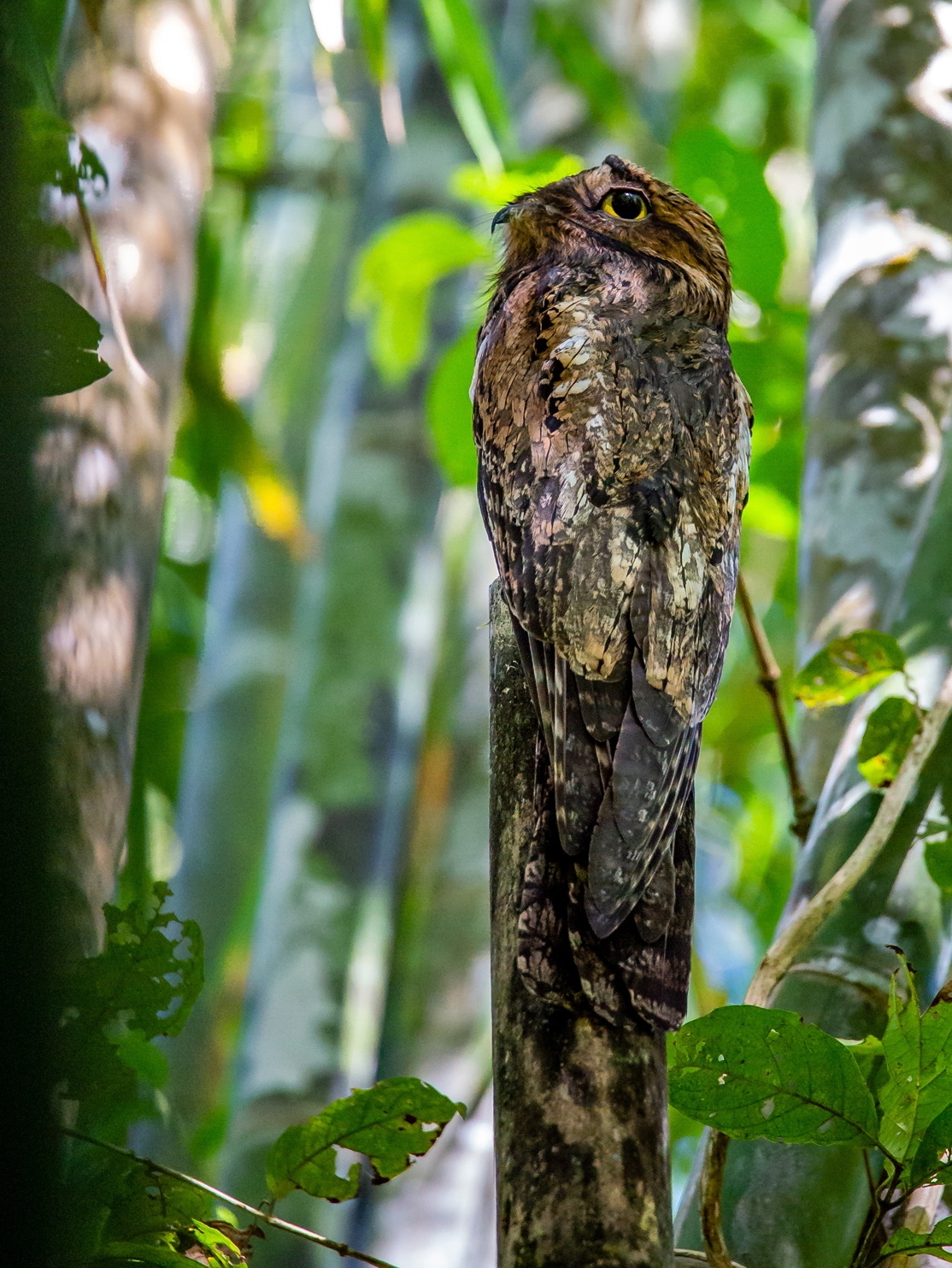
This pootoo spent nearly three weeks on this perch guarding its nest and eggs. In Spanish, this bird is known as pajaro palo, translated as “stick bird,” for its incredible camouflage. Taken on the Osa Peninsula, Costa Rica. December 2018. Photo by Ben Blankenship.

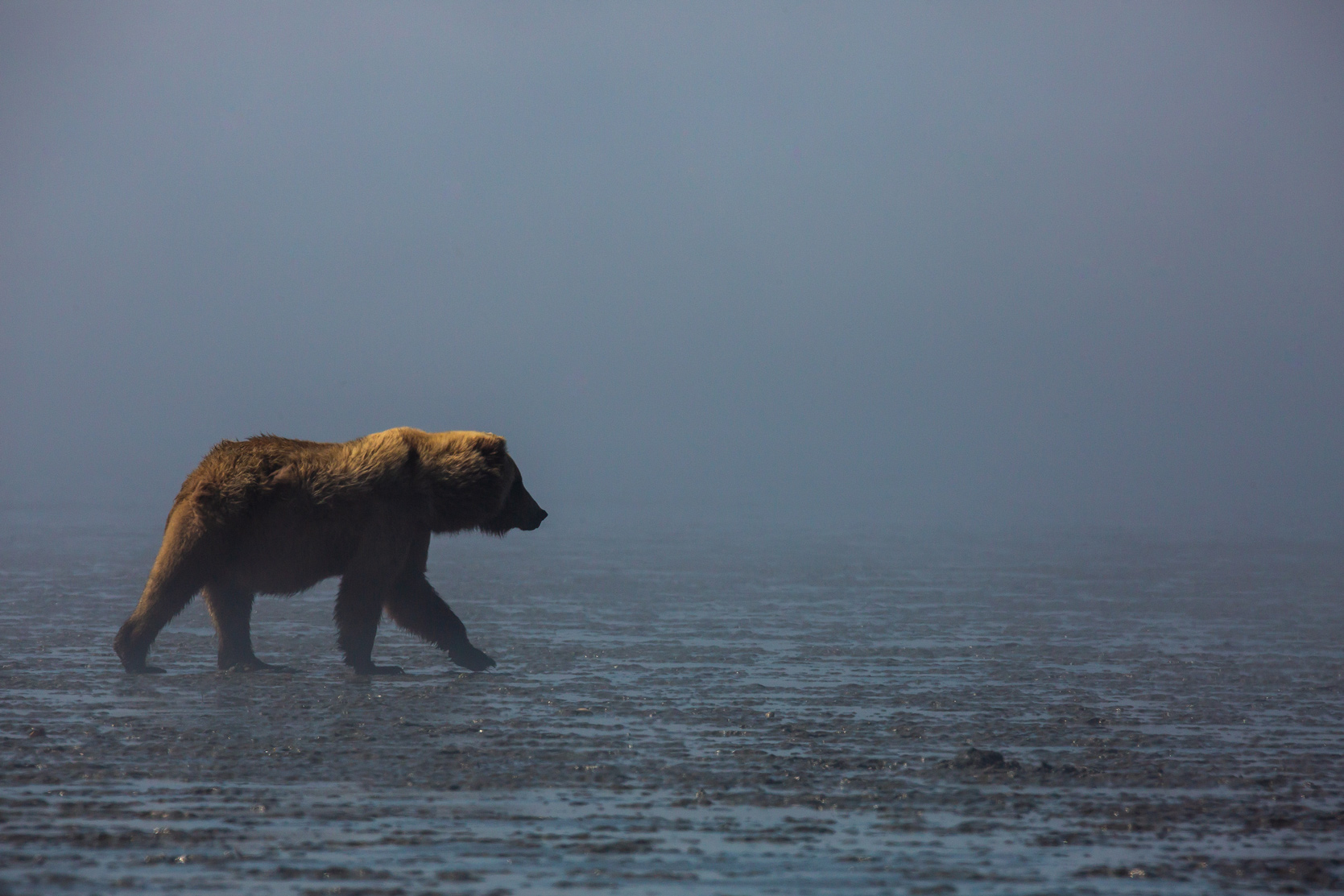
Lake Clark National Park is a remote wilderness in southern Alaska, and it is one of the premier locations for viewing wild coastal brown bears in their natural habitat. It is also one of my favorite locations for photographing bears due to the variety of backgrounds and behaviors one is able to witness there. In this photo, a bank of thick fog blanketed the Chinitna Bay mud flats as bears were clamming. Taken in Lake Clark National Park, Alaska. June 2019. Photo by Ben Blankenship.
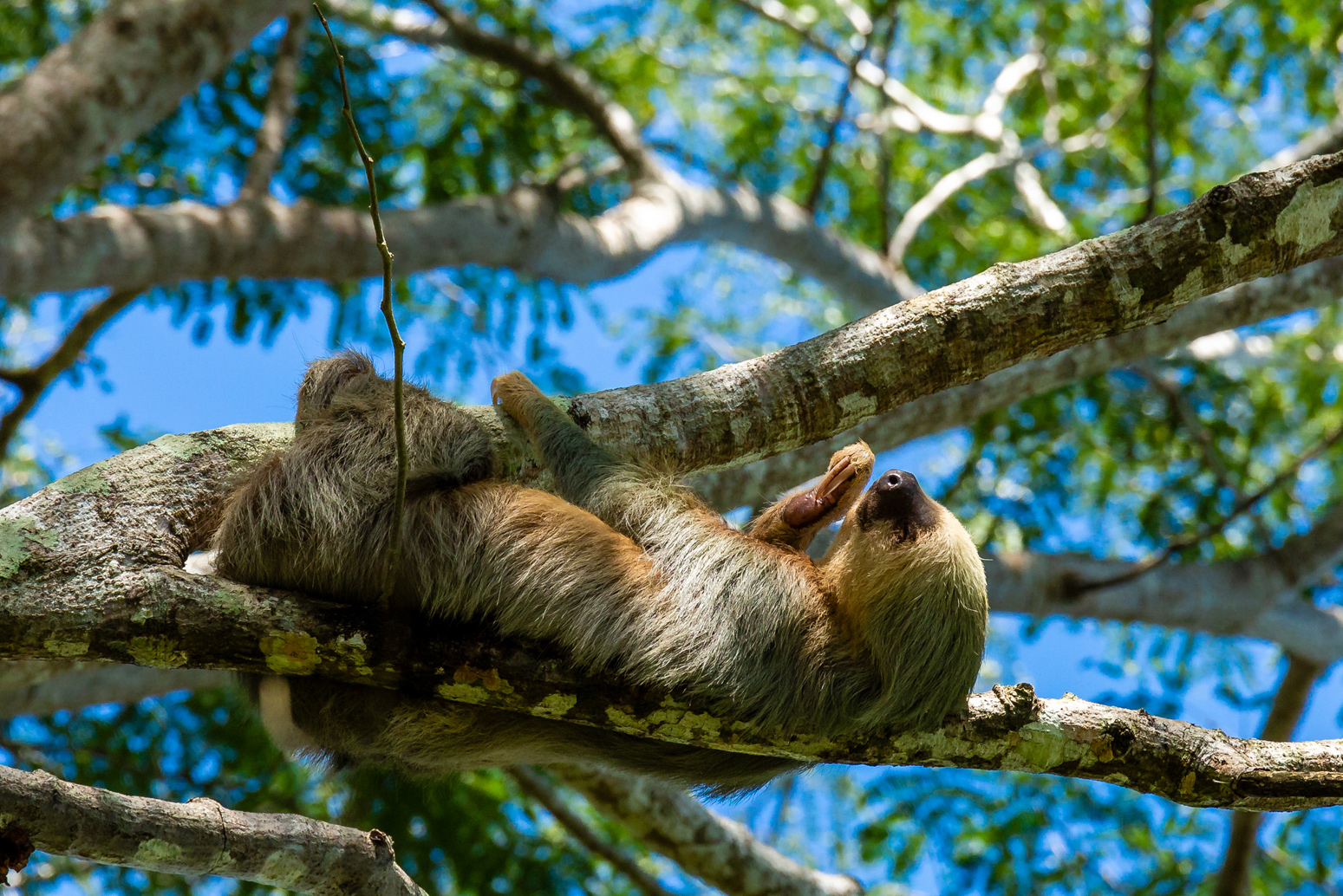
This two toed sloth happened to fall asleep in a great pose for this photograph. Taken on the Osa Peninsula, Costa Rica. December 2018. Photo by Ben Blankenship.
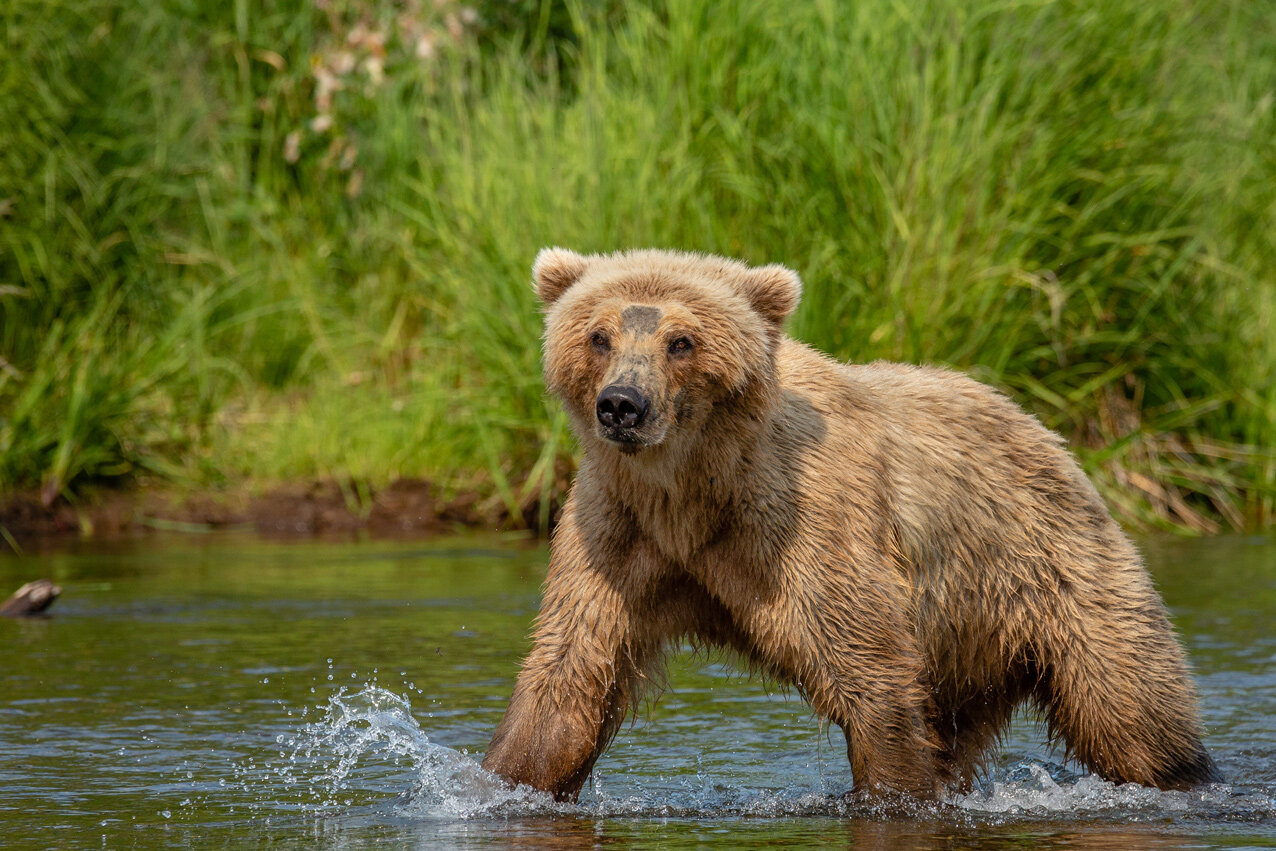
One of my favorite bears seen at Brooks Falls in Katmai National Park, I took to caring her Blondie. Here she moves up Brooks River in search of summer sockeye salmon. Taken Katmai National Park, Alaska. July 2019. Photo by Ben Blankenship.

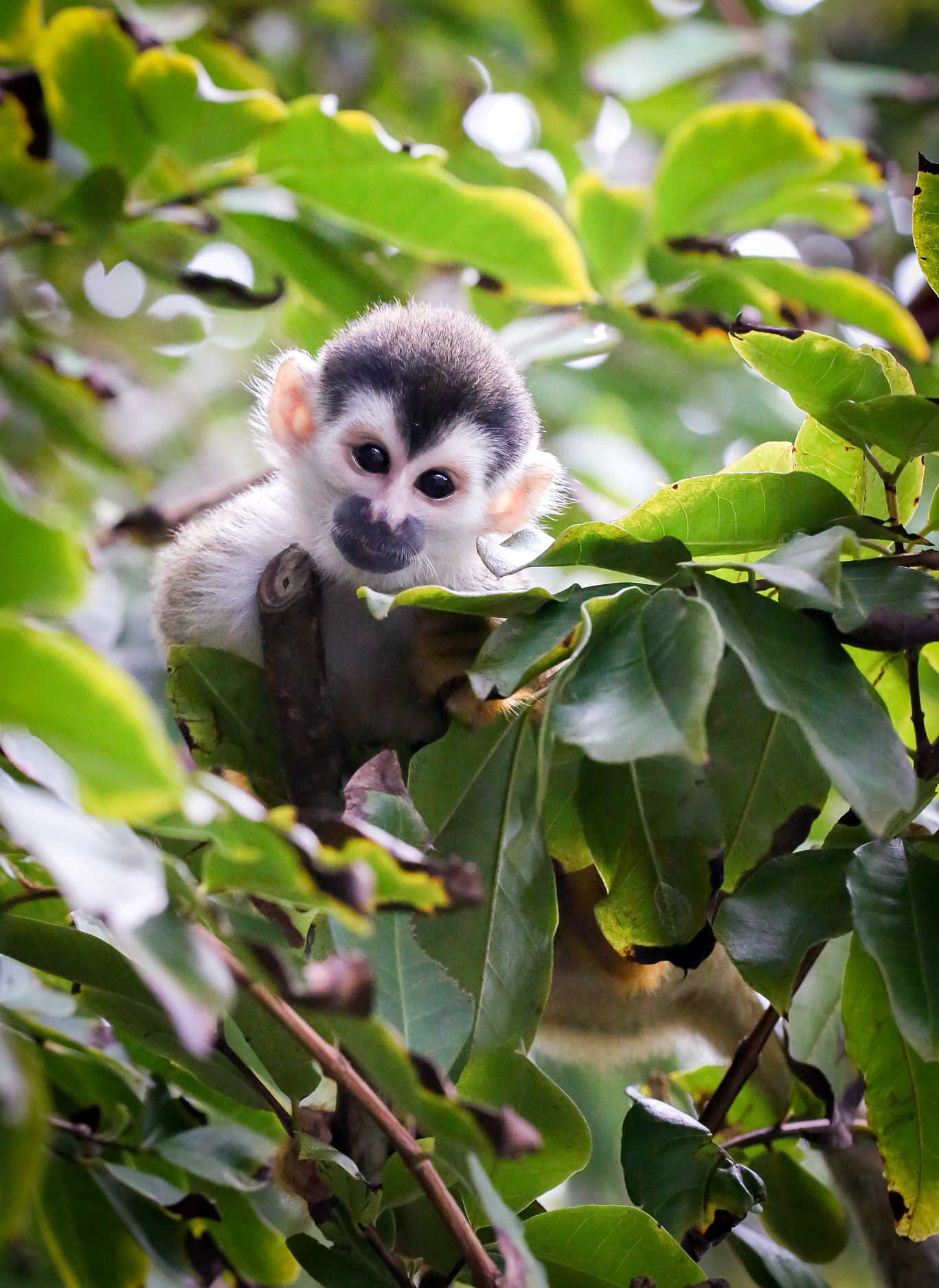
Often called the "elves of the Costa Rican rainforest," squirrel monkeys are agile, playful, and intelligent. The smallest of the four primate species living in Costa Rica, it is believed that they first made their way to Central America as pets of traders and/or indigenous nomads.
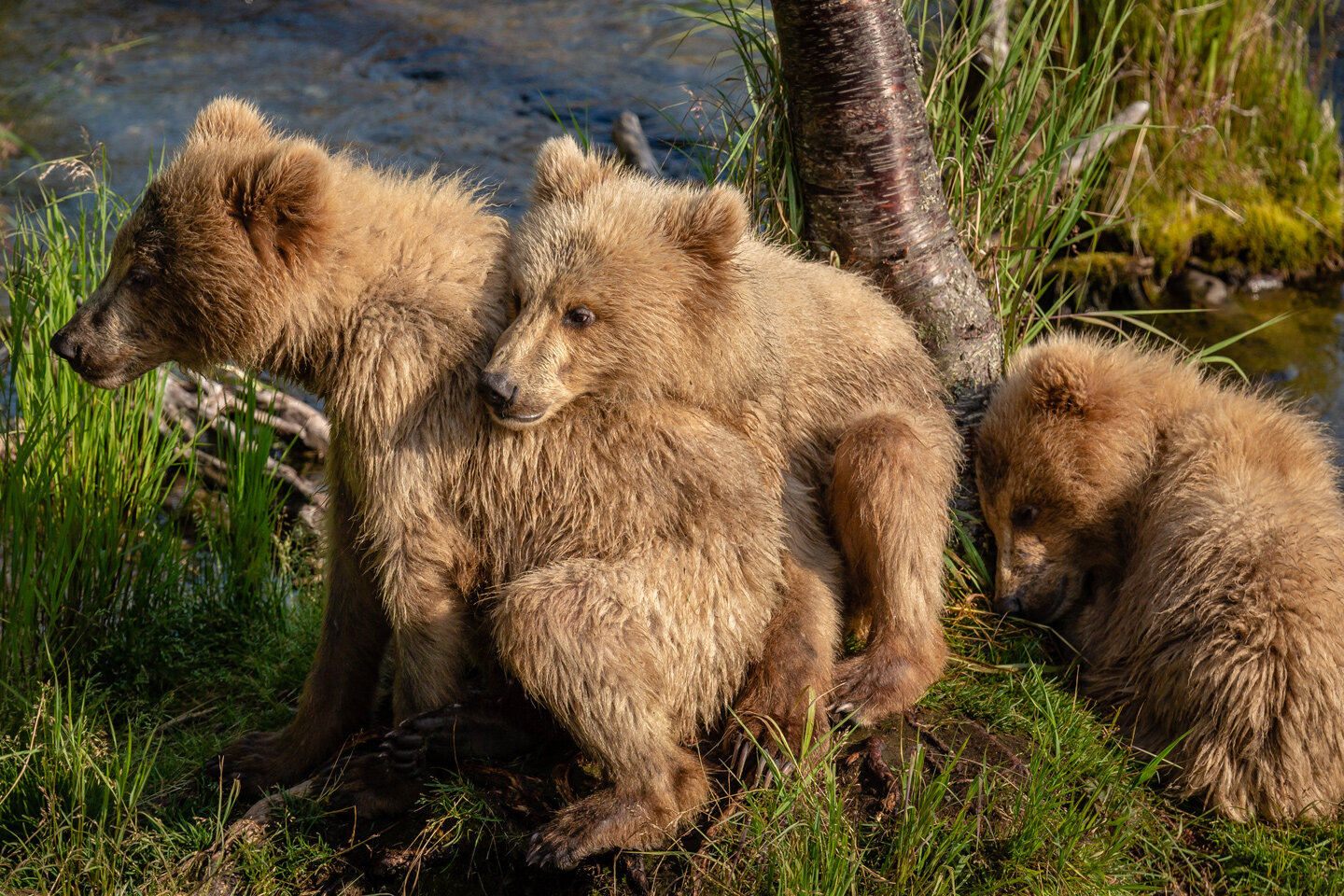
Three yearling brown bear cubs wait alongside Brooks River while their mother fishes for sockeye salmon nearby. The life of a bear cub is perilous, as male bears will attack and kill cubs sired by other males. Taken in Katmai National Park, July 2019. Photo by Ben Blankenship
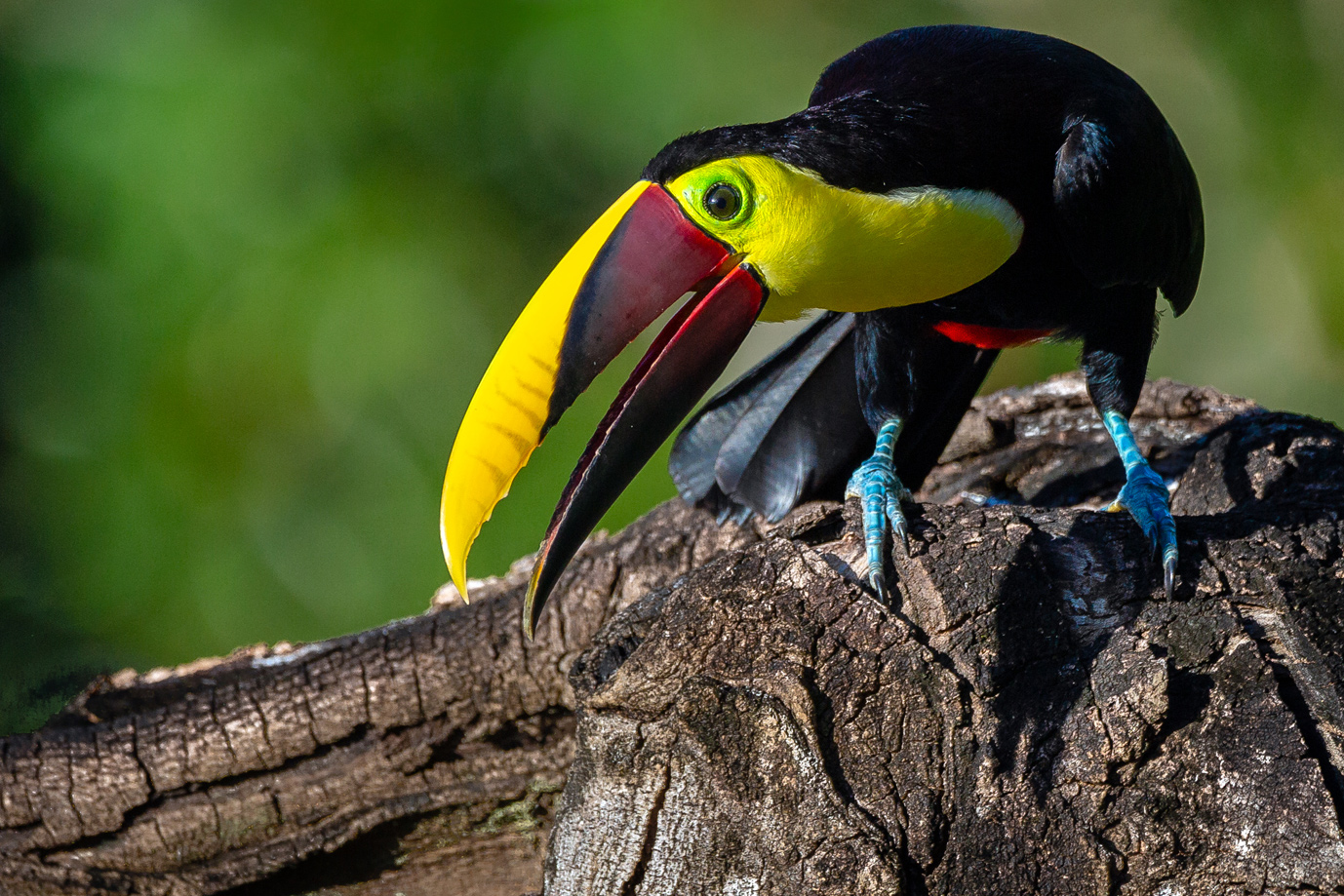
This toucan was all about making a scene on Costa Rica’s Osa Peninsula. Taken in Carate, Costa Rica. December 2018. Photo by Ben Blankenship.

A violet eared hummingbird pokes its perfectly shaped beak into a flower in the cloud forests of Costa Rica’s Talamanca Mountains. Taken in February 2020. Photo by Ben Blankenship/©2020
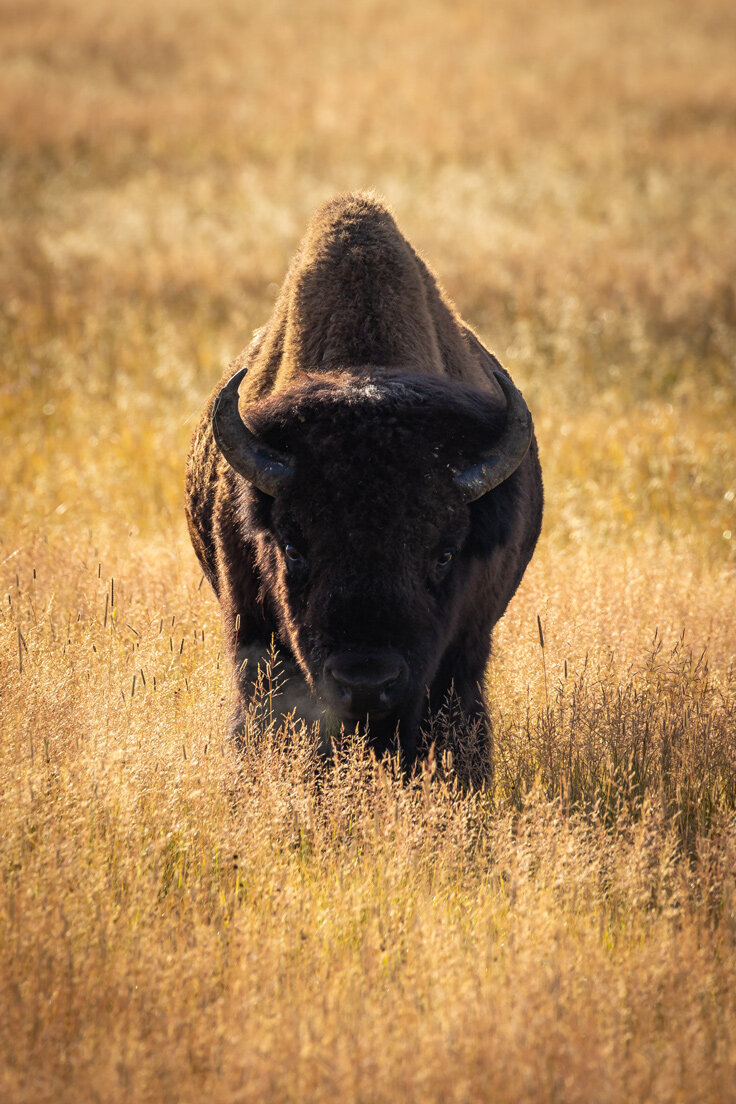
A bull bison grazes amongst golden grasses in Yellowstone National Park. Taken September 2019. Photo by Ben Blankenship.
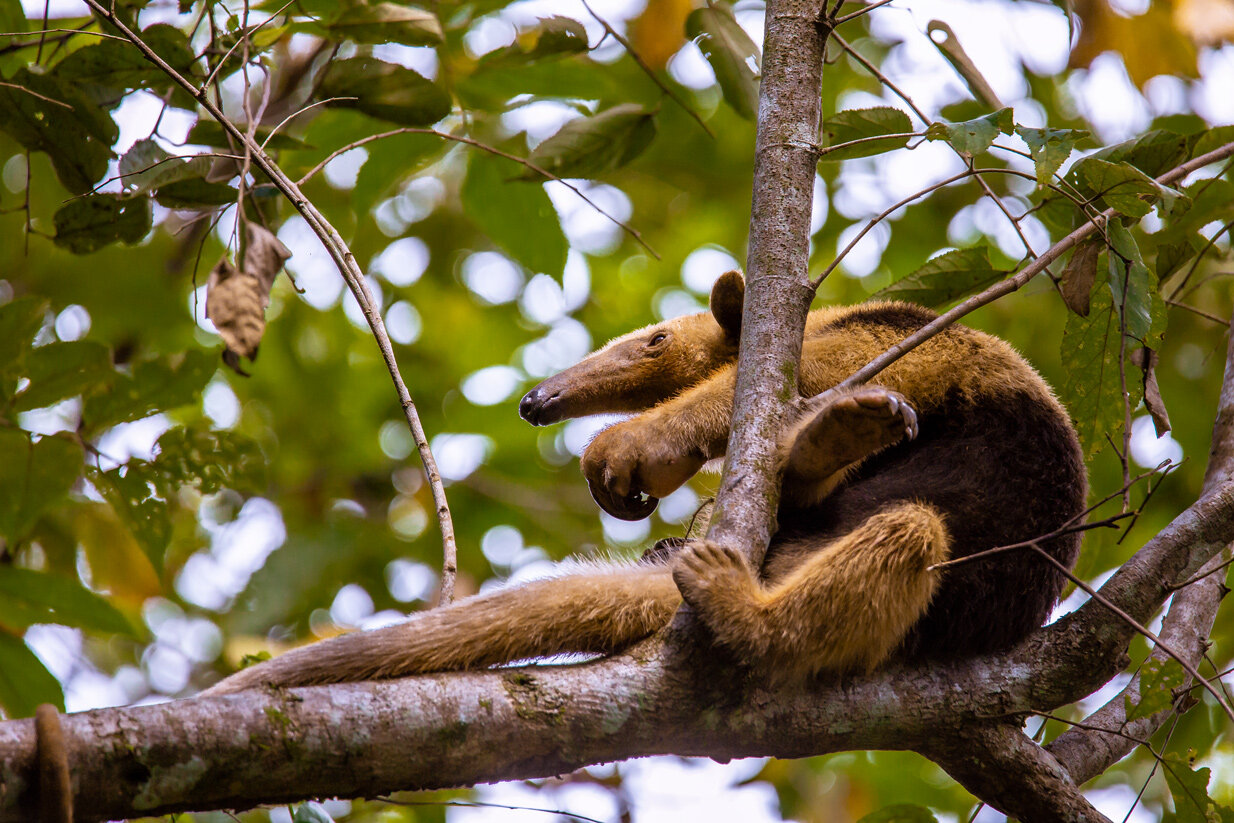
This tamandua was one weird little dude. Usually, their lighter fur is a creamy white. But this guy was chocolate brown. I’m not sure if he was simply very dirty or if he was just a strangely colored little anteater. Taken in Rio Oro, Costa Rica, February 2019. Photo by Ben Blankenship.
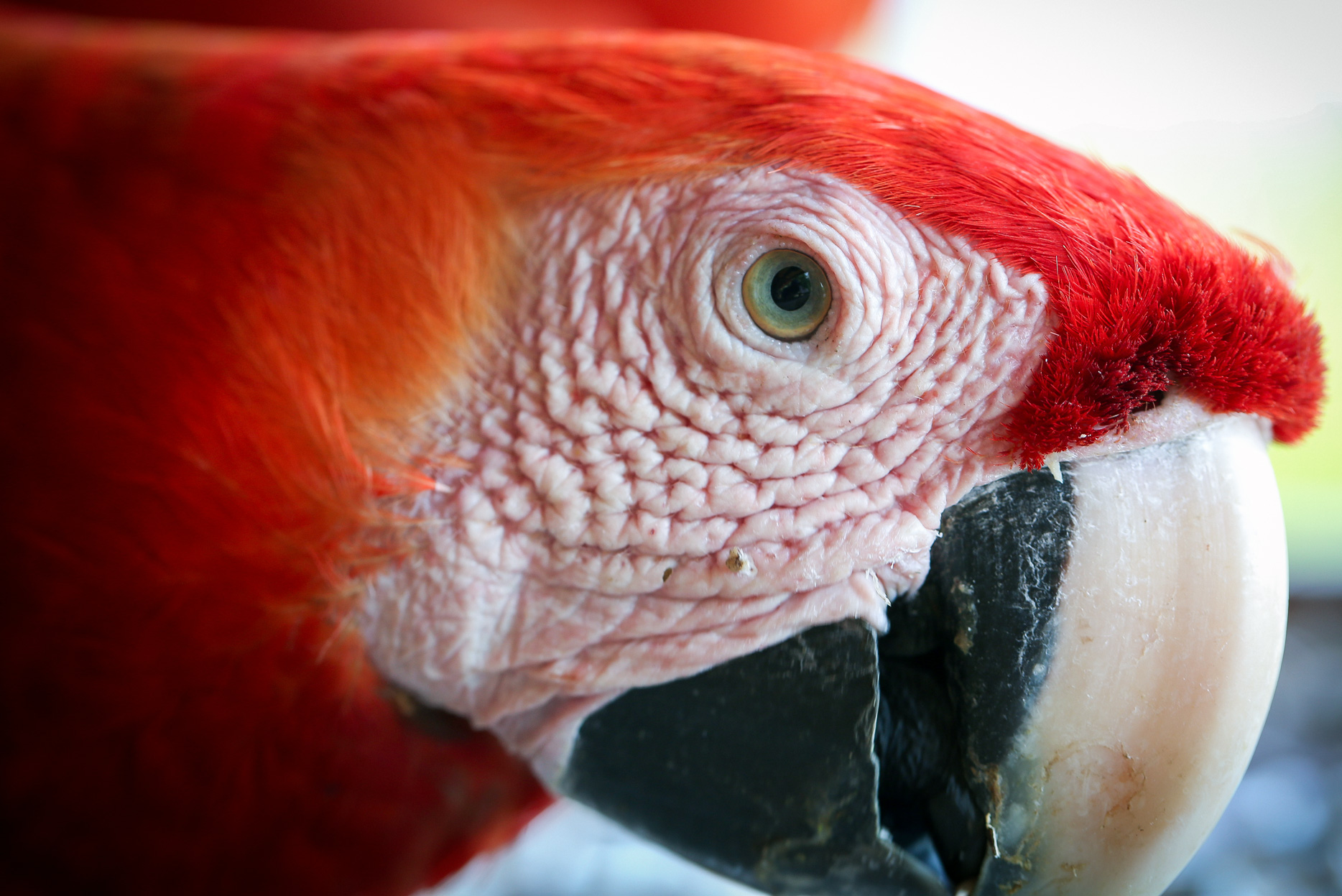
Taken in Carate, Costa Rica. Photo by Ben Blankenship. March 2018.
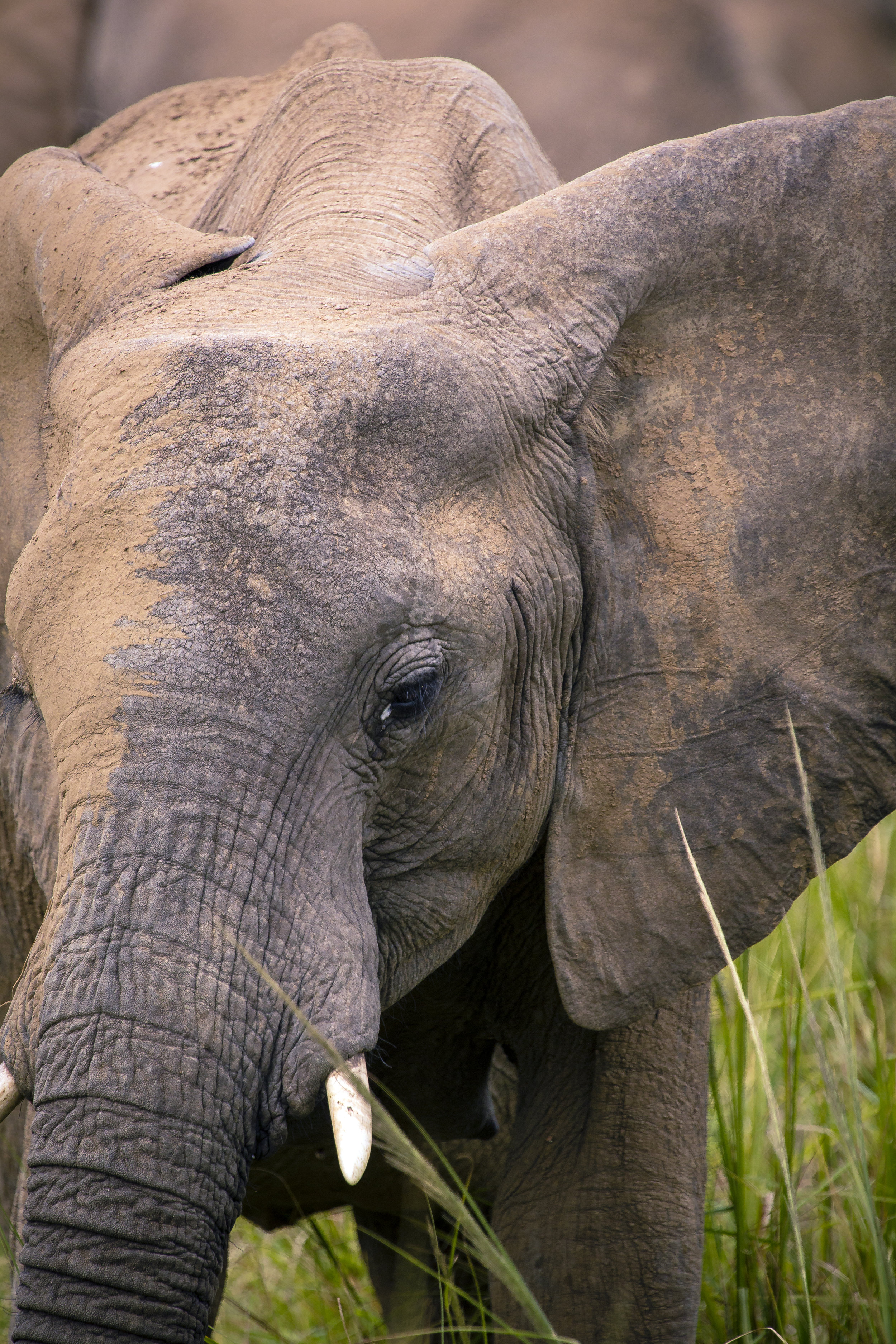
Taken in Murchison Falls National Park, Uganda. July 2018. Photo by Ben Blankenship.

Brooks River, Katmai National Park, Alaska. 2022
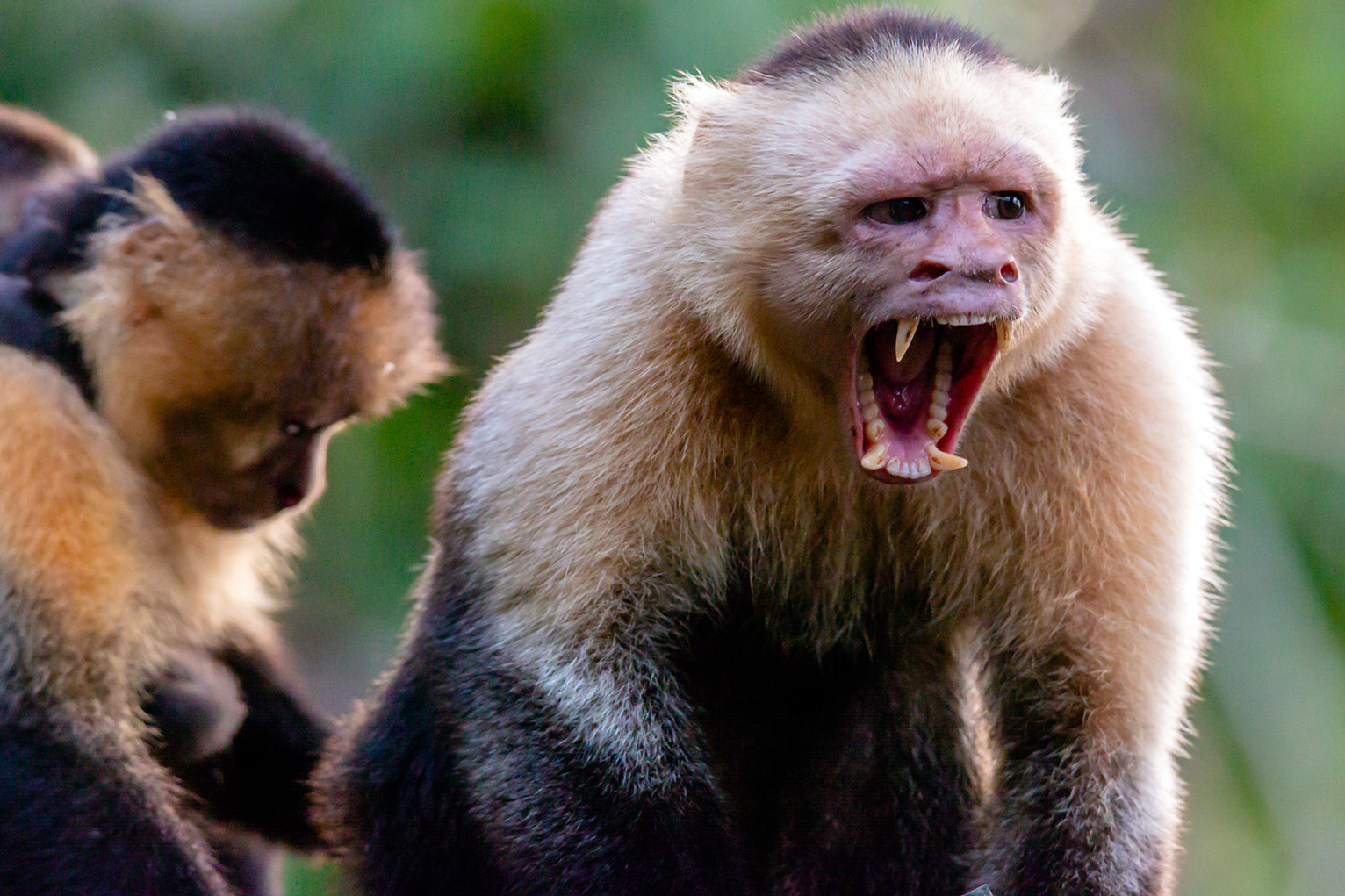
This white faced capuchin reveals his sizable chompers in a threat display. Taken in Carate, Costa Rica. December 2018. Photo by Ben Blankenship
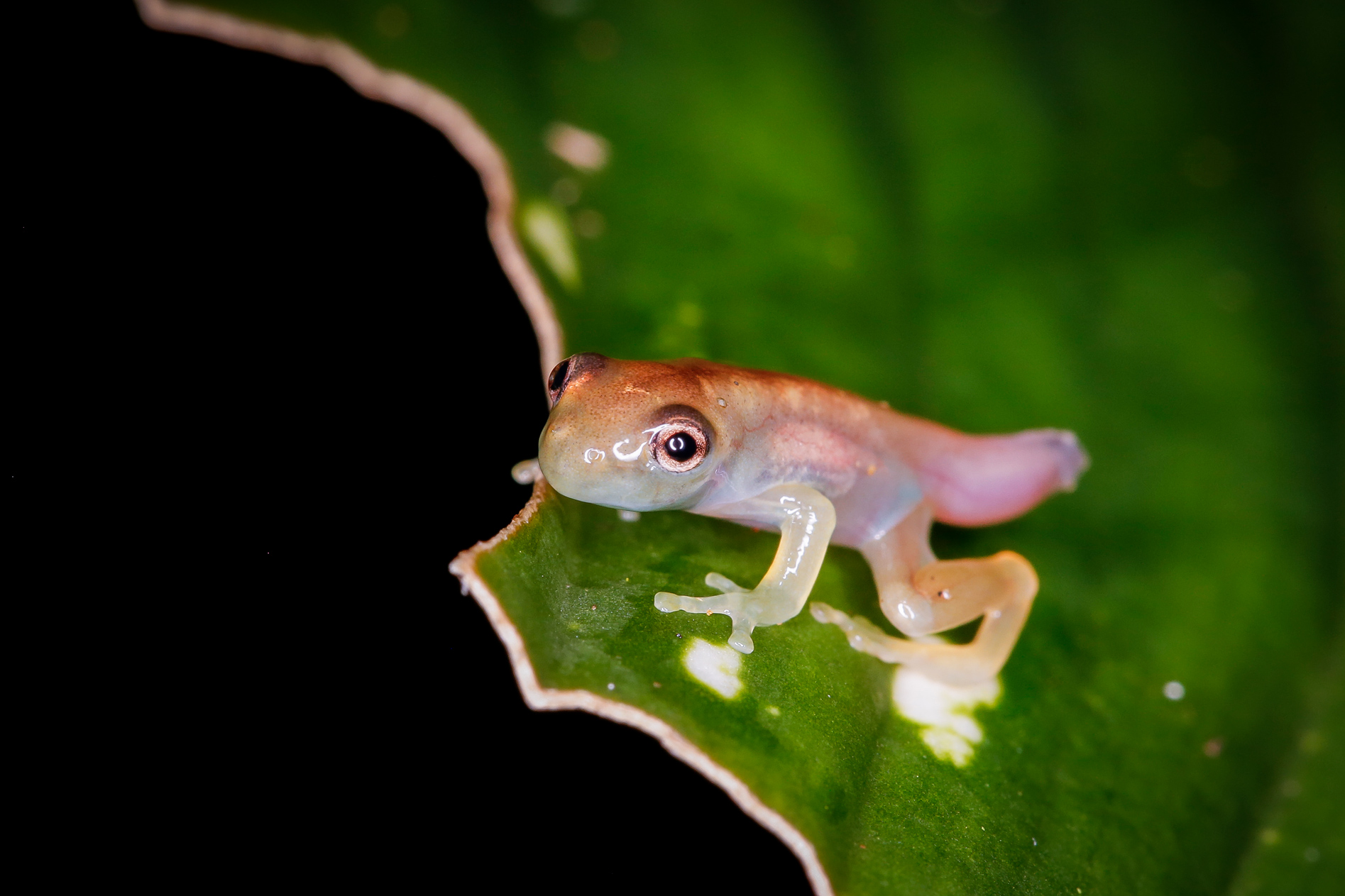
On this juvenile frog, you can see its tadpole tail still nearly completely intact, and its newly formed legs. This individual was observed on a nighttime amphibian and reptile survey conducted by the NGO Frontier in Carate, Costa Rica on the Osa Peninsula. Taken May, 2017. Photo by Ben Blankenship.
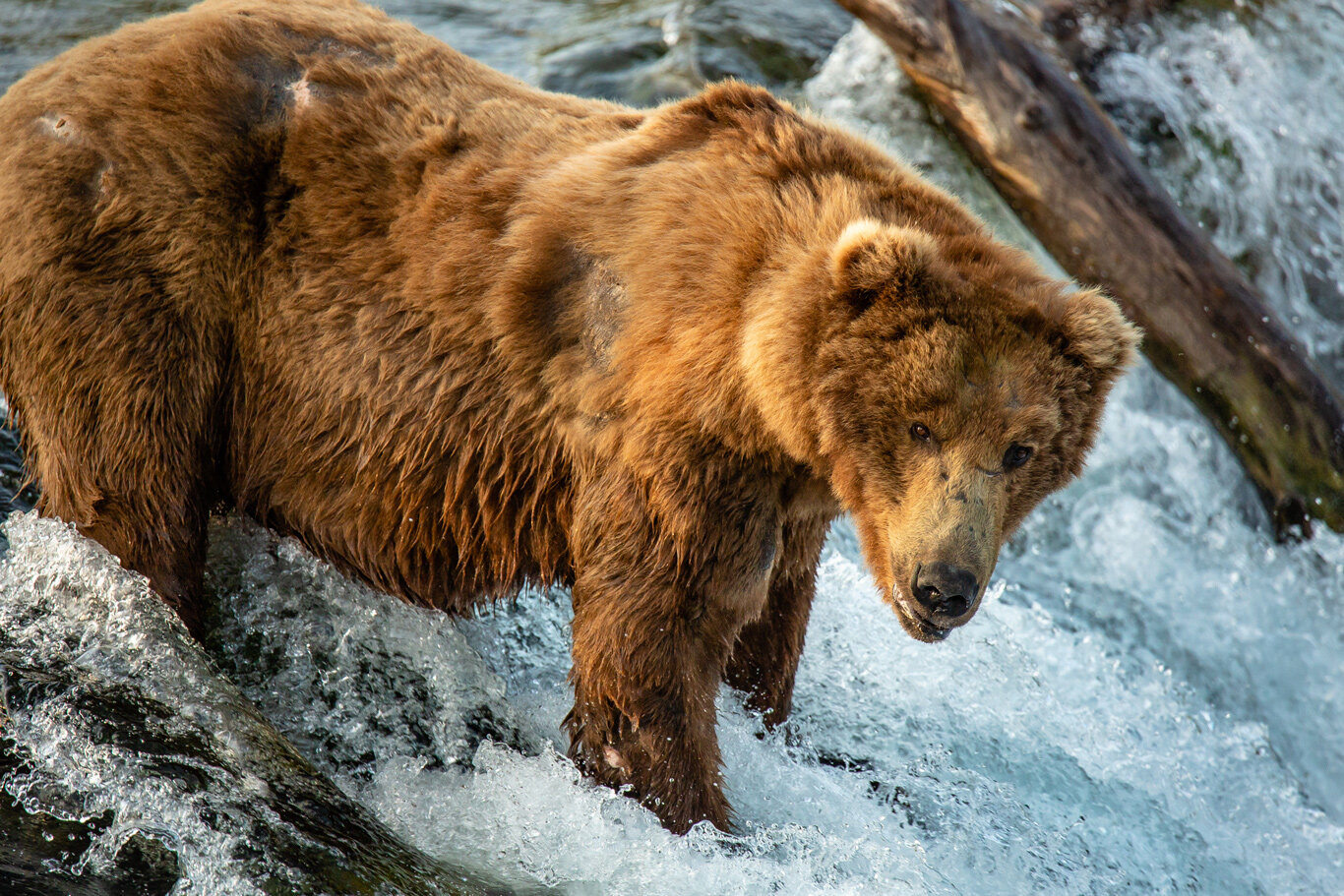
A bear known as Lefty fishes the lip at Brooks Falls in Katmai National Park. Taken in July 2019. Photo by Ben Blankenship.
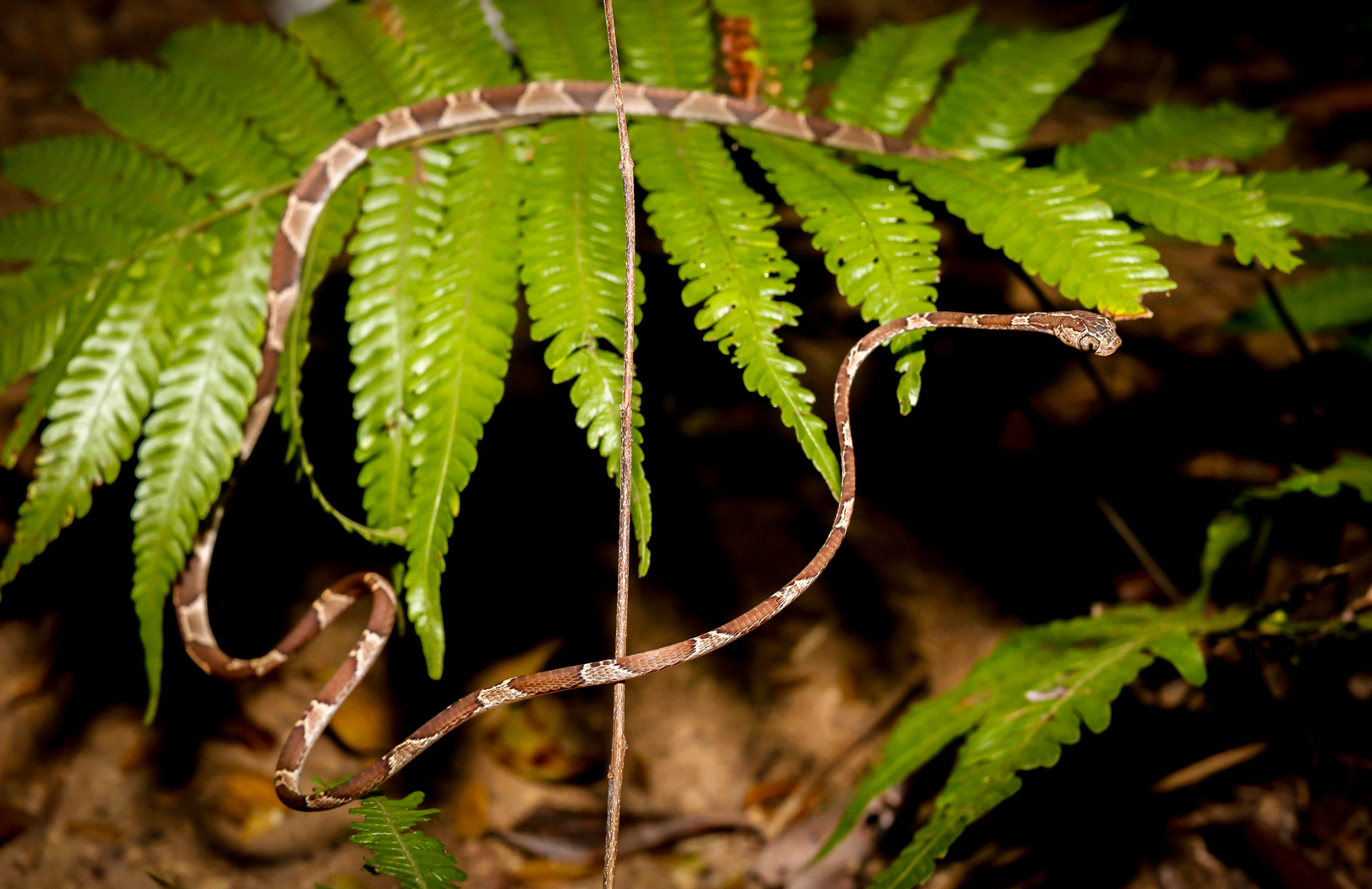
This Brown Blunt Headed Vine Snake was extended out over a trail near Corcovado National Park in Costa Rica. The snake was spotted during a nighttime amphibian and reptile survey being conducted by the conservation NGO Frontier. Taken January 2017. Photo by Ben Blankenship
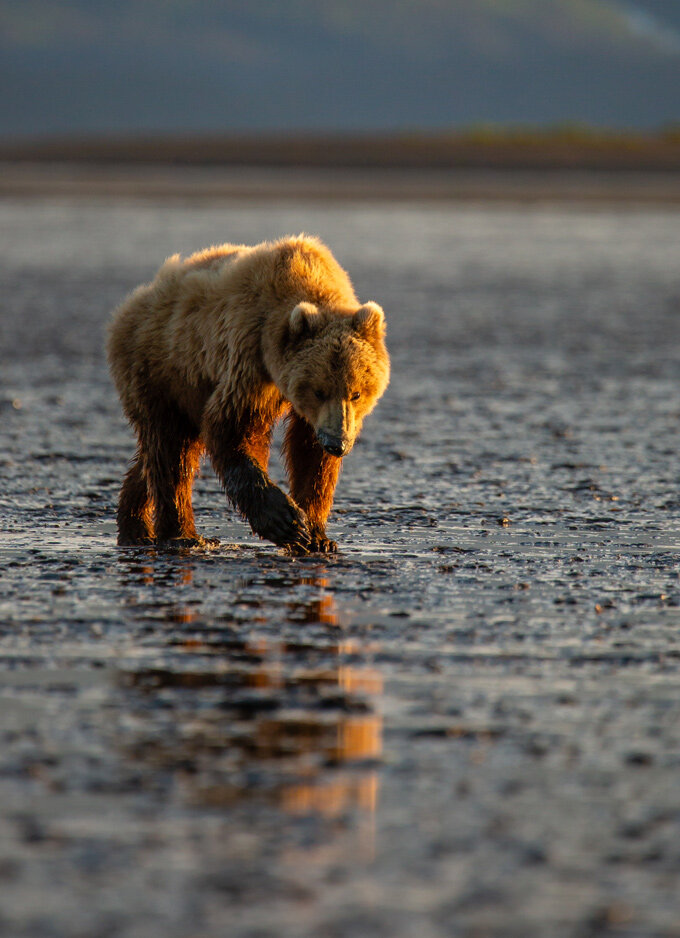
This young brown bear had just emerged from hibernation in Lake Clark National Park. He is skinny and hungry here, and was digging for clams on the mud flats of Chinitna Bay during low tide. Taken in June 2019. Photo by Ben Blankenship.
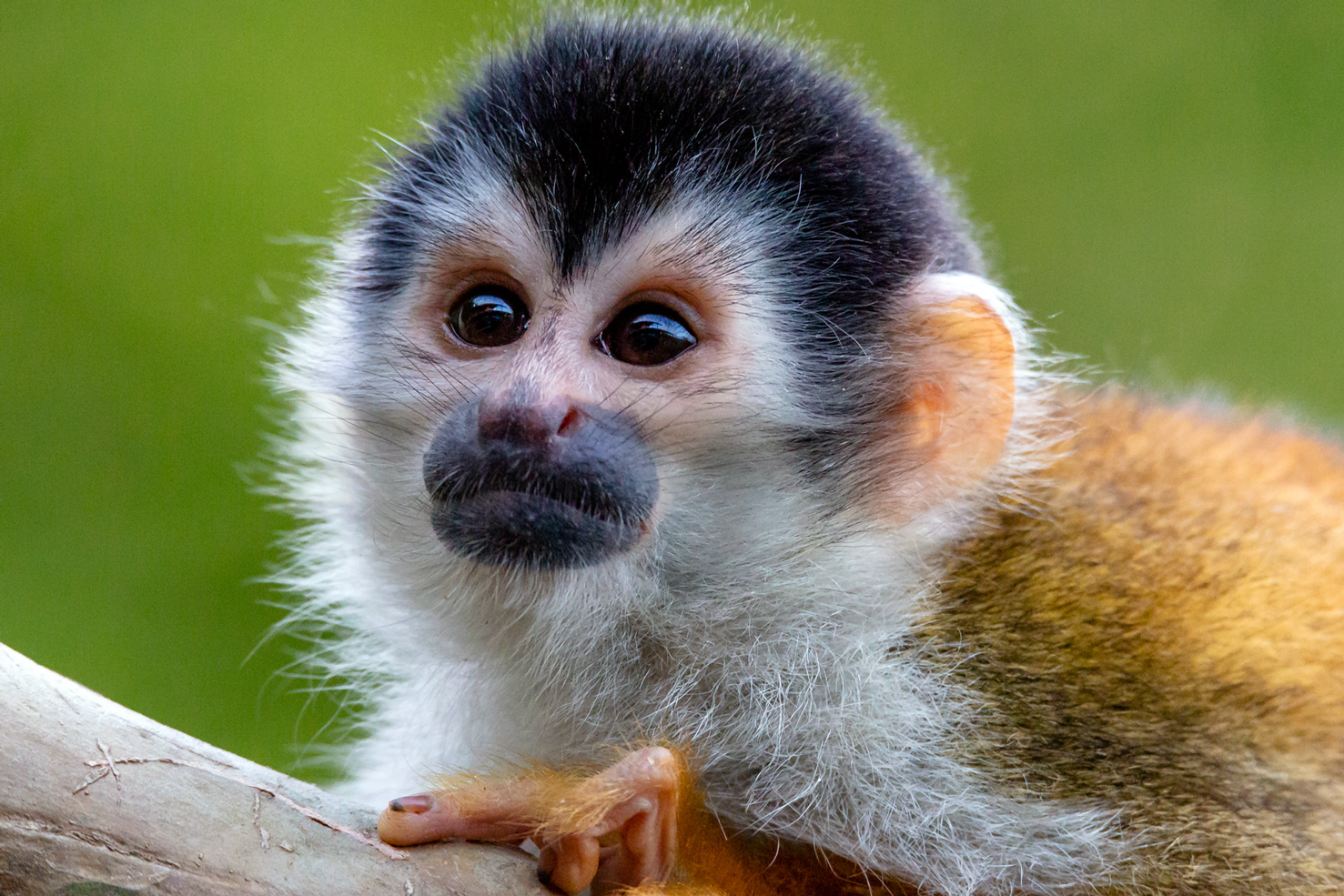
Taken in Carate, Costa Rica. December 2018. Photo by Ben Blankenship
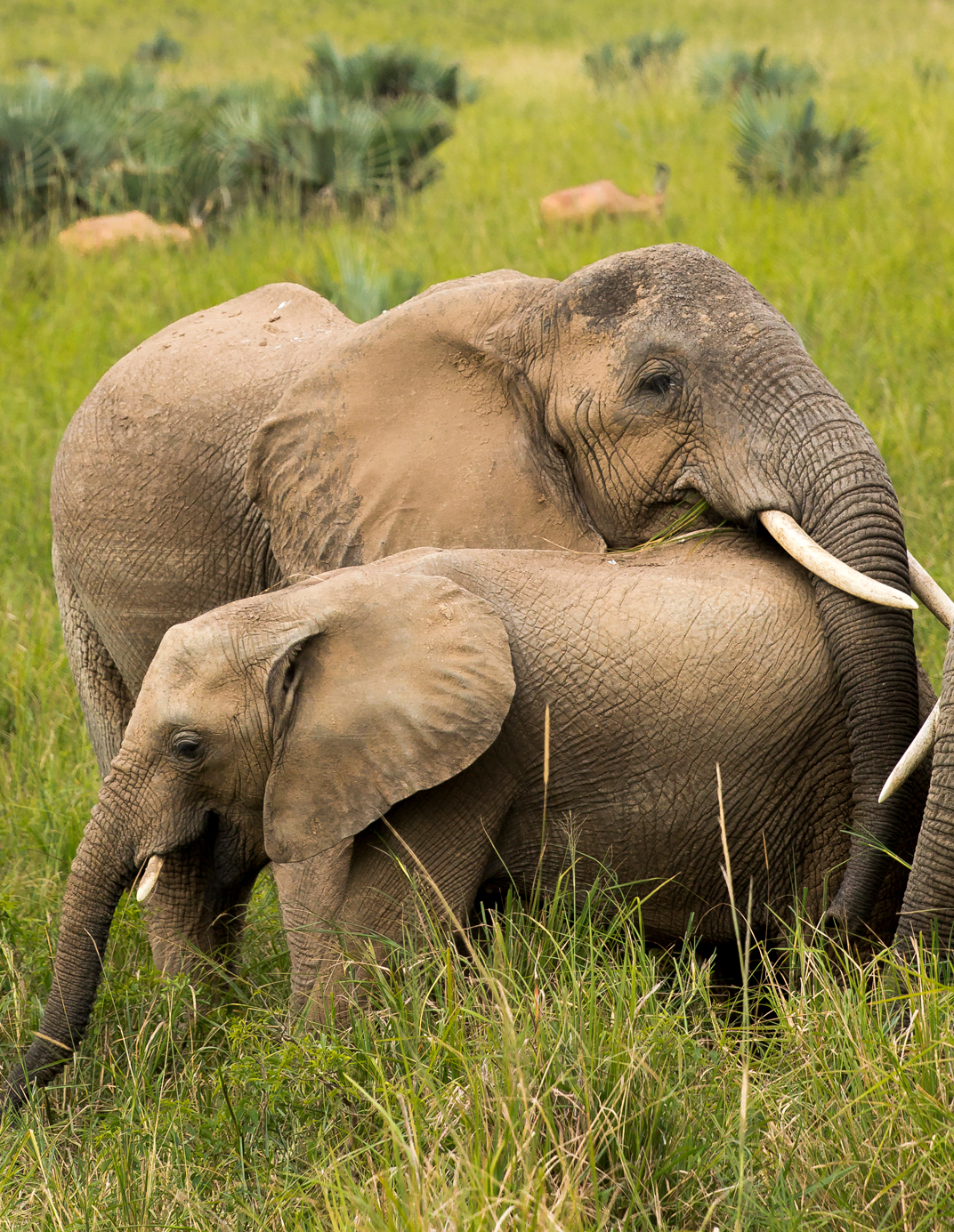
Taken in Murchison Falls National Park, Uganda. July 2018. Photo by Ben Blankenship.
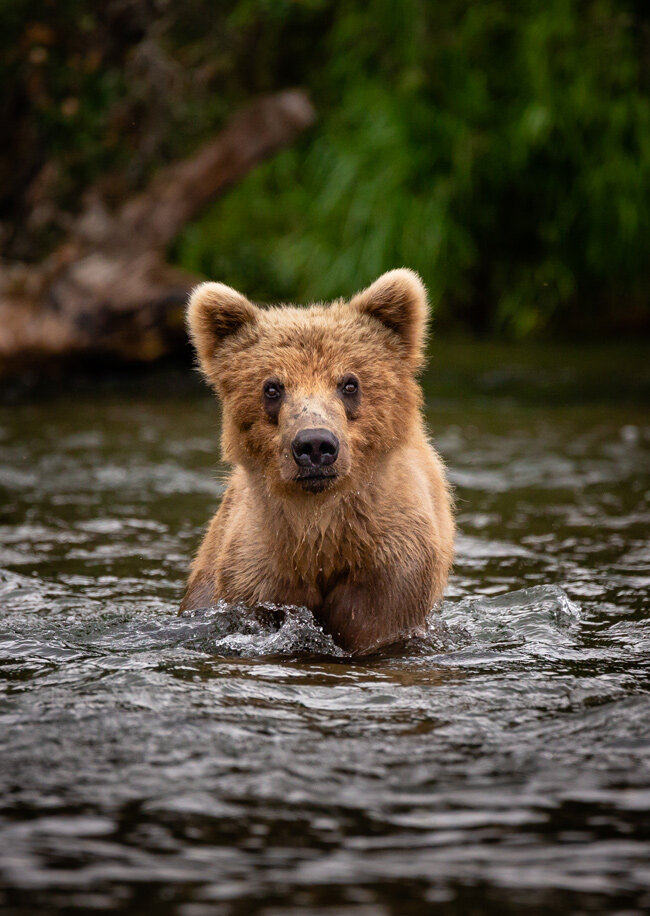
This young brown bear, with her light blonde coat, was quite curious about the humans on this stretch of Brooks River in Katmai National Park. She seemed more comfortable in close proximity to the people who were either fishing or shooting photos. Perhaps because the bigger bears that could pose a risk to her wanted nothing to do with us. Taken in Katmai National Park, July 2019. Photo by Ben Blankenship.

A mother Geoffrey’s spider monkey sits in the tree limbs with her youngster. Taken on the Osa Peninsula of Costa Rica. Taken April 2019. Photo by Ben Blankenship/©2020
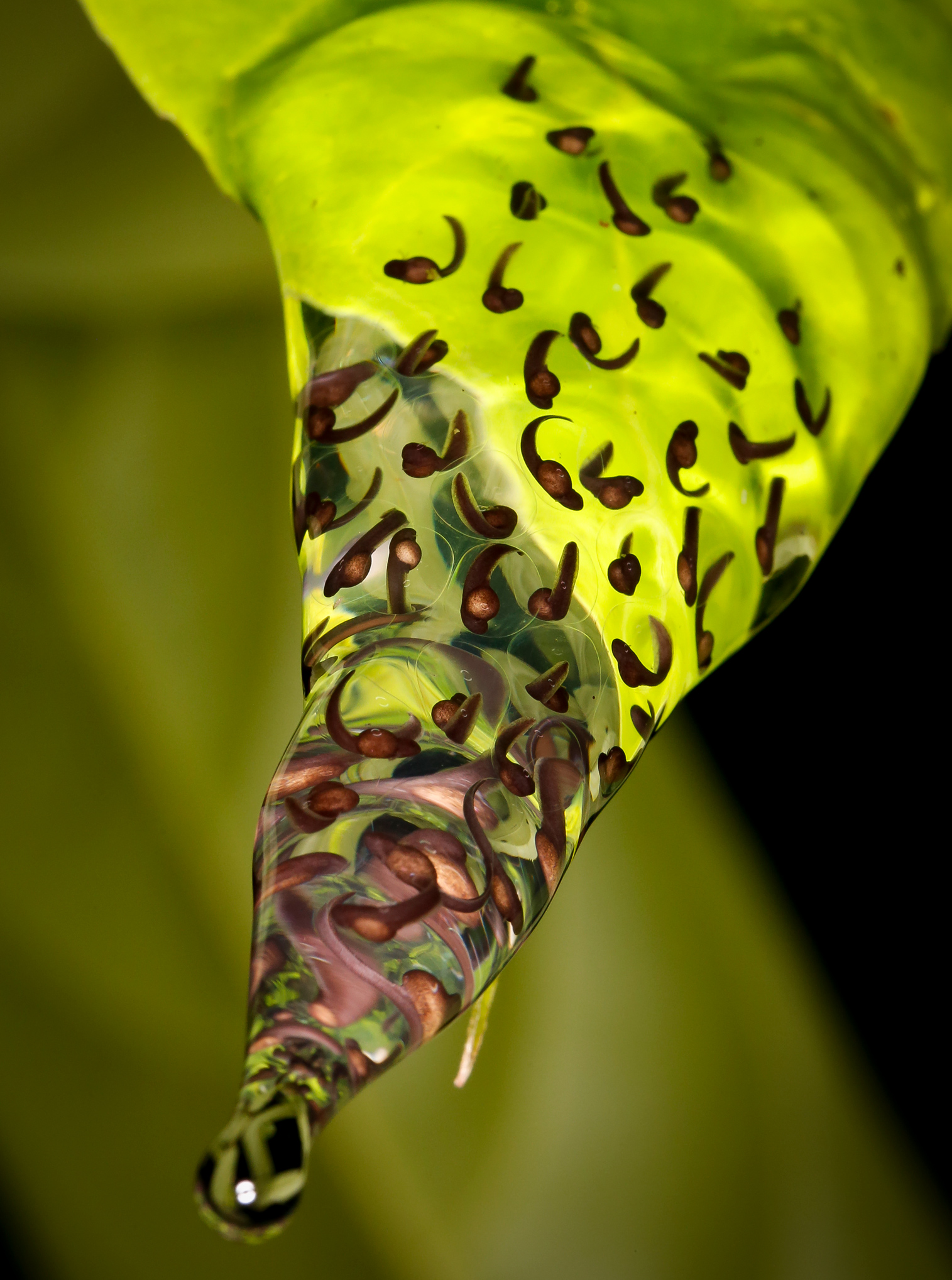
Hanging from a leaf about three meters above a stream, this gelatinous frog's nest was filled with wriggling tadpoles awaiting to be mature enough to emerge from their mucous covered eggs. This was a sight we had been seeking for weeks, and to discover this nest at such a stage of development was a real treat. Observed on a nighttime amphibian and reptile survey conducted by the NGO Frontier in Carate, Costa Rica on the Osa Peninsula. Taken May, 2017. Photo by Ben Blankenship.
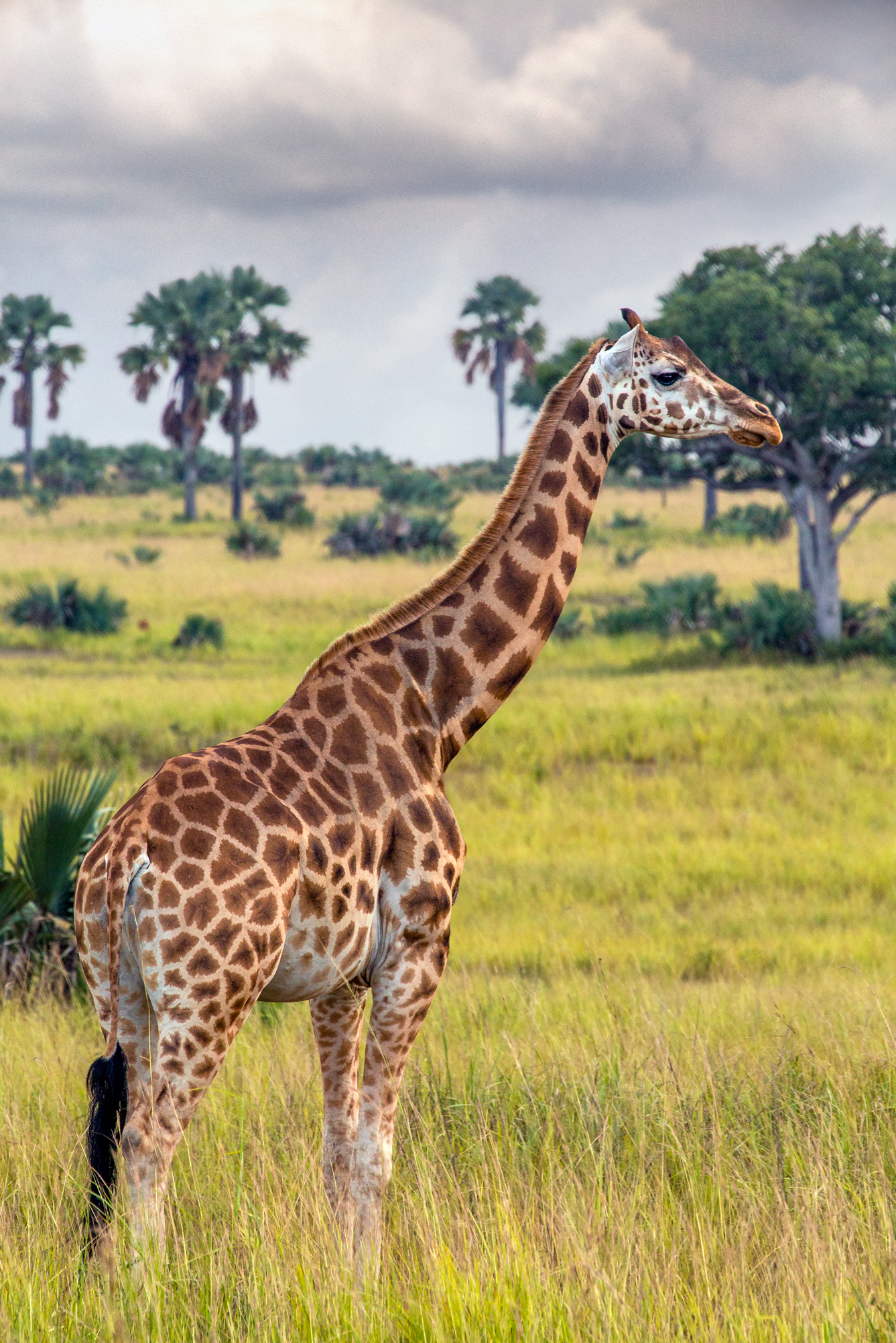
Taken in Murchison Falls National Park, Uganda. July 2018. Photo by Ben Blankenship.
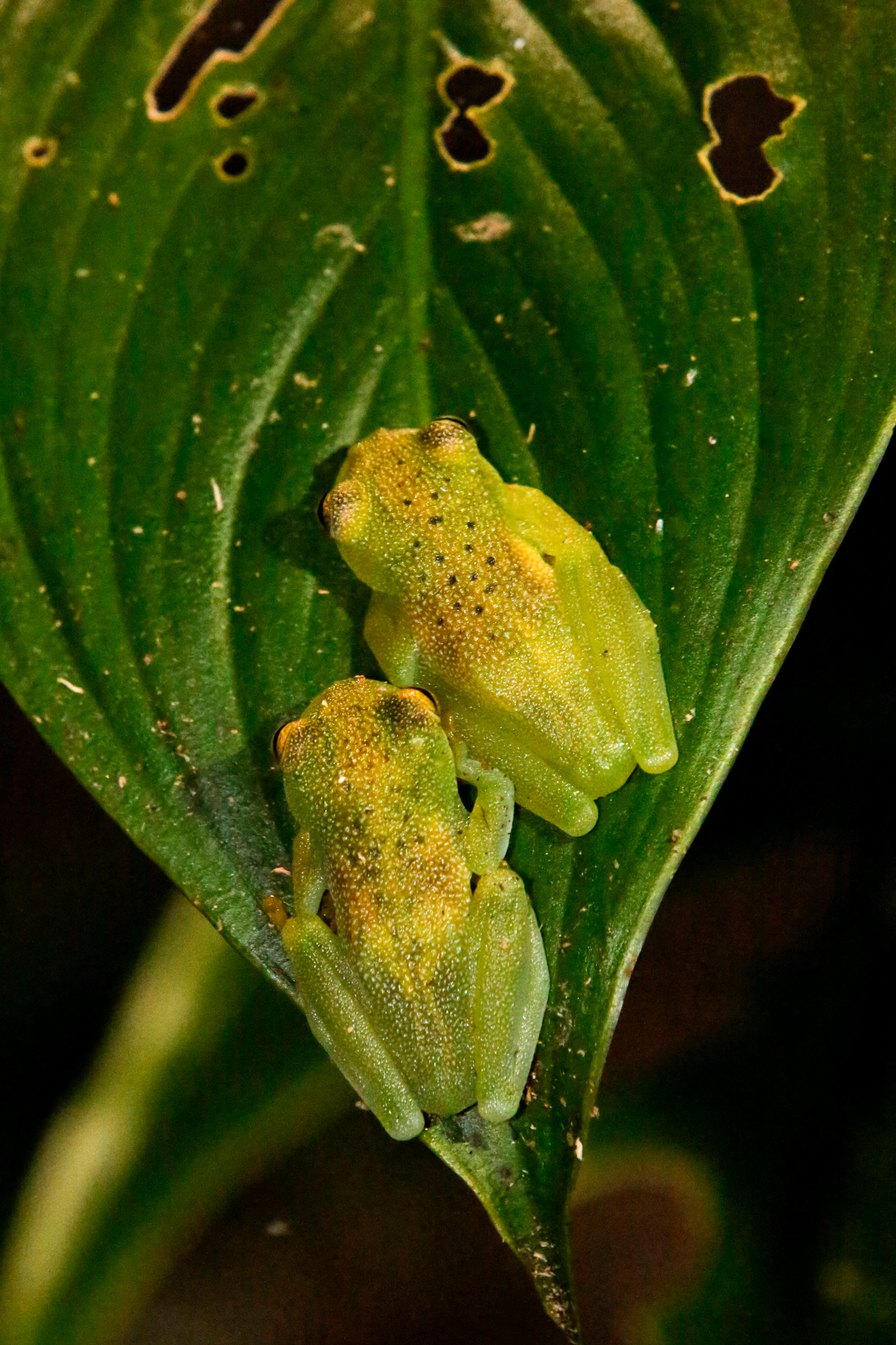
These two granular glass frogs were observed on a nighttime amphibian and reptile survey by the NGO Frontier in Carate, Costa Rica on the Osa Peninsula. Glass frogs get their name from their characteristic translucent skin which allows them to better blend in with whatever surface they are sitting on as a defense mechanism.Taken March, 2017. Photo by Ben Blankenship.
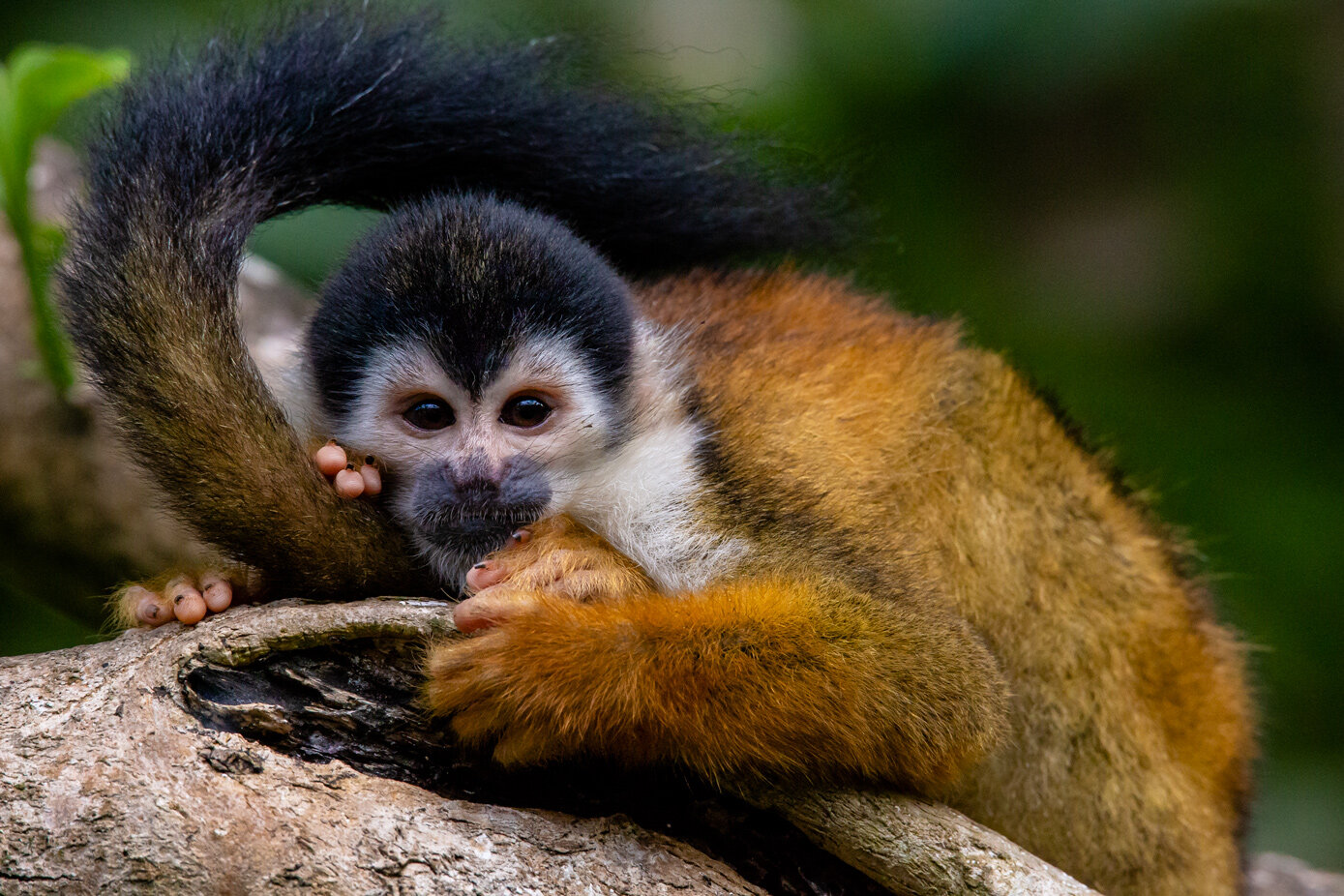
The Central American squirrel monkey, known in Costa Rica as El Mono Titi, is one of my favorites for its beautiful expressive eyes. This curious monkey was oscillating between napping and gazing into my lens in Carate, Costa Rica. Taken in February 2019. Photo by Ben Blankenship.
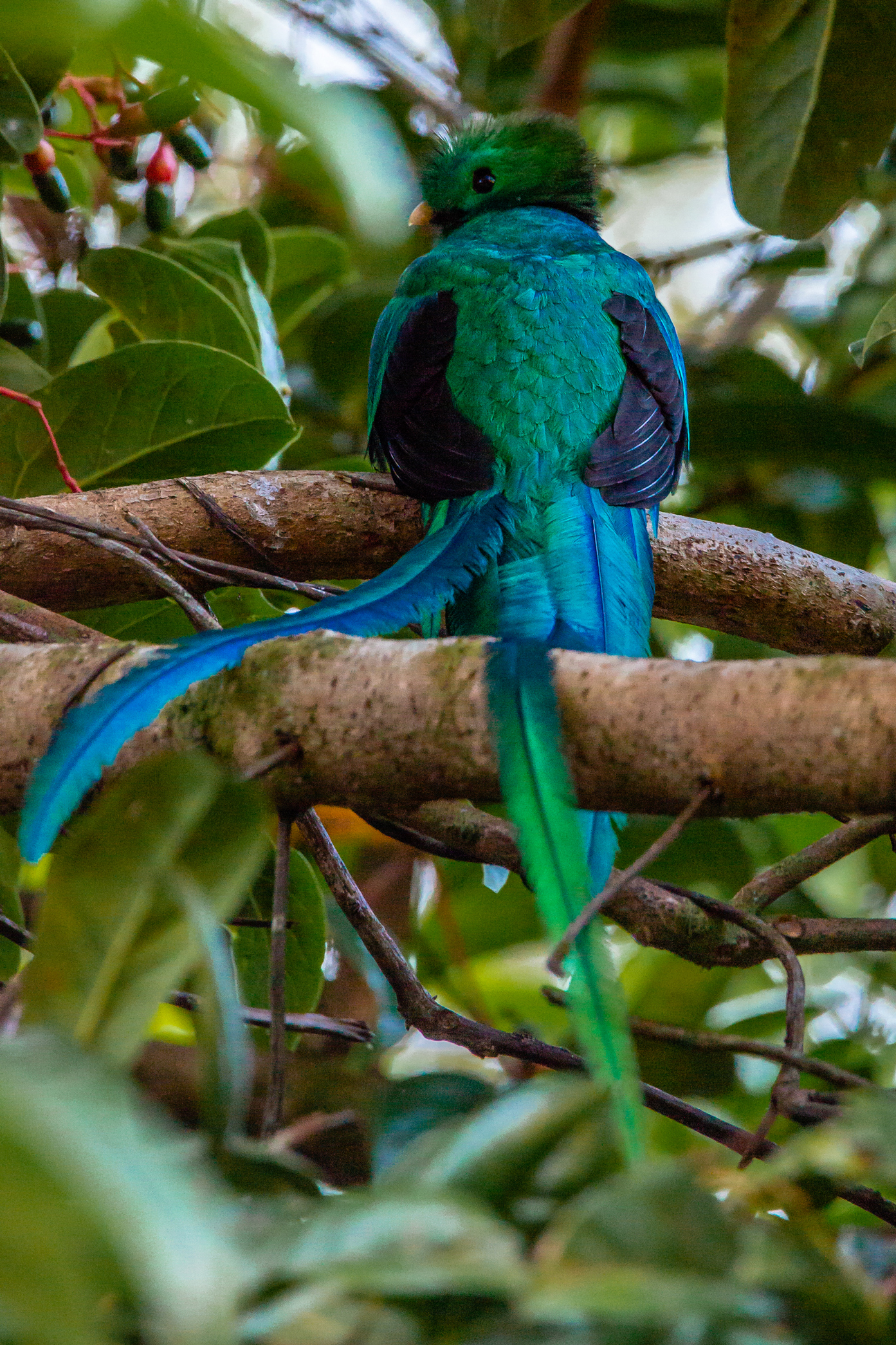
This male resplendent quetzal, one of the most famous of Central American birds, sits here in an avocado tree waiting for his mate to arrive. These magnificent birds adorn flags, have national currencies named after them (Guatemala), and are the subject of ancient folklore, dating back to pre-Colombian era Central America. This photo was taken in San Gerardo de Dota, Costa Rica, February 2019. Photo by Ben Blankenship.
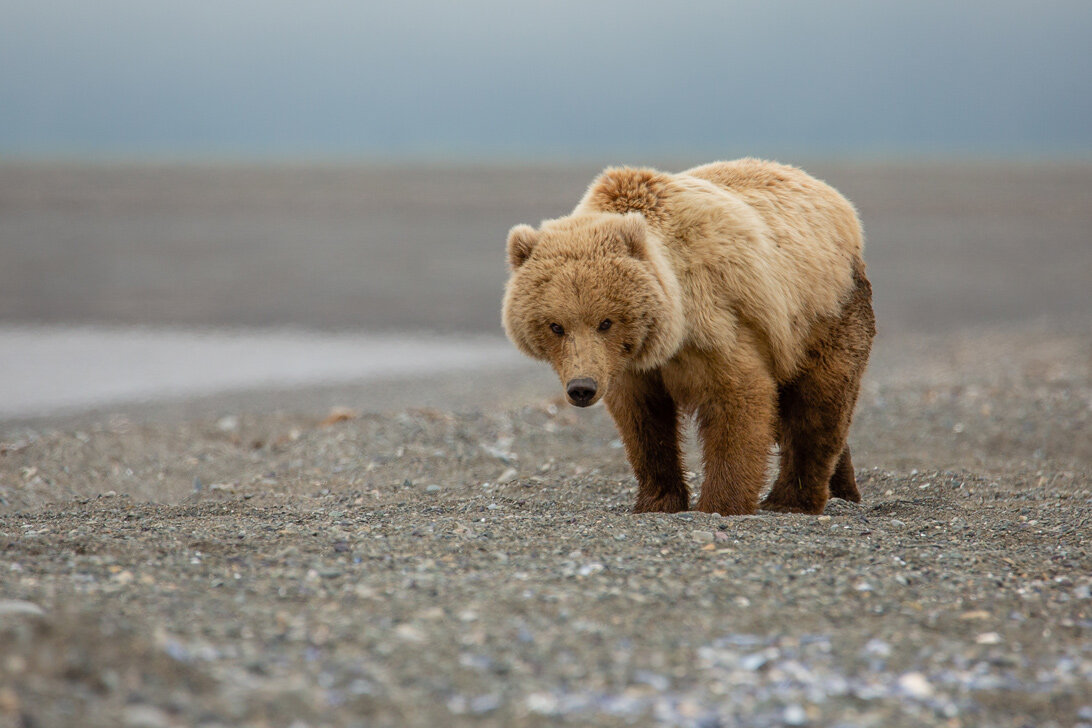
This beautiful little female bear earned the nickname Limpy due to a wound suffered to her rear left leg, most likely caused by another brown bear. Taken in Lake Clark National Park, June 2019. Photo by Ben Blankenship.
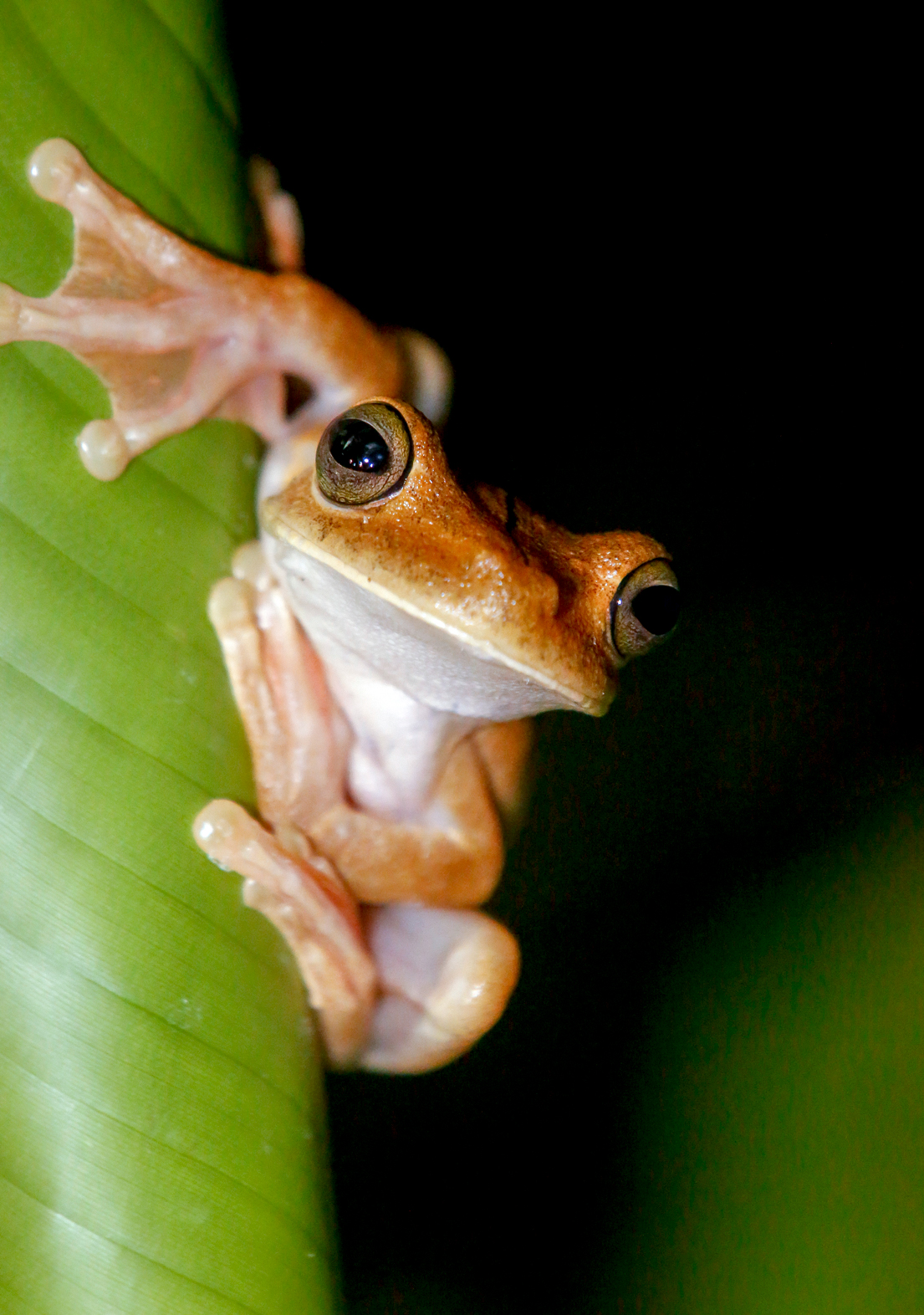
A Gladiator Tree Frog observed during a nighttime Amphibian and Reptile survey conducted by the NGO Frontier in Carate, Costa Rica on the Osa Peninsula. Photo by Ben Blankenship.

Lake Clark NP, Alaska. June 2021. Photo by Ben Blankenship.
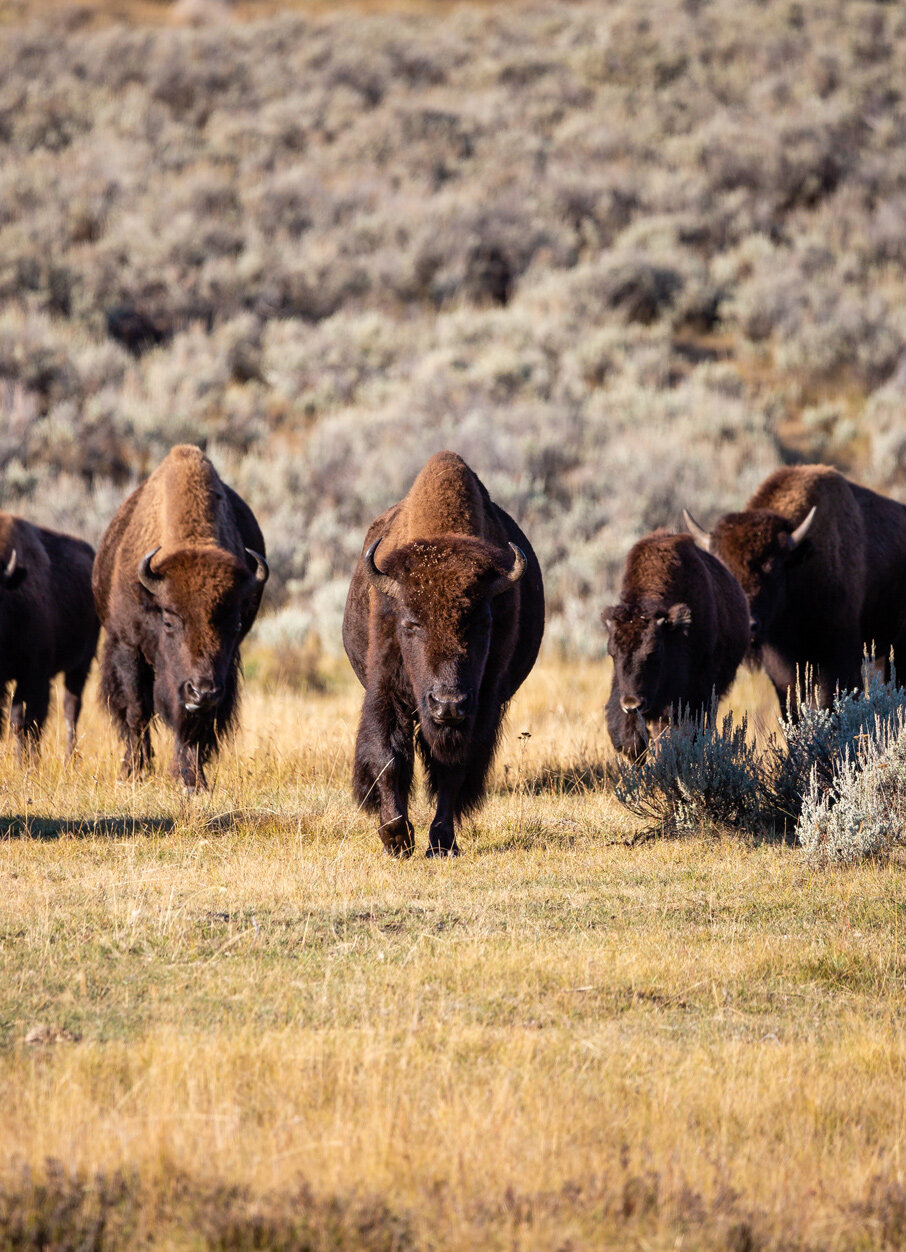
A small group of females and calves approach during the fall in Yellowstone National Park. Taken in September 2019. Photo by Ben Blankenship.

A violet eared hummingbird’s iridescent plumage gleams in the soft light of the cloud forest. Taken in San Gerardo de Dota, Costa Rica. February 2020. Photo by Ben Blankenship/©2020
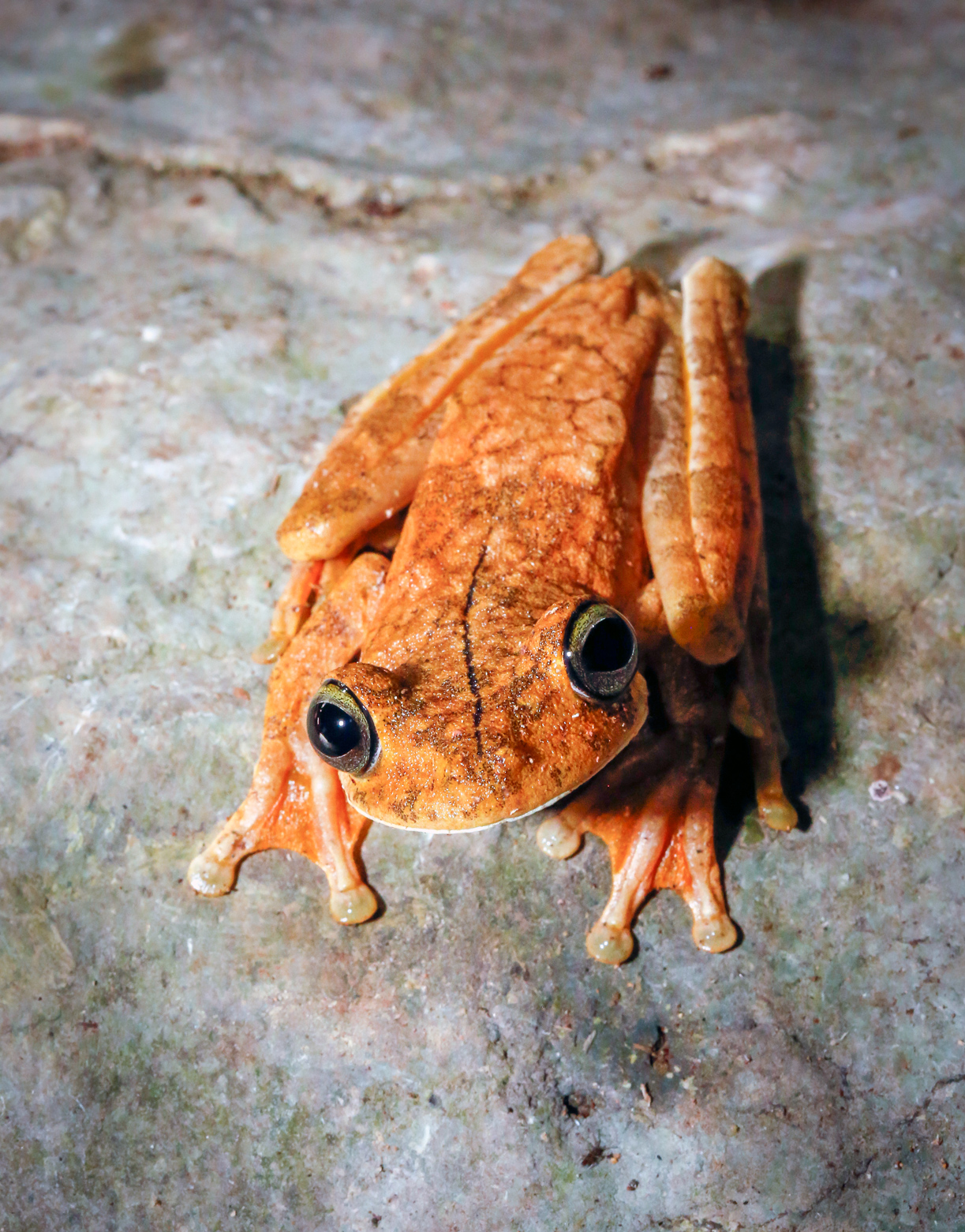
This gladiator tree frog took a special interest in my camera flash, staring straight into the camera lens for its portrait. The gladiator tree frog gets its name from the male's characteristic barbs on its hind legs which it uses to battle other males for mating rights with females. Battles are sometimes to the death. It was observed on a nighttime amphibian and reptile survey by the NGO Frontier in Carate, Costa Rica on the Osa Peninsula. Taken March, 2017. Photo by Ben Blankenship.
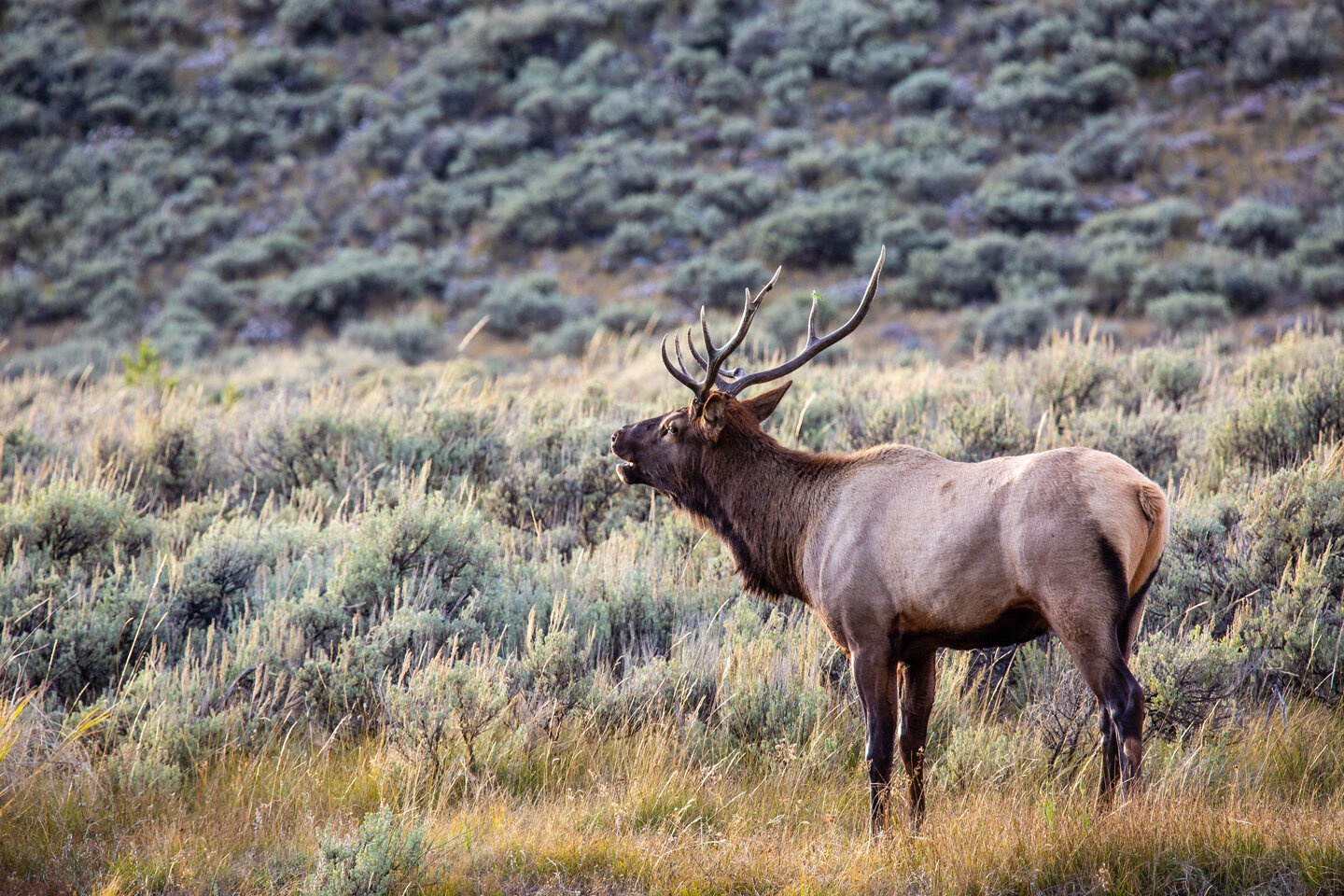
Taken in Yellowstone National Park, September 2019. Photo by Ben Blankenship.
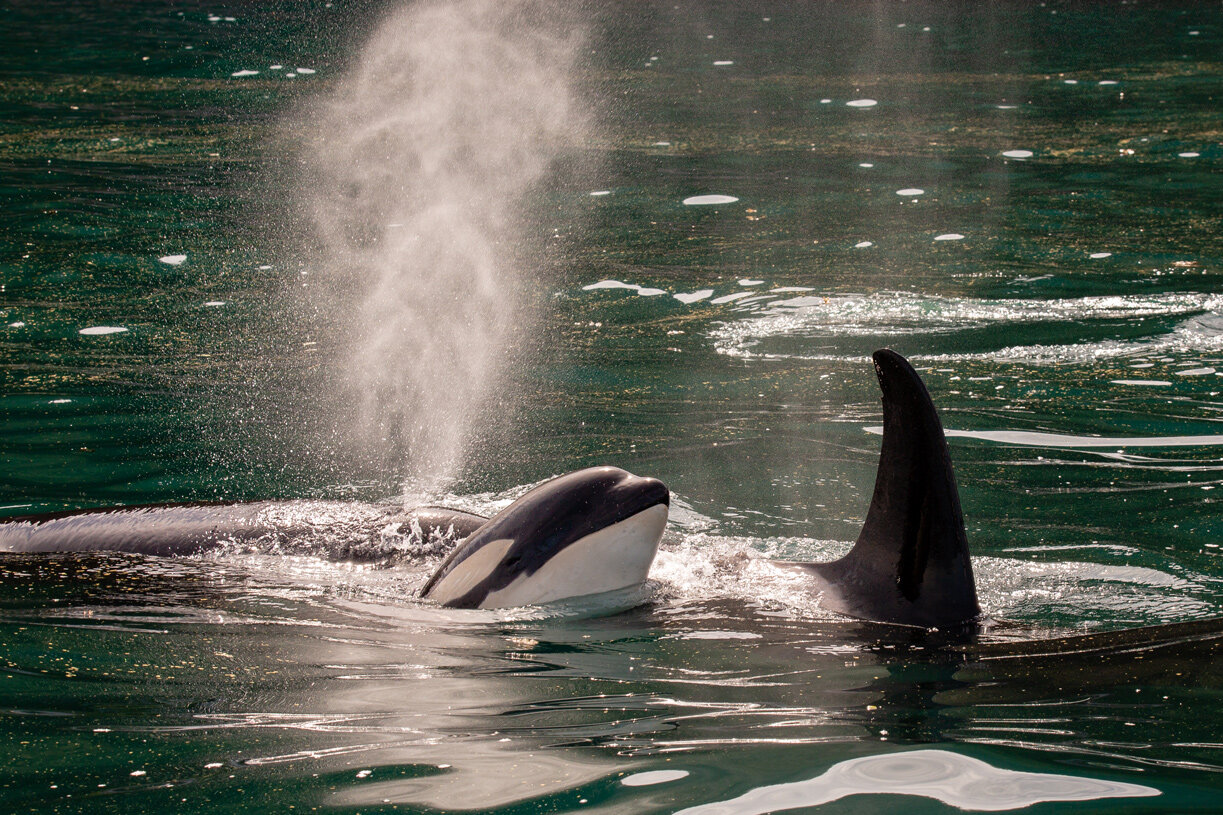
This resident pod of orcas live in and around Kenai Fjords National Park, Alaska. This young female spy hopped frequently to check out the boat of photographers floating nearby. Taken in June 2019. Photo by Ben Blankenship.

Lake Clark NP, Alaska. June 2021. Photo by Ben Blankenship.

A dominant Alaskan brown bear, known as Otis, fishes below Brooks Falls in Katmai National Park, Alaska. Taken July 2019. Photo by Ben Blankenship/©2020
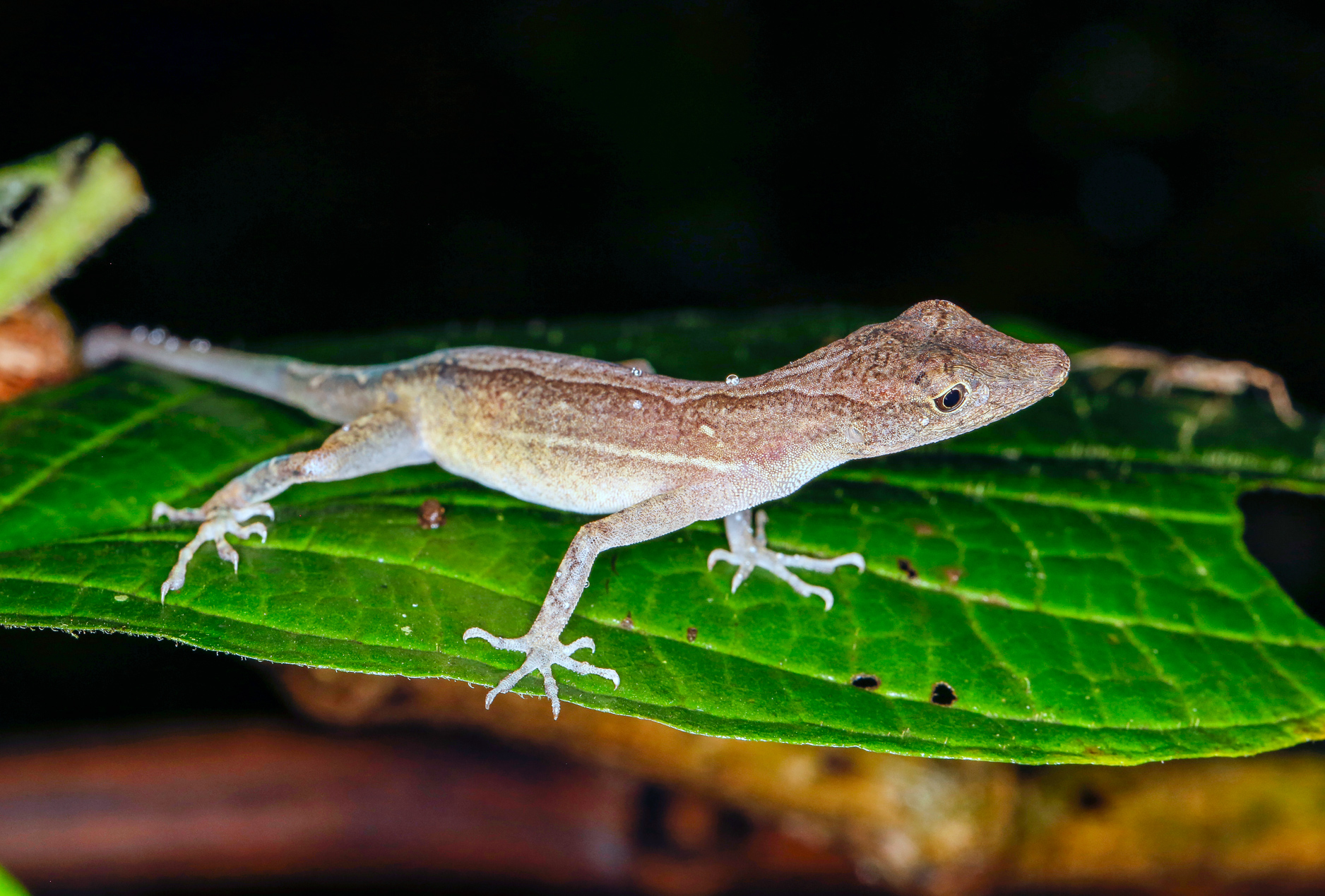
This female Golfo Dulce anole was observed on a nighttime amphibian and reptile survey conducted by the NGO Frontier in Carate, Costa Rica on the Osa Peninsula. The Golfo Dulce anole gets its name from El Golfo Dulce, the gulf that separates the Osa Peninsula from mainland Costa Rica.Taken March, 2017. Photo by Ben Blankenship.
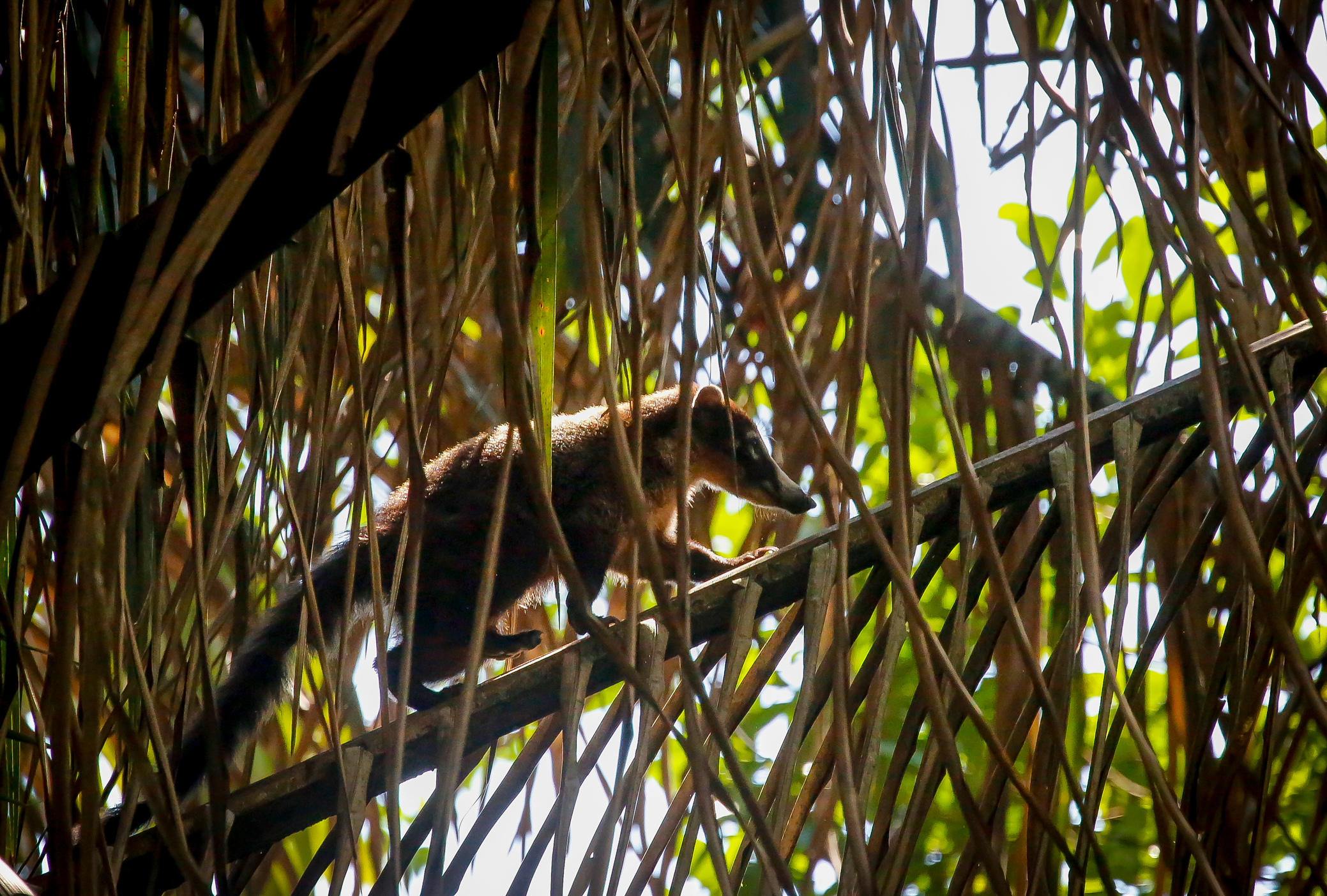
This white nosed coati was part of a troupe of around 16 individual animals that were making their way through the canopy just above the NGO Frontier's jungle camp around sunset. Taken February, 2017. Photo by Ben Blankenship.
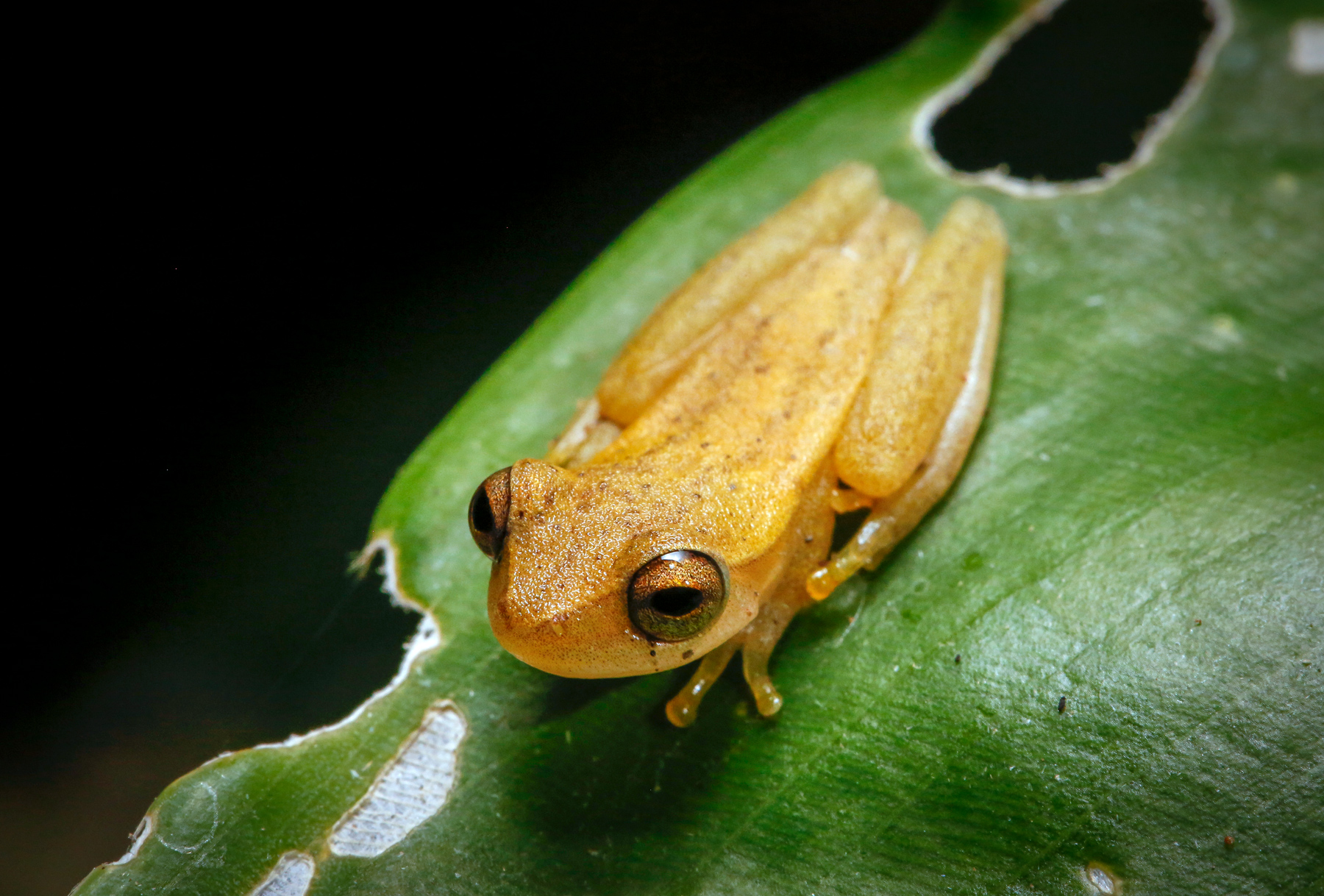
This small headed tree frog was observed on a nighttime amphibian and reptile survey by the NGO Frontier in Carate, Costa Rica on the Osa Peninsula. Taken March, 2017. Photo by Ben Blankenship.
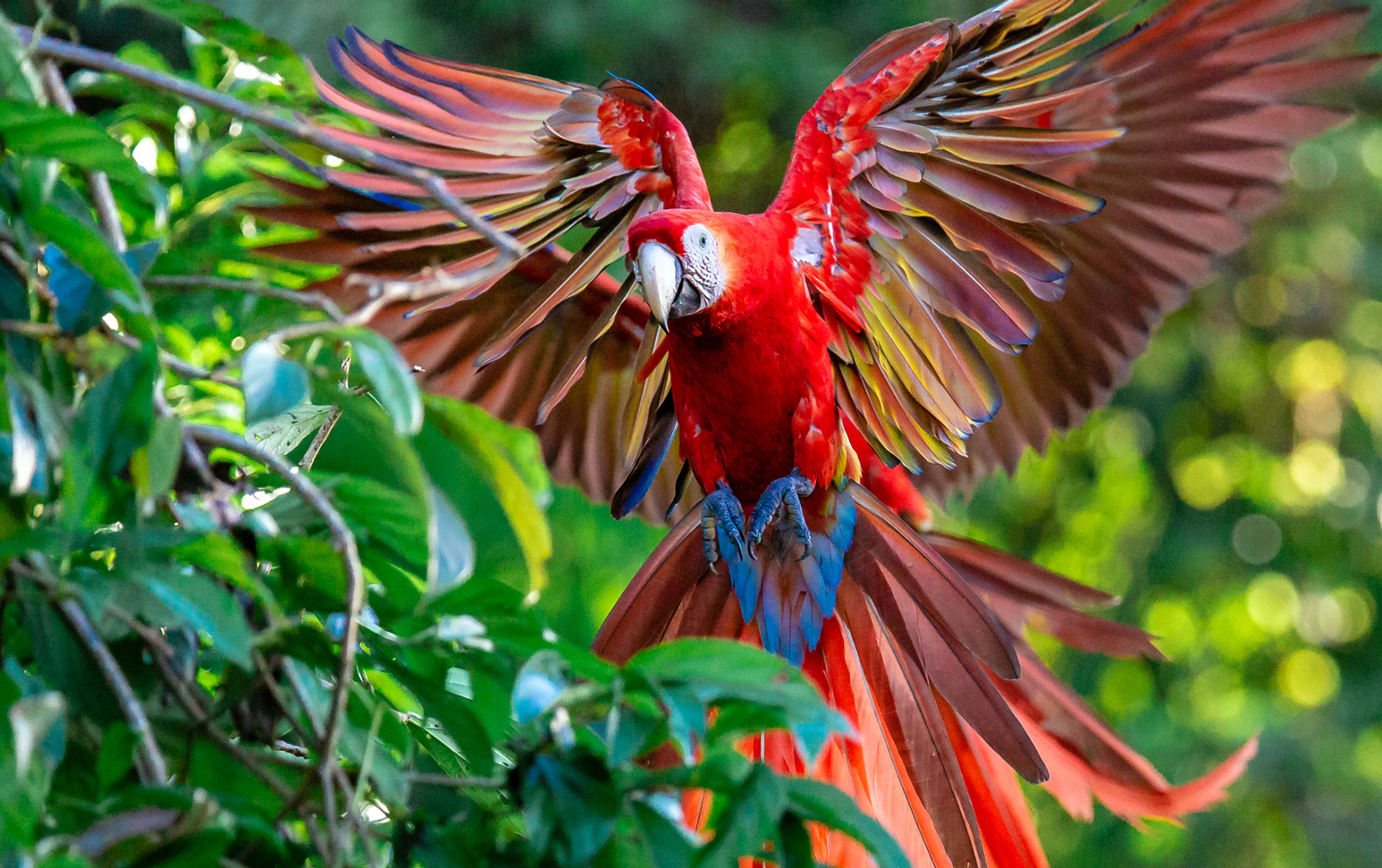
A scarlet macaw lands gracefully in the treetops on Costa Rica’s Osa Peninsula. Taken in Carate, Costa Rica. December 2018. Photo by Ben Blankenship
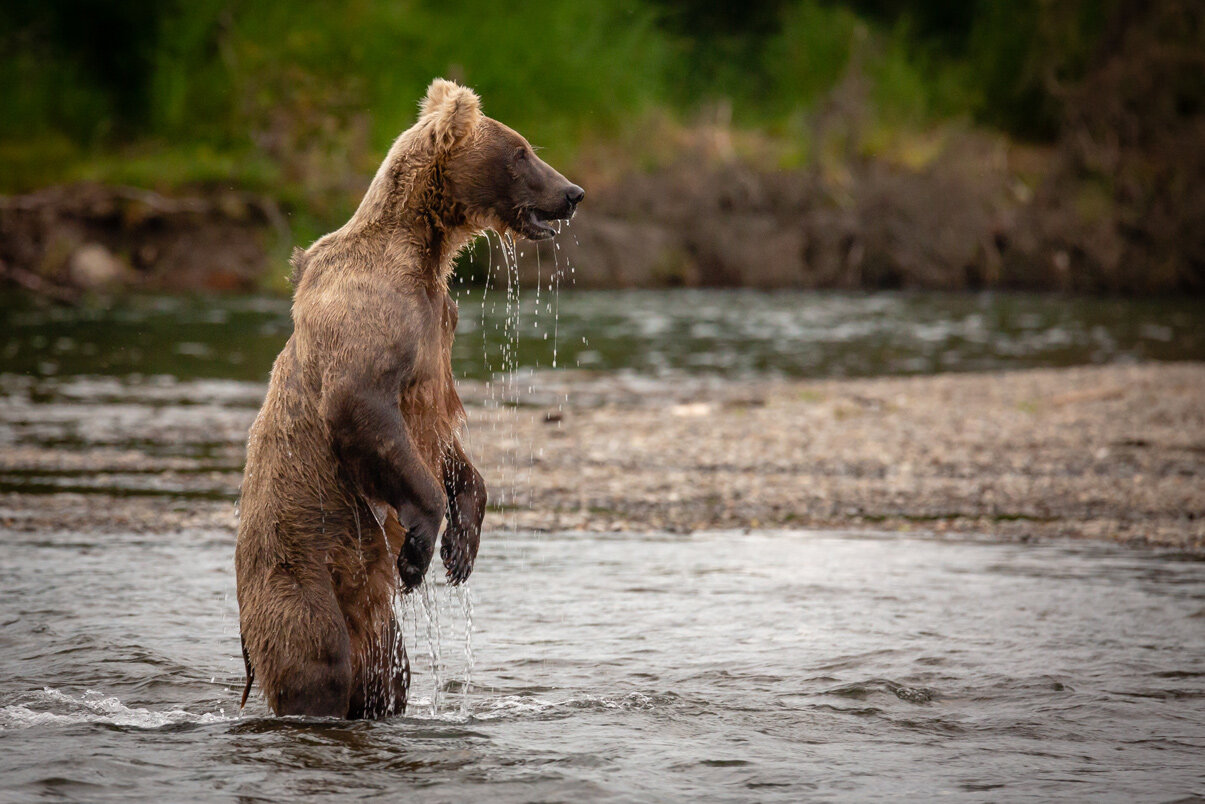
A young brown bear stands to survey his surroundings while fishing on Brooks River in Katmai National Park. Taken in July 2019. Photo by Ben Blankenship.

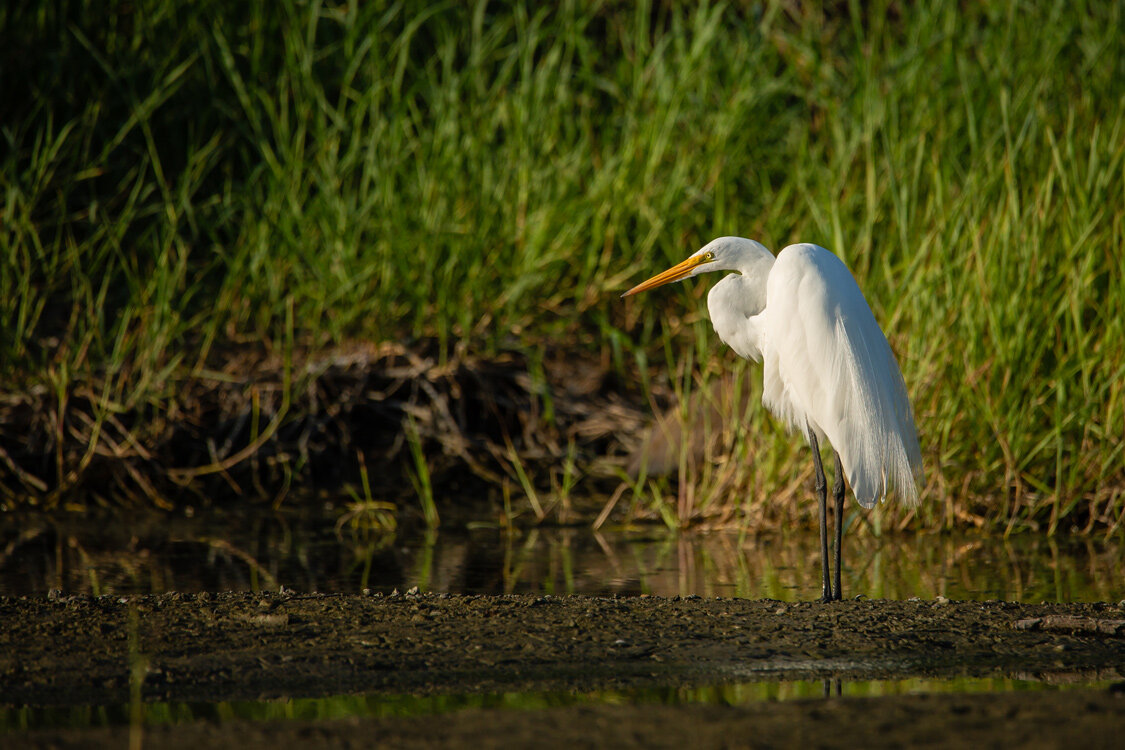
A Great White Egret stalks the lagoon for fish and crustaceans on the Osa Peninsula, Costa Rica. Taken February 2019. Photo by Ben Blankenship.
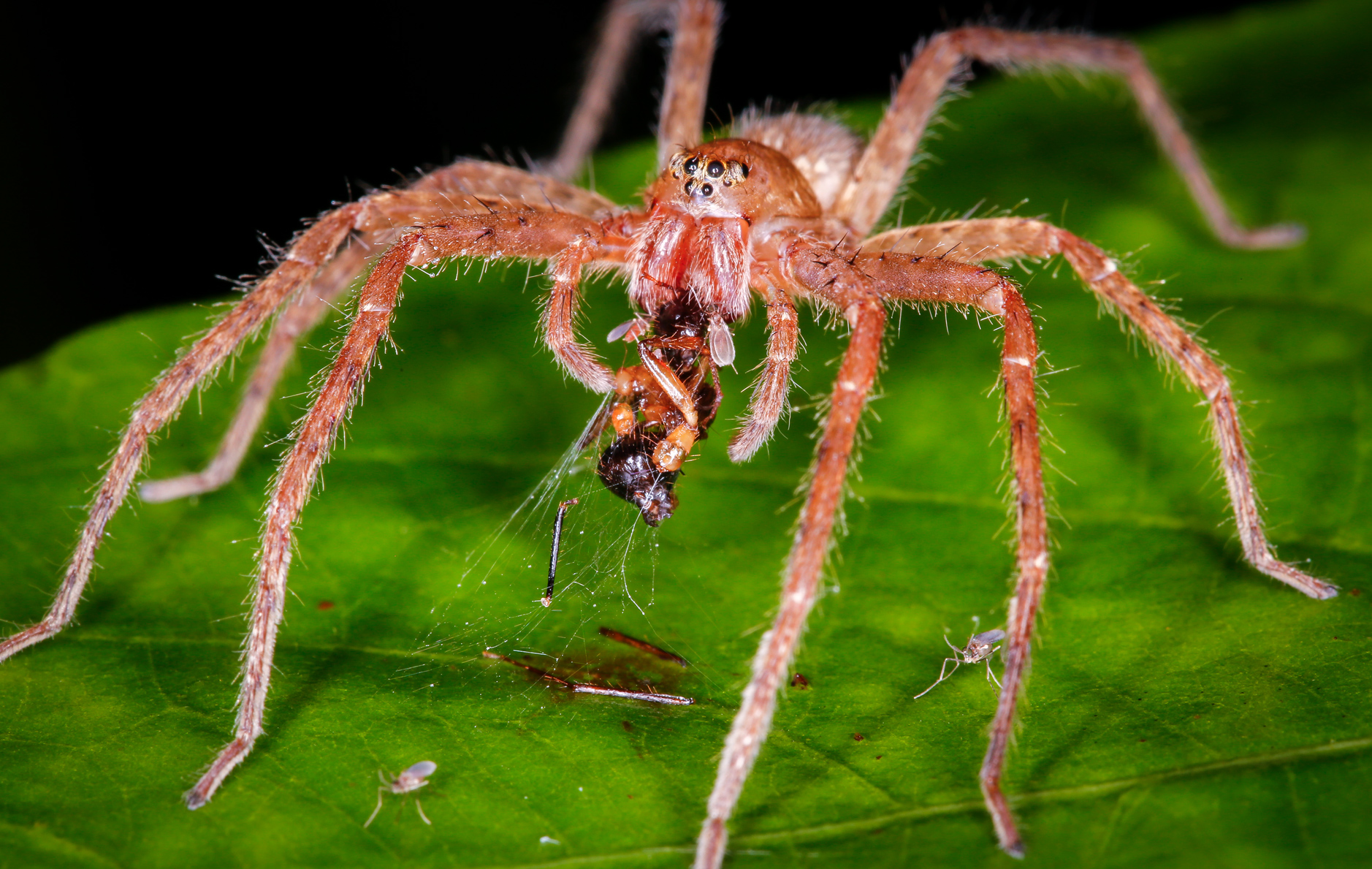
This spider eating its prey was observed on a nighttime amphibian and reptile survey conducted by the NGO Frontier in Carate, Costa Rica on the Osa Peninsula. Taken March, 2017. Photo by Ben Blankenship.
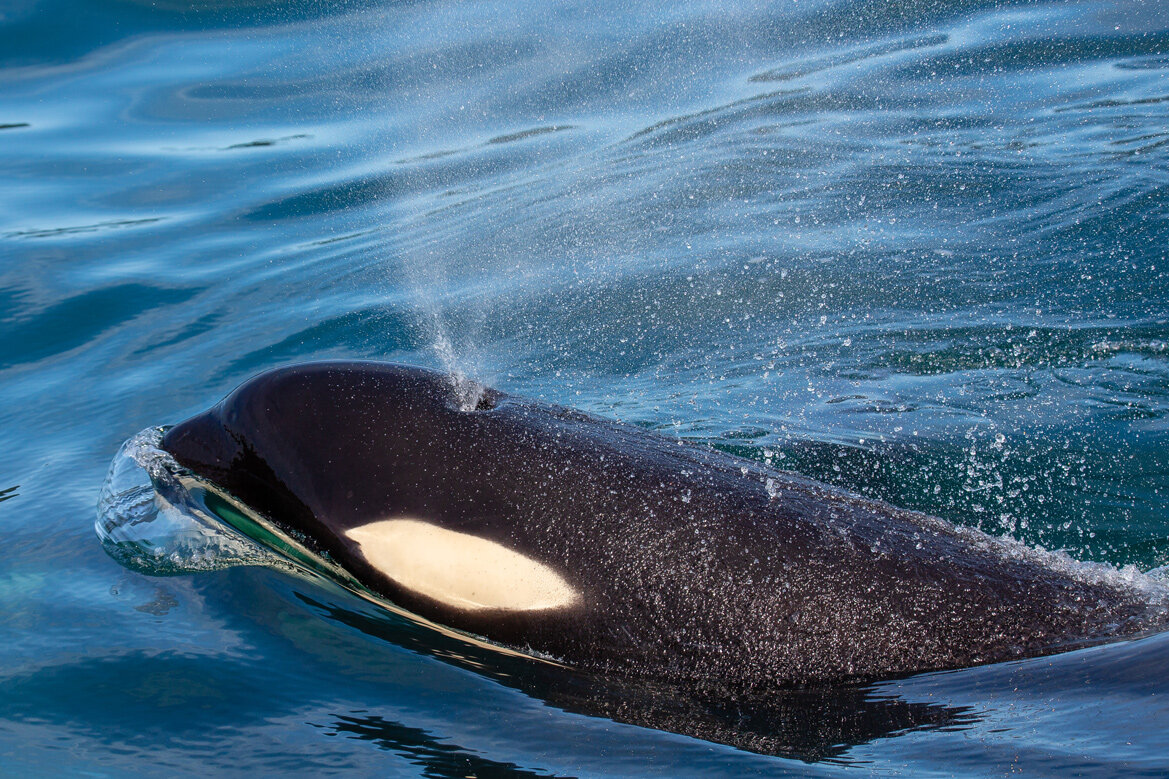
This female orca surfaced so close to our boat that she coated me and my camera in a spray of sea water and orca snot. Taken in Kenai Fjords National Park, Alaska. June 2019. Photo by Ben Blankenship
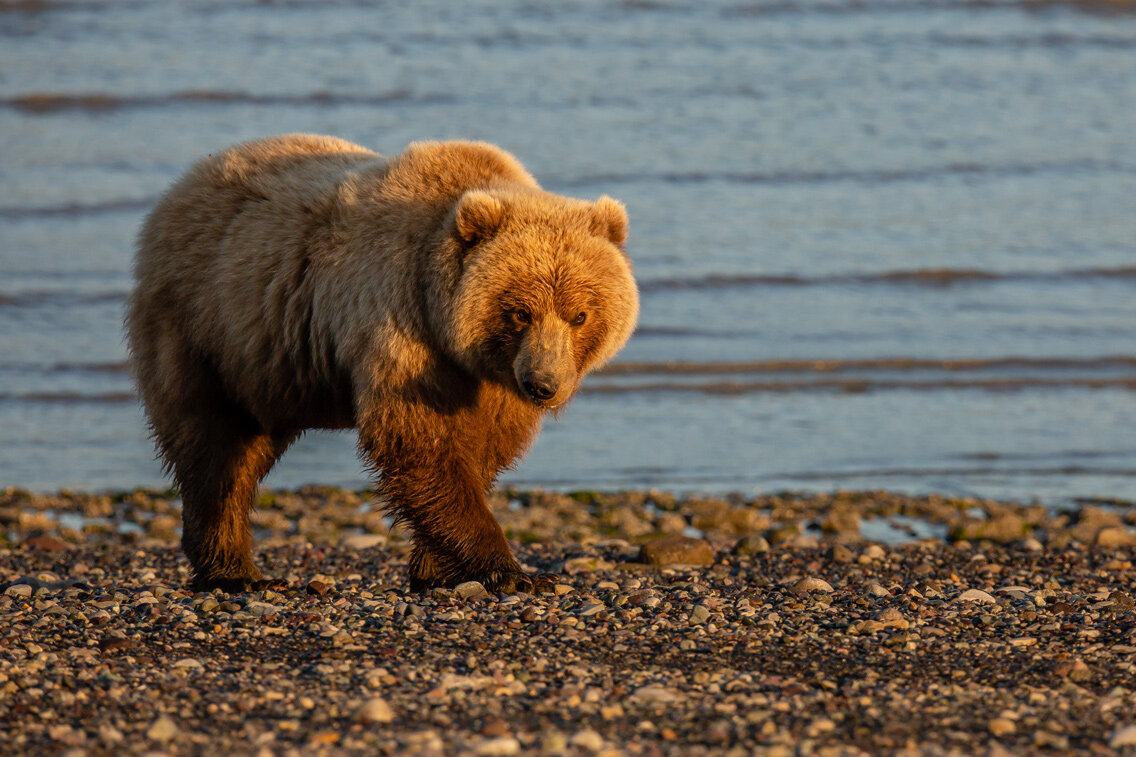
This beautiful brown bear was walking the beaches of Lake Clark National Park just before sunset. Her beautiful dish shaped face lit up in the soft warm light, she was curious and a bit grouchy as she walked past. Taken in June 2019. Photo by Ben Blankenship.

Two subadult brown bears wrestle in the grass adjacent to Brooks River in Katmai National Park. Taken September 2019. Photo by Ben Blankenship/©2020
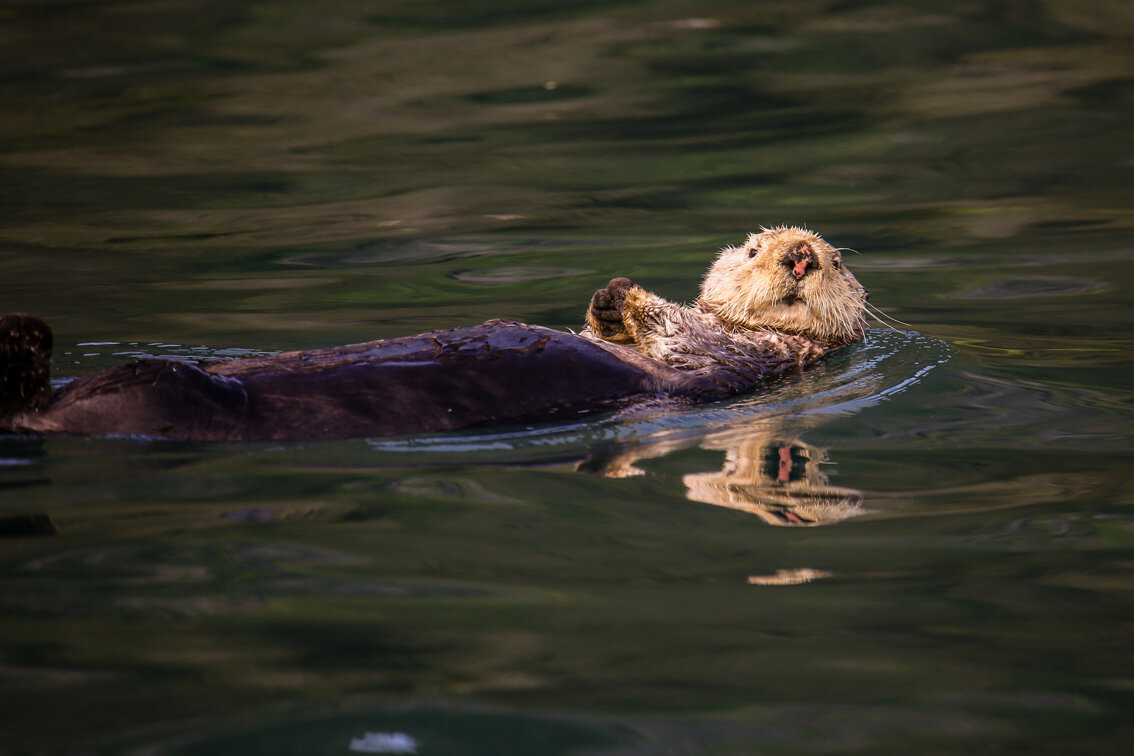
A sea otter floats in Resurrection Bay near Seward, Alaska. Taken in June 2019. Photo by Ben Blankenship.

Brooks Falls, Katmai NP, Alaska. Taken July 2021. By Ben Blankenship.

A green basilisk lizard (aka the Jesus Christ Lizard) gazes warily into my camera lens as we float by a on a boat in Tortuguero National Park, Costa Rica. Taken February 2020. Photo by Ben Blankenship/©2020
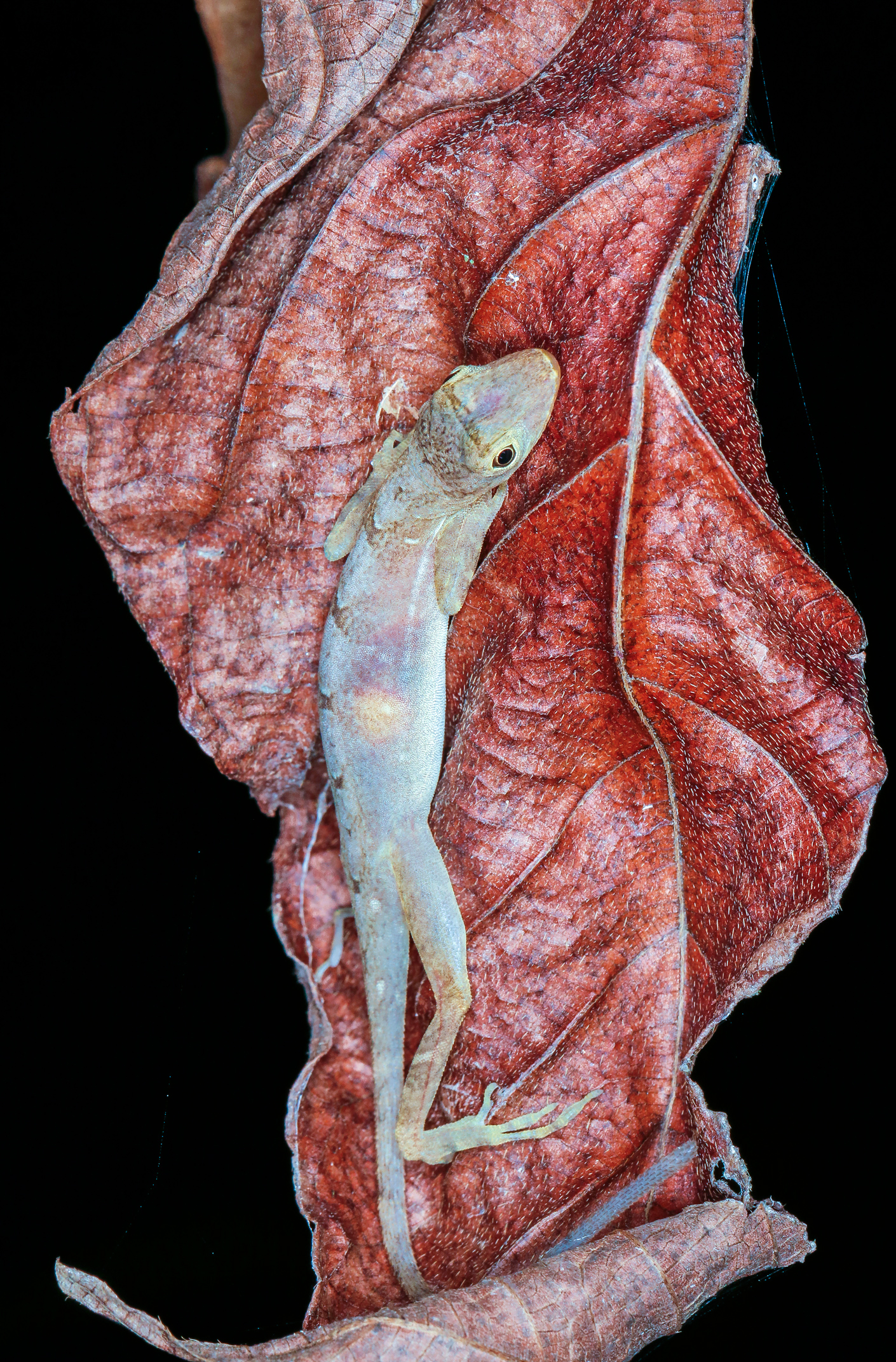
This Golfo Dulce anole was observed on a nighttime amphibian and reptile survey conducted by the NGO Frontier in Carate, Costa Rica on the Osa Peninsula. The Golfo Dulce anole gets its name from El Golfo Dulce, the gulf that separates the Osa Peninsula from mainland Costa Rica. Taken May, 2017. Photo by Ben Blankenship.
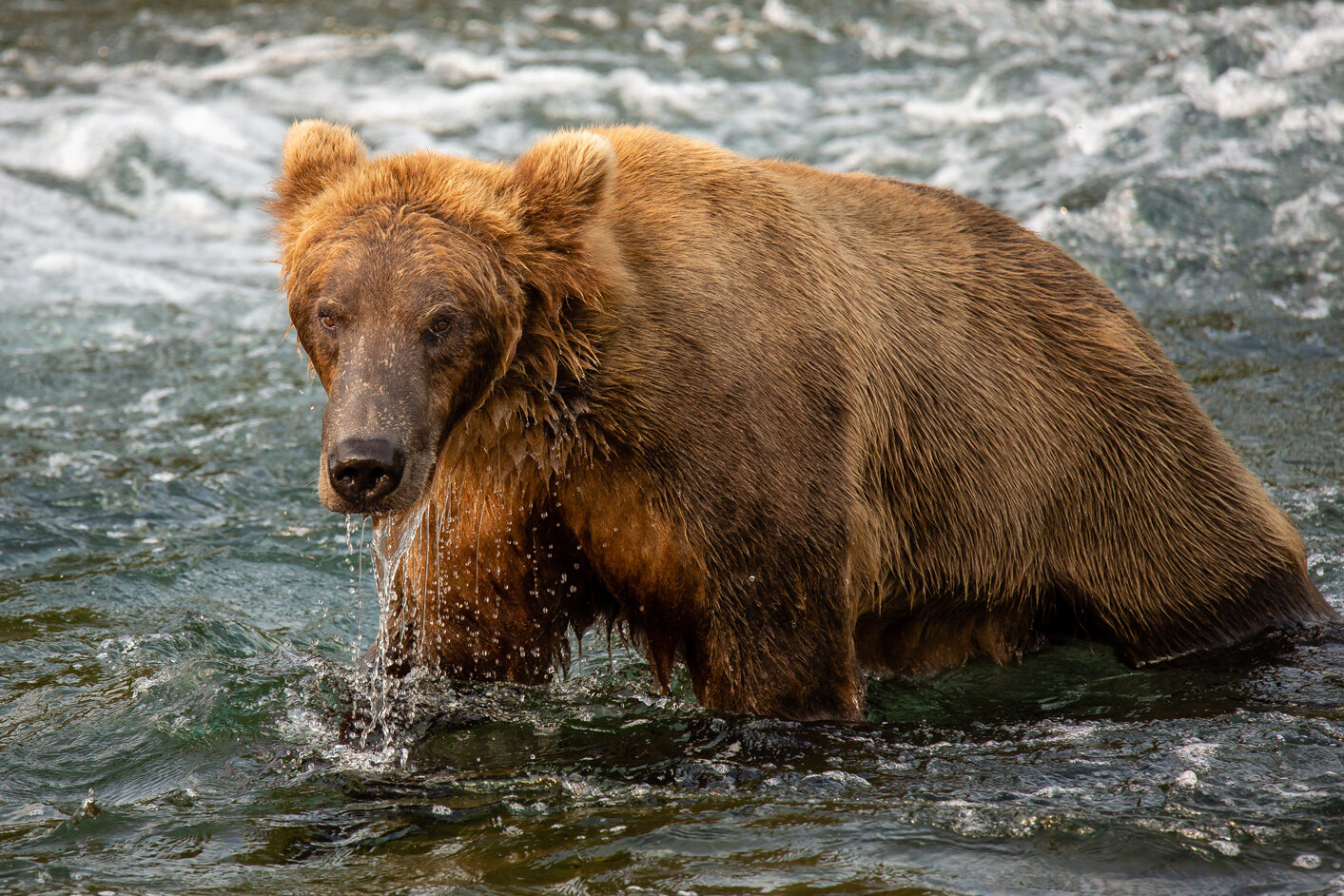
Brown bears fish all day long during the summer on Brooks River in Katmai National Park. Here, a bear takes a break from “snorkeling” for sockeye salmon to give me and my camera a quick glance. Taken in Katmai National Park, July 2019. Photo by Ben Blankenship.
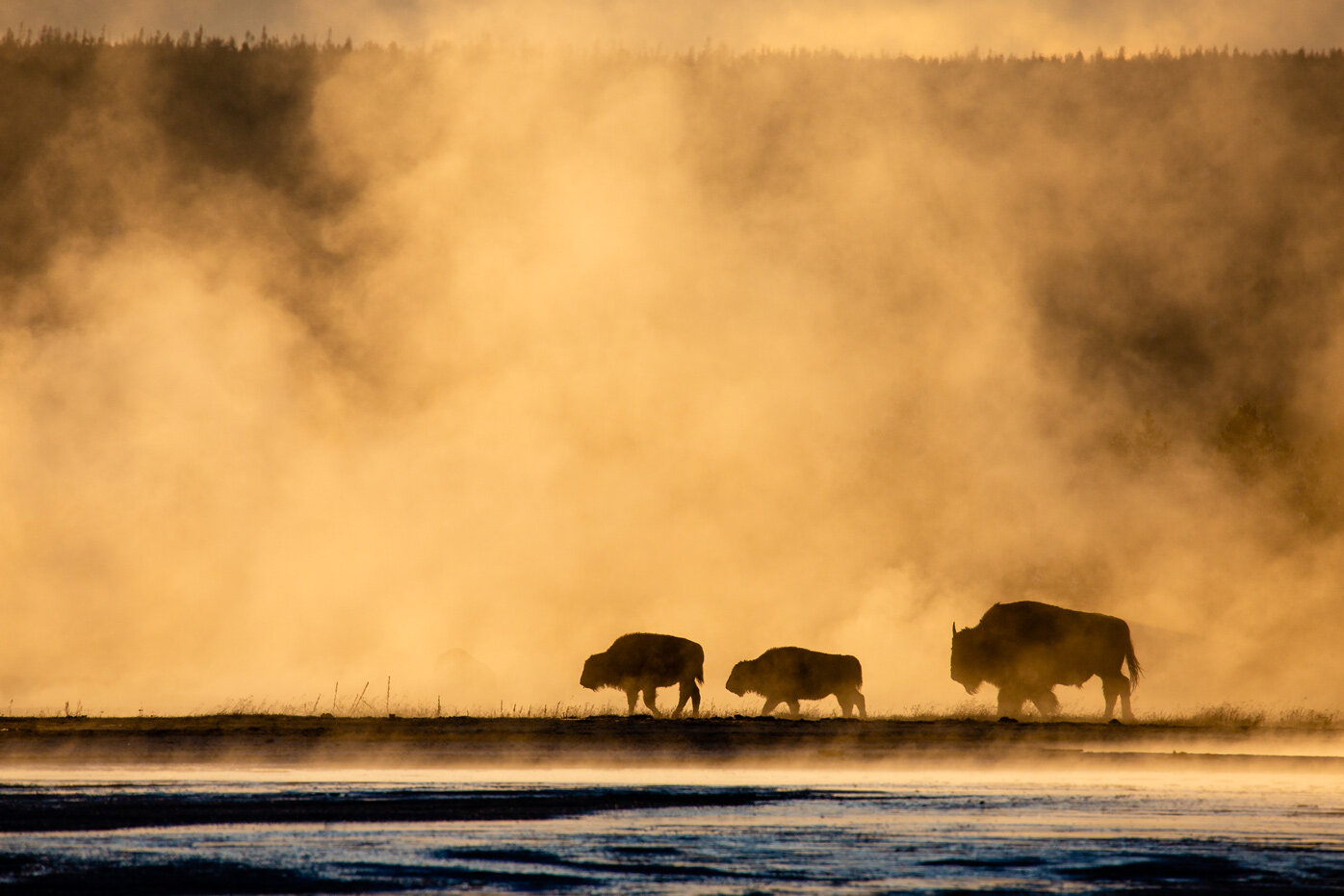
A mother bison guides her two yearling calves through the lower geyser basin in Yellowstone National Park. Taken in September 2019. Photo by Ben Blankenship.
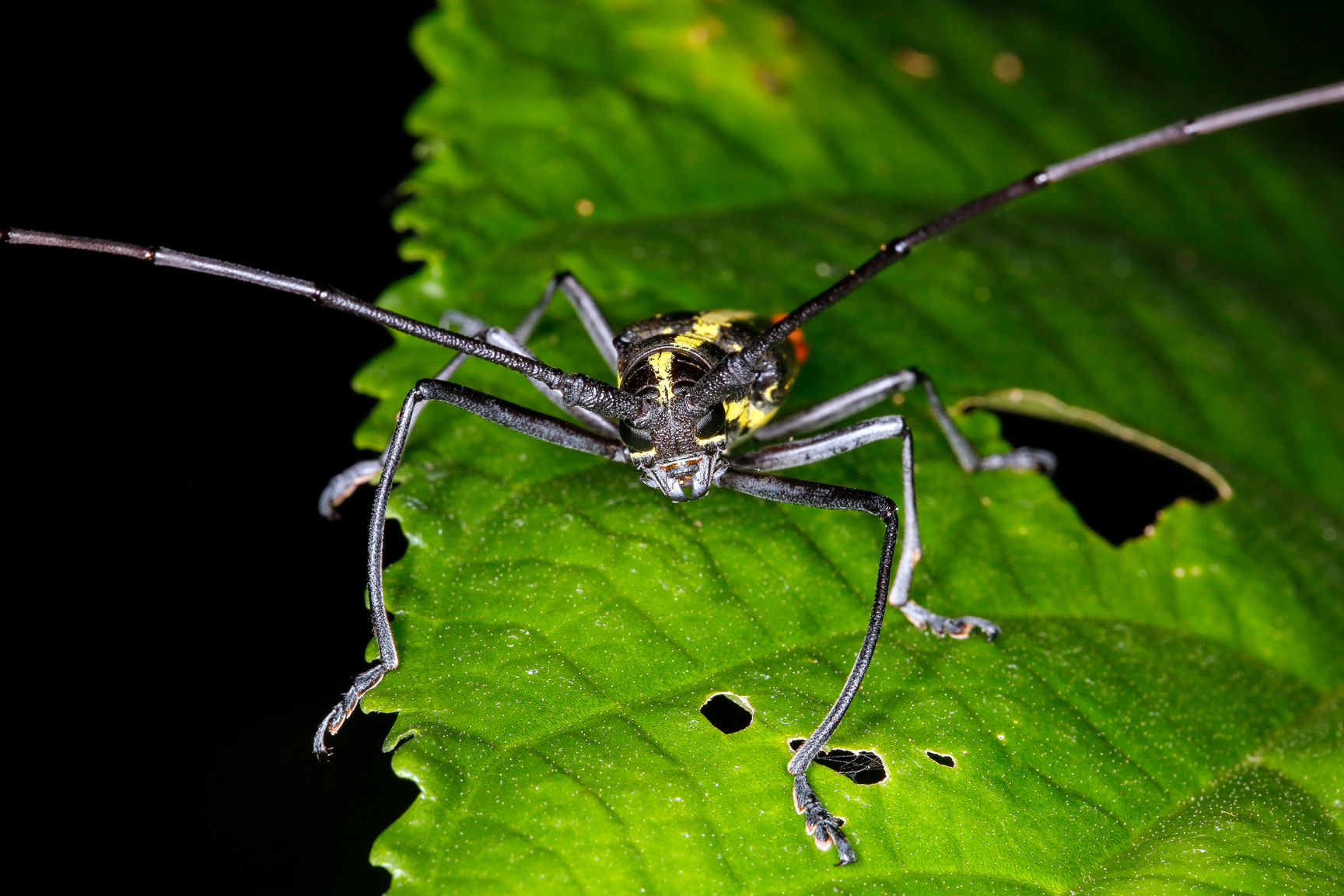
This bizarre and beautiful Harlequin Beetle was observed on a nighttime amphibian and reptile survey conducted by the NGO Frontier in Carate, Costa Rica on the Osa Peninsula. Taken March, 2017. Photo by Ben Blankenship.
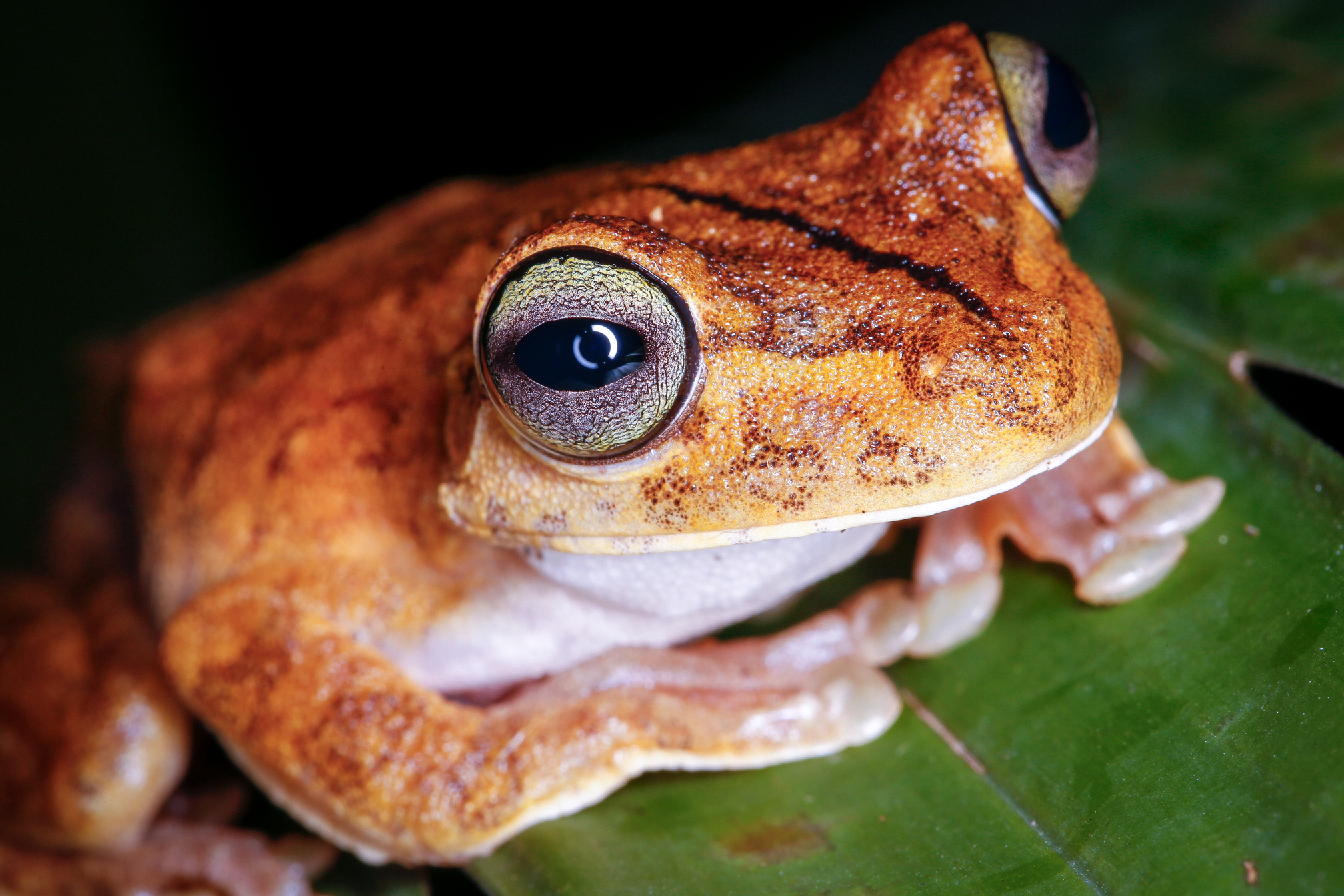
This large gladiator tree frog was observed on a nighttime amphibian and reptile survey conducted by the NGO Frontier in Carate, Costa Rica on the Osa Peninsula. The gladiator tree frog gets its name from the male's characteristic barbs on its hind legs which it uses to battle other males for mating rights with females. Battles are sometimes to the death. Taken March, 2017. Photo by Ben Blankenship.
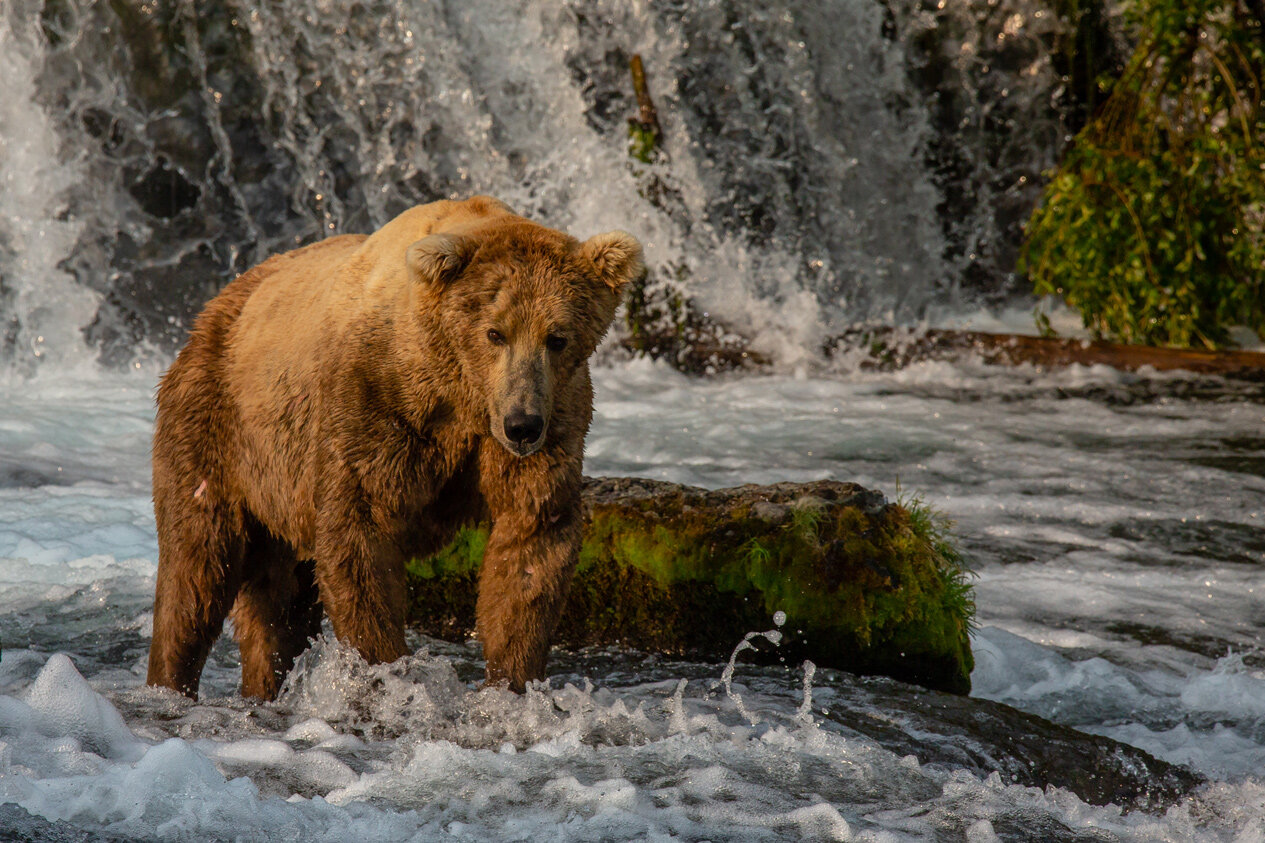
Here, Otis, one of the oldest bears at Brooks Falls, fishes the area known as “The Office” for summer sockeye salmon in Katmai National Park, Alaska. Taken in July 2019. Photo by Ben Blankenship.

A Red Eye Tree Frog perches on a the petals on a flower on Costa Rica’s Osa Peninsula. Taken in February 2020. Photo by Ben Blankenship/©2020

A male orca surfaces in Kenai Fjords National Park, Alaska. Taken June 2019. Photo by Ben Blankenship/©2020
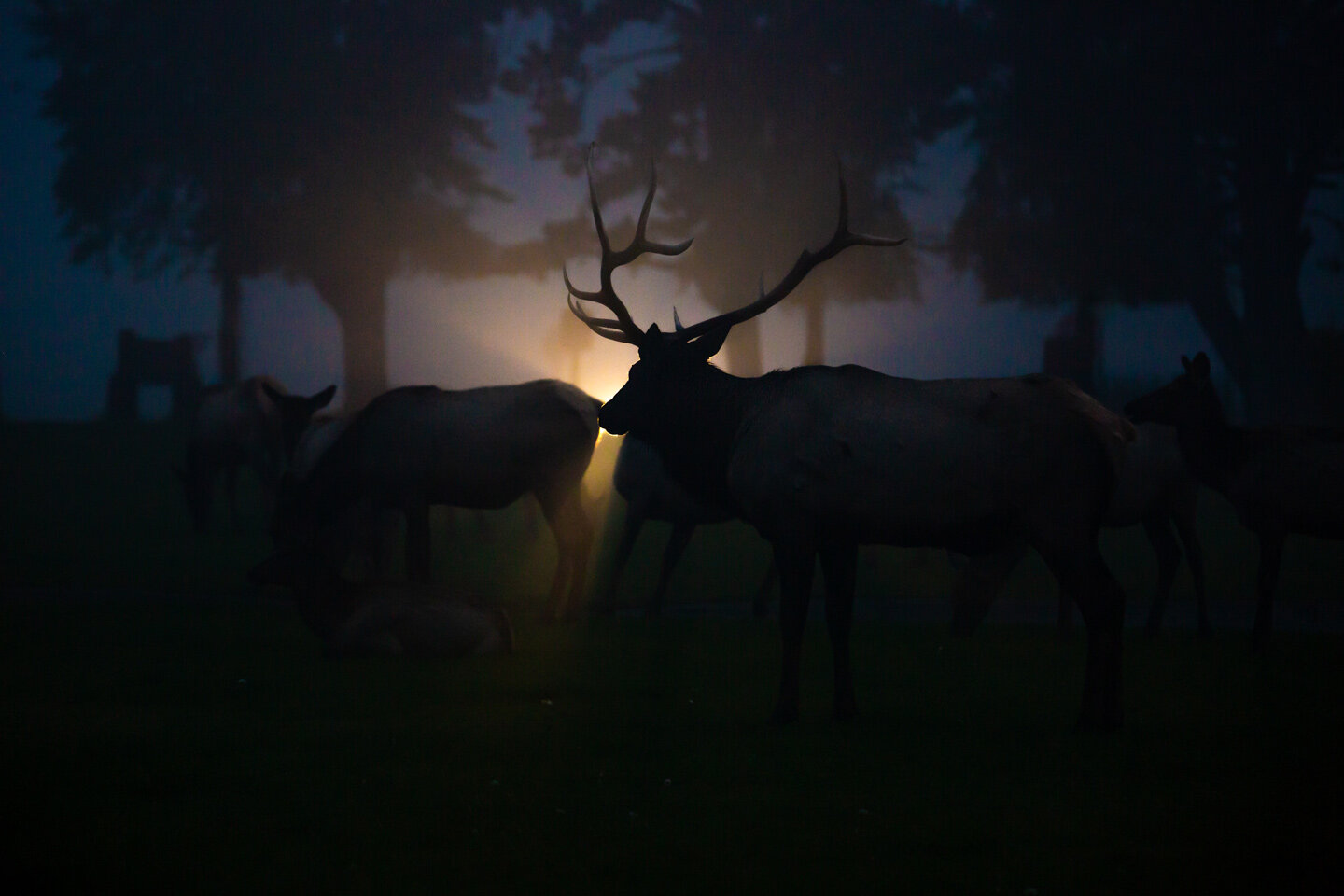
A bull elk moves his harem of cows through the town of Mammoth Hot Springs in Yellowstone National Park. Taken in September 2019. Photo by Ben Blankenship.

A three toed sloth basks in the morning sun, clinging to the branches of a tree overhanging a canal of the Rio Sierpe river system near Drake Bay, Costa Rica. Taken February 2020. Photo by Ben Blankenship/©2020

A brown bear catches a sockeye salmon at Brooks Falls in Katmai National Park. The force of the bear’s bite sent a stream of blood pouring from the doomed salmon. Taken September 2019. Photo by Ben Blankenship/©2020
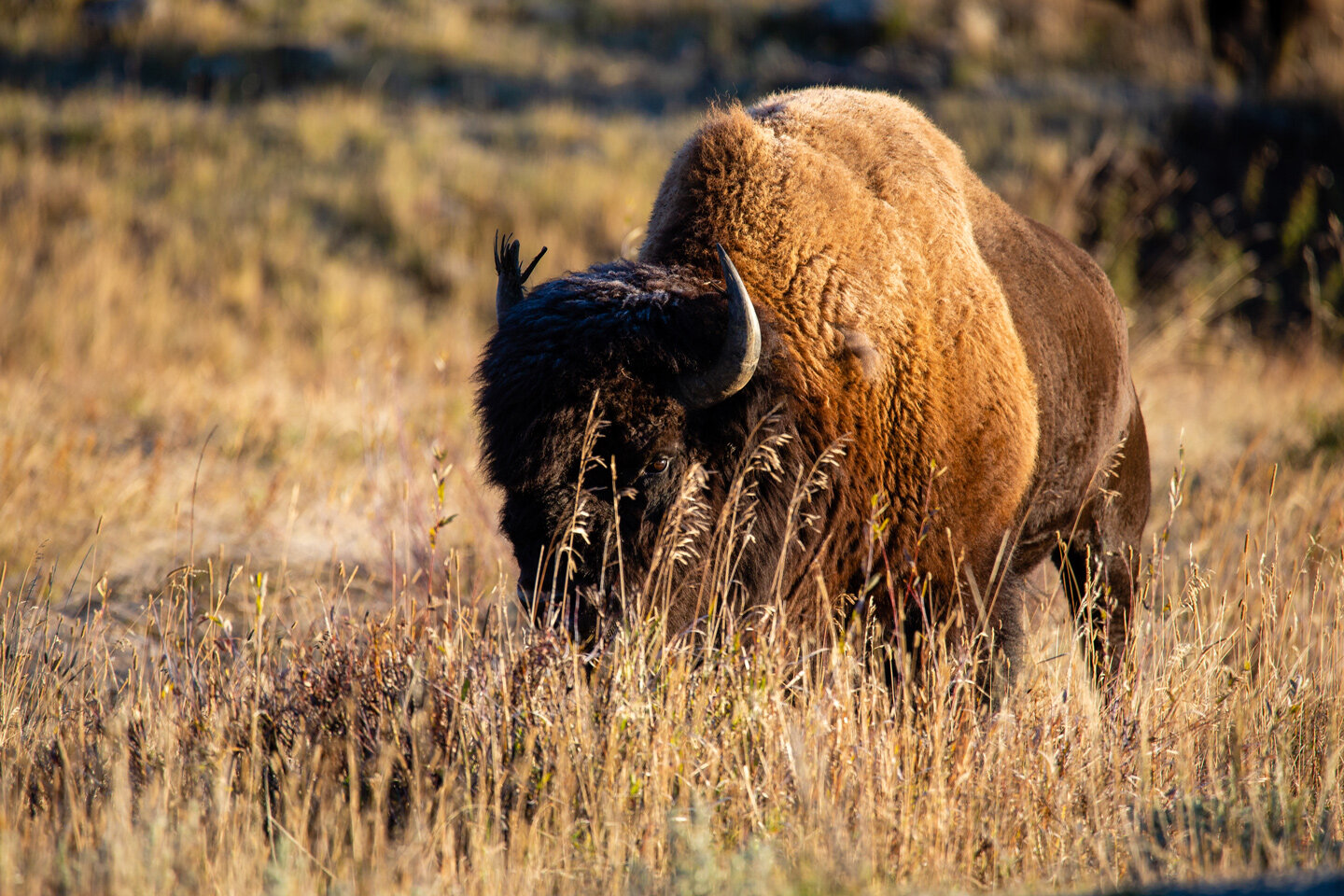
This big bull bison was cruising along in Yellowstone National Park in the autumn of 2019. He had apparently had an action-packed summer, during the annual bison rut, during which males battle ferociously for mating rights. You can see his left horn is splintered from some massive impact, most likely with the skull of another bull bison.
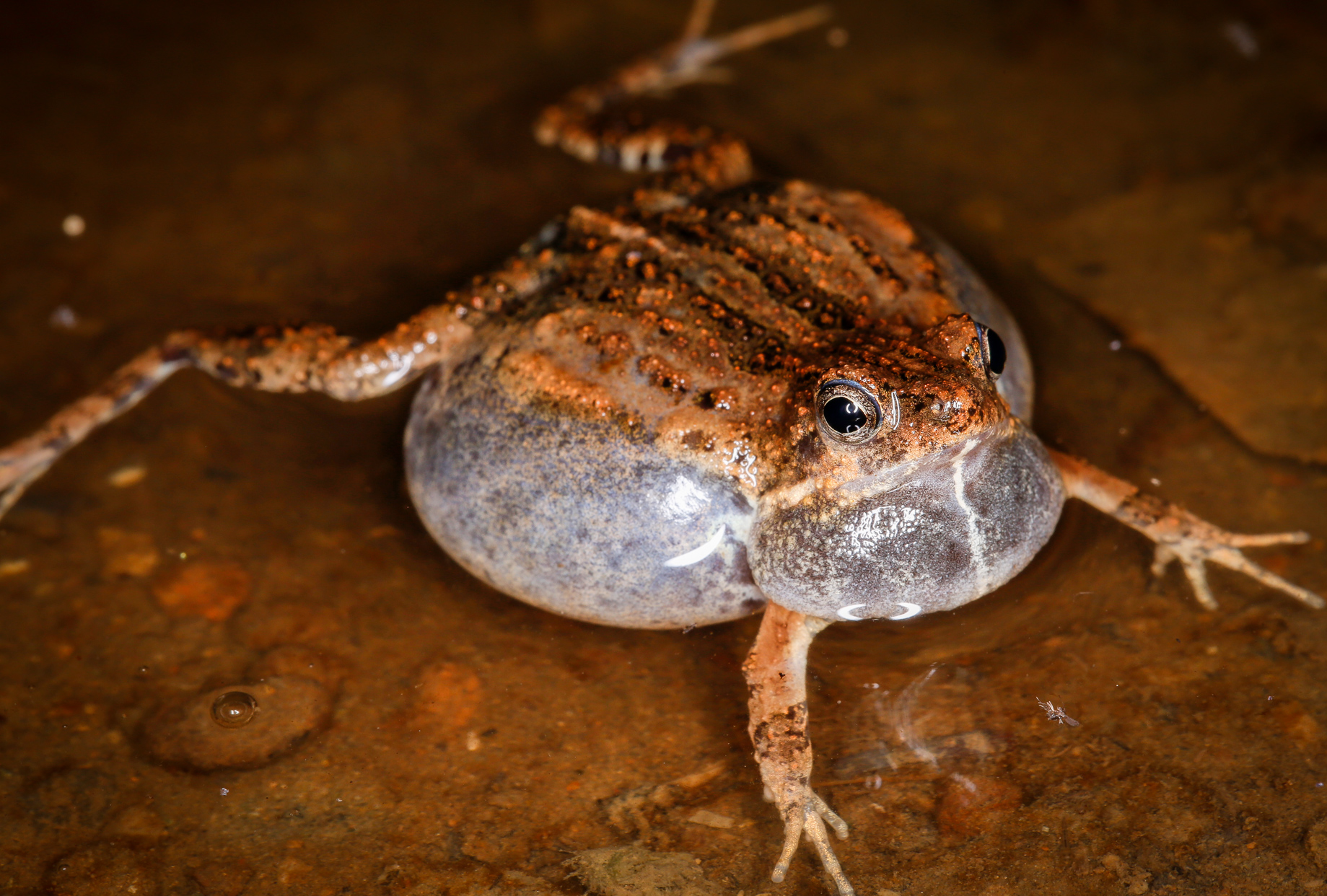
The sound of this frog's call sounds very similar to the sound of an old video game laser sound effect. In fact, the first time I heard its call, I believed it to be emanating from my cell phone. Upon research online though, we learned the calls were being emitted by the Tungara Frog, sometimes apparently nicknamed, the video game frog. This individual was observed on a nighttime amphibian and reptile survey conducted by the NGO Frontier in Carate, Costa Rica on the Osa Peninsula. Taken March, 2017. Photo by Ben Blankenship.
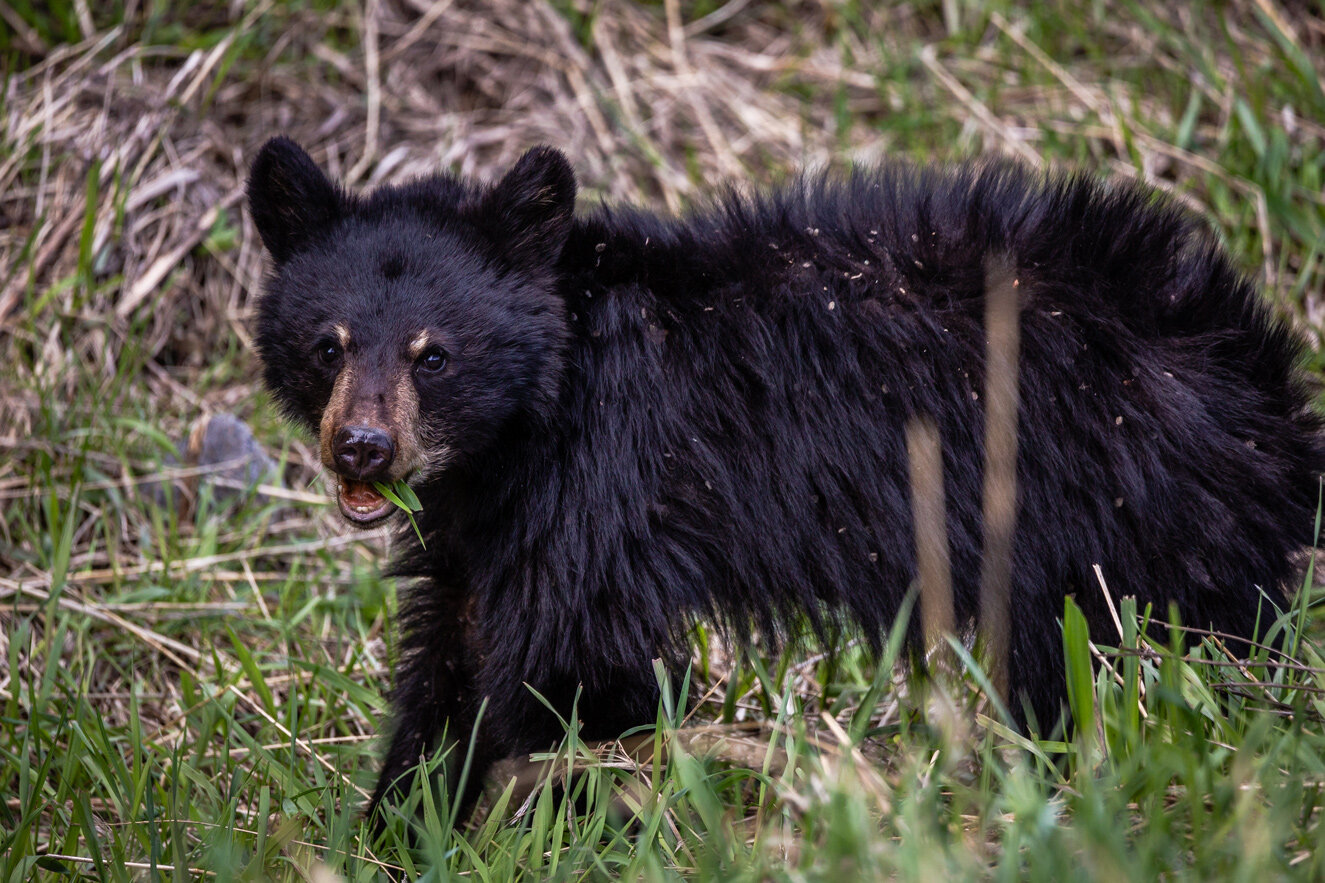
A black bear cub grazes on fresh sedges in Yellowstone National Park. Taken in May 2019. Photo by Ben Blankenship.
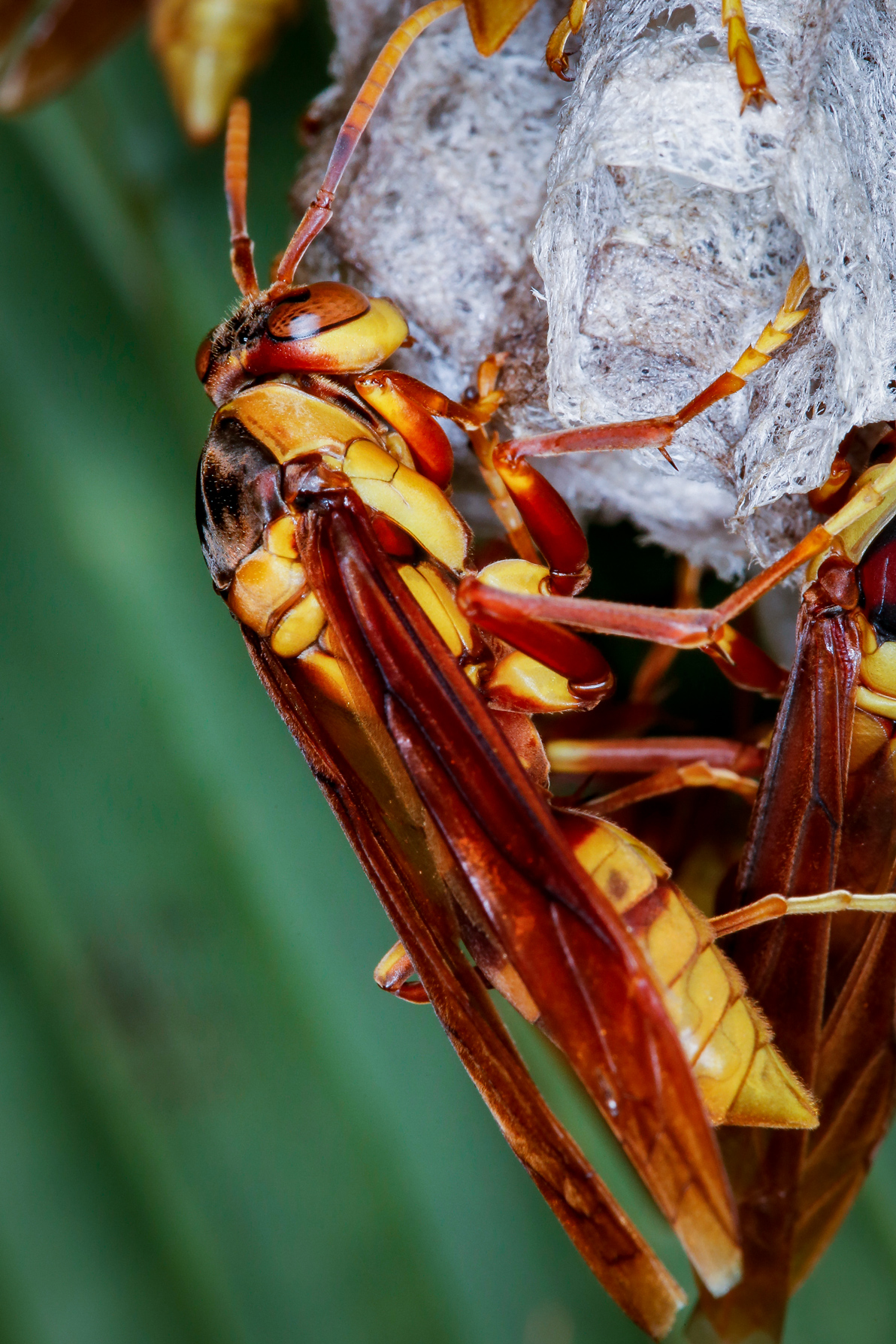
This Yellow Hornet was observed on a nighttime amphibian and reptile survey conducted by the NGO Frontier in Carate, Costa Rica on the Osa Peninsula. Taken March, 2017. Photo by Ben Blankenship.
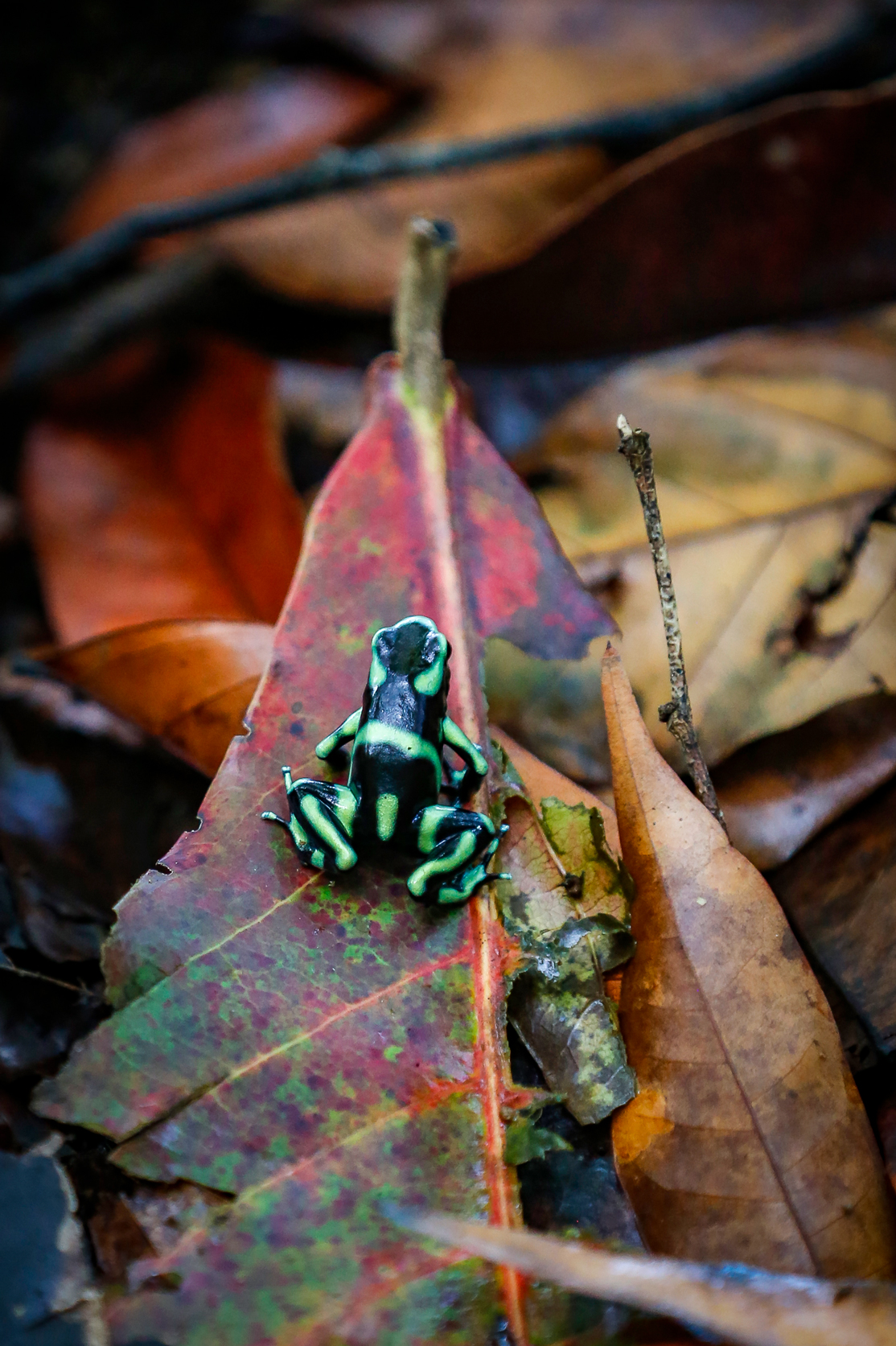
The Green and Black Poison Dart Frog's name is derived from the historical practice of indigenous peoples harvesting its poison and using it to coat their darts and arrows for hunting. The very small amount of poison the frog possesses is enough to make a human heart stop beating. However, like most poison dart frogs, the green-and-black poison dart frog only releases its poison if it feels threatened. This individual was observed in Corcovado National Park, Costa Rica, on the Osa Peninsula. Taken August, 2017. Photo by Ben Blankenship.
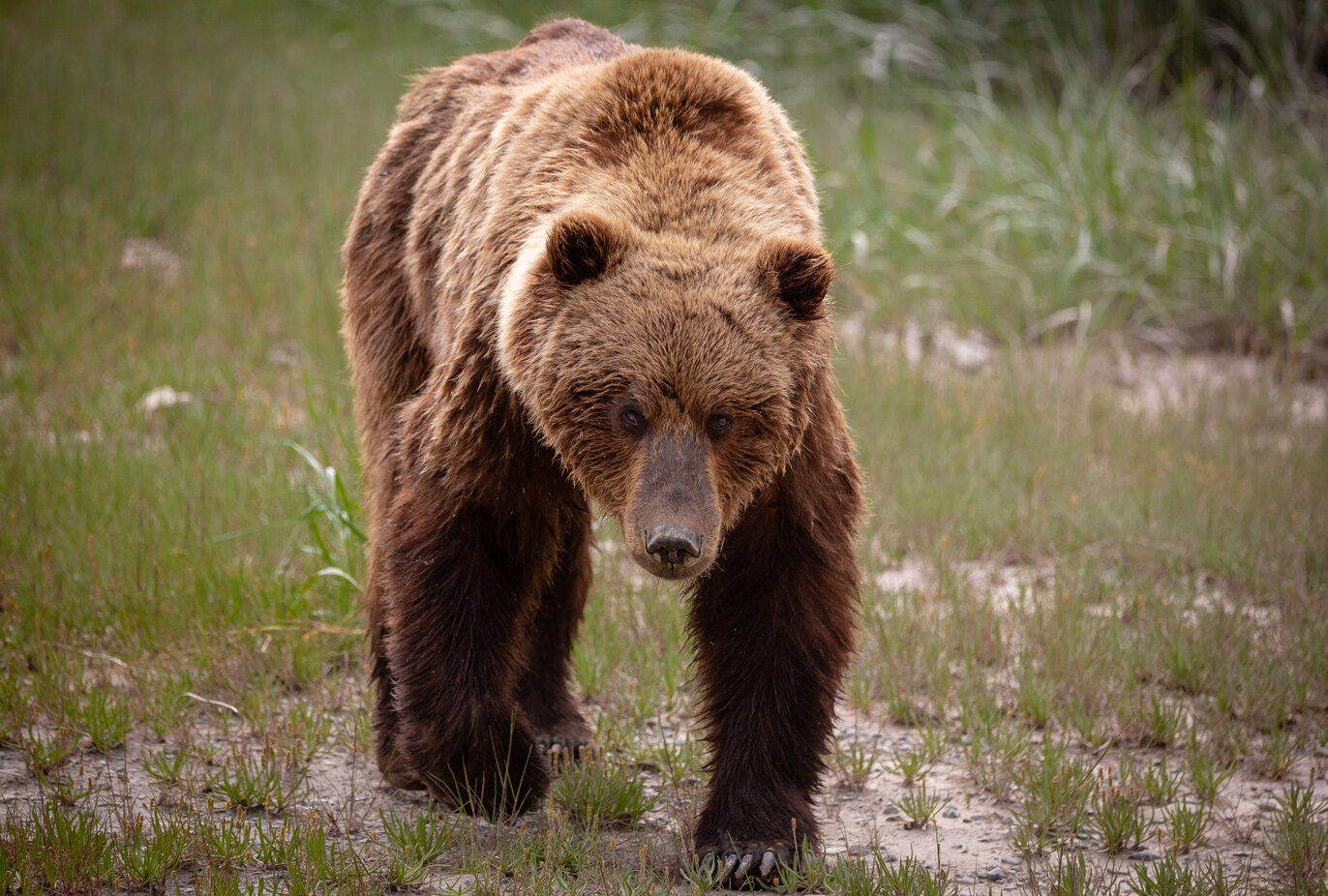
This young male was out for trouble as he approached myself and a group of other photographers in Lake Clark National Park. But, with some requisite huffing and puffing, we convinced him we were more trouble than it was worth. Taken in June 2019. Photo by Ben Blankenship.
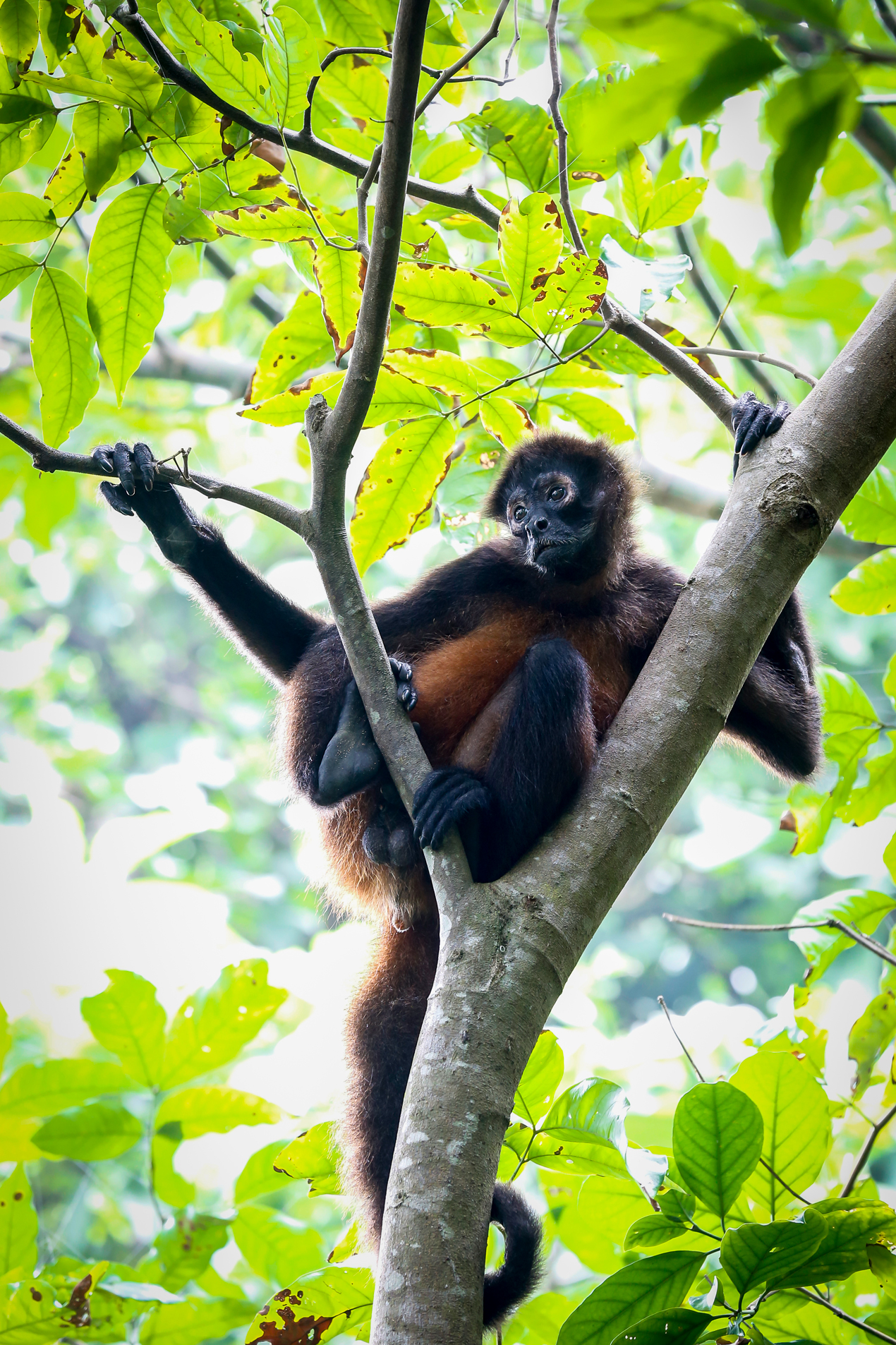
This adult Geoffrey's Spider Monkey was observed inside Corcovado National Park, Costa Rica. It's body position and "sad-looking" eyes gave me an impression of forlornness. Taken August, 2017. Photo by Ben Blankenship.
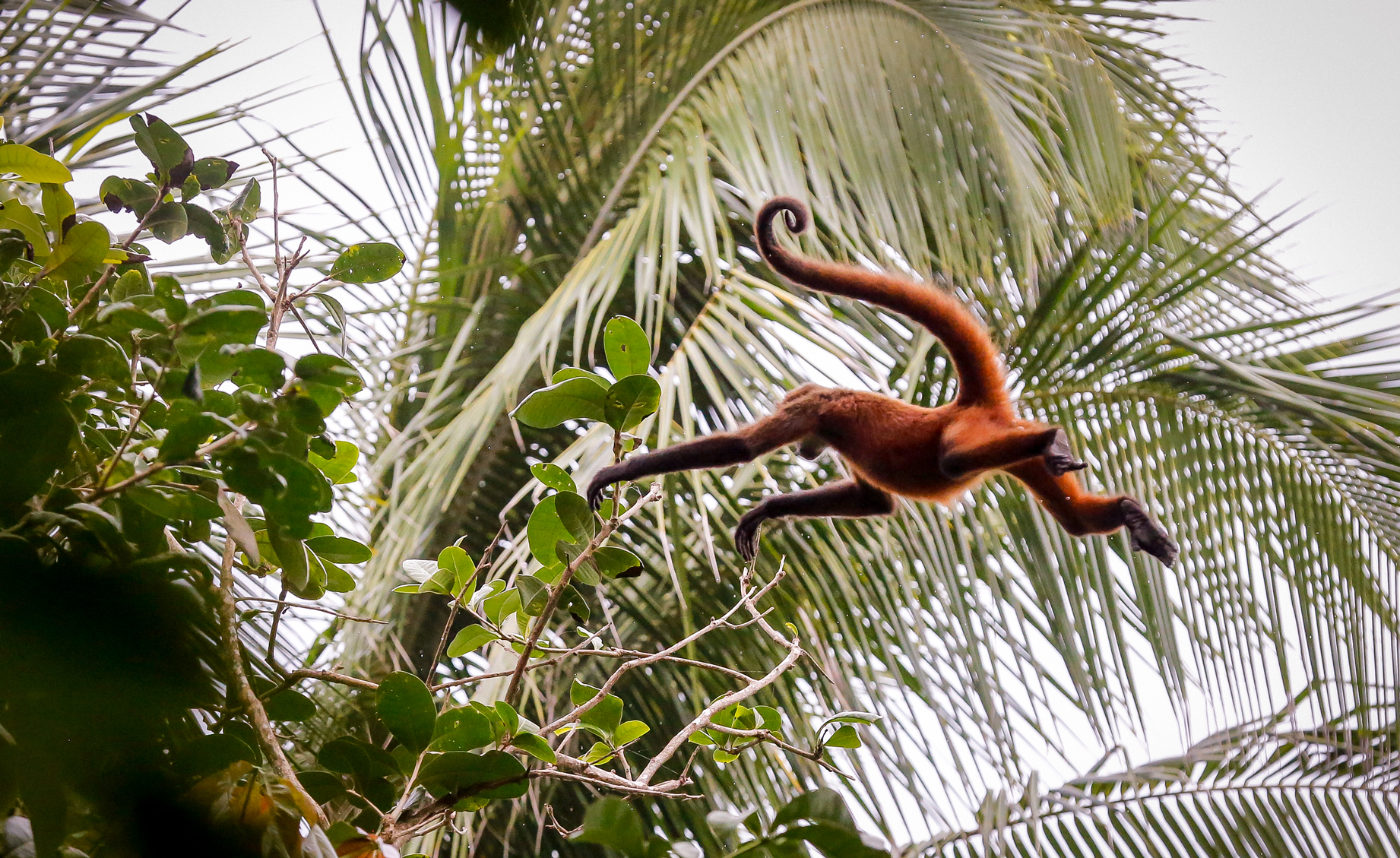
This male Geoffrey's Spider Monkey was observed leaping from tree to tree inside Corcovado National Park, Costa Rica. Taken August, 2017. Photo by Ben Blankenship.
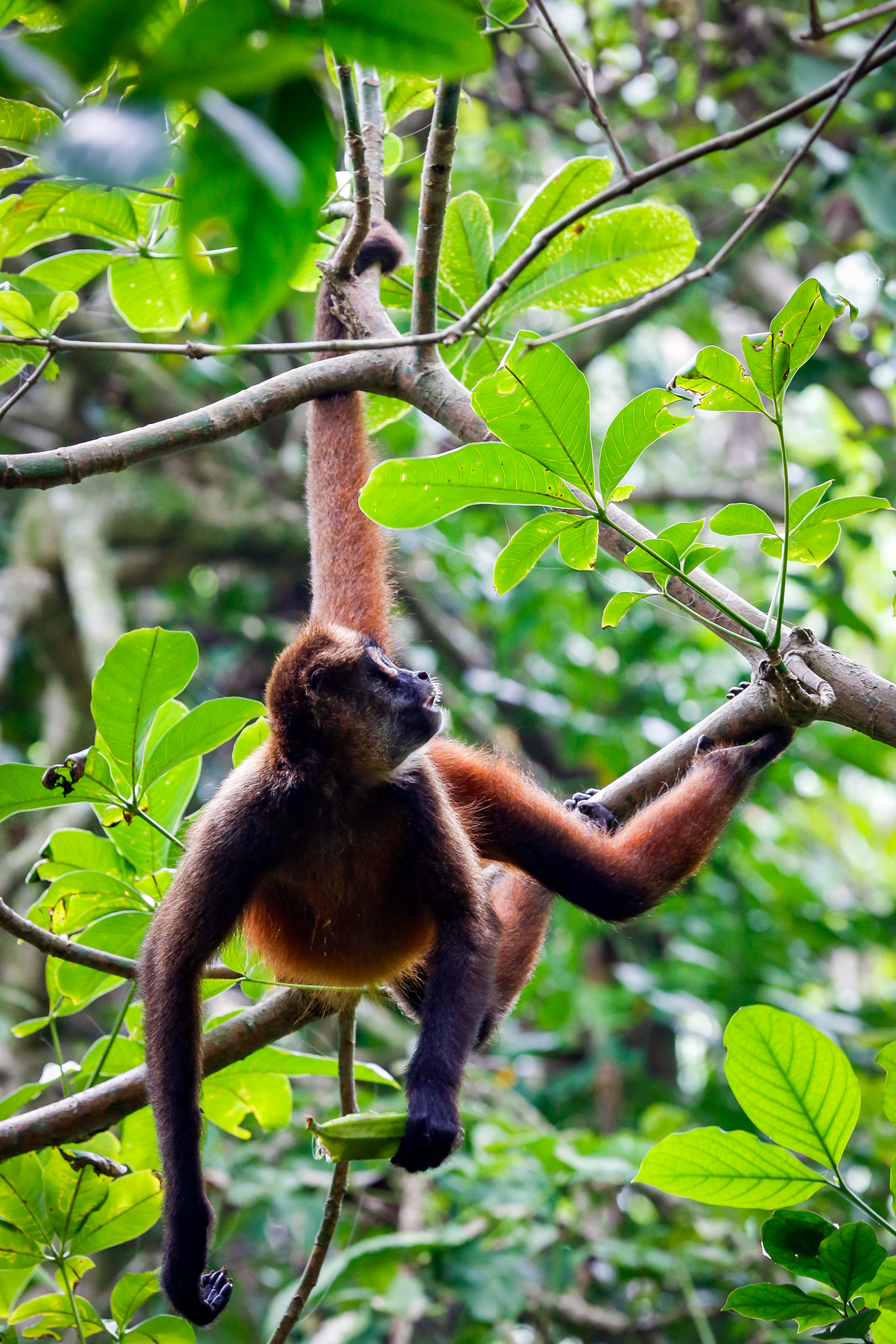
This male Geoffrey's Spider Monkey was observed hanging by its tail from a tree limb inside Corcovado National Park, Costa Rica. Taken August, 2017. Photo by Ben Blankenship.
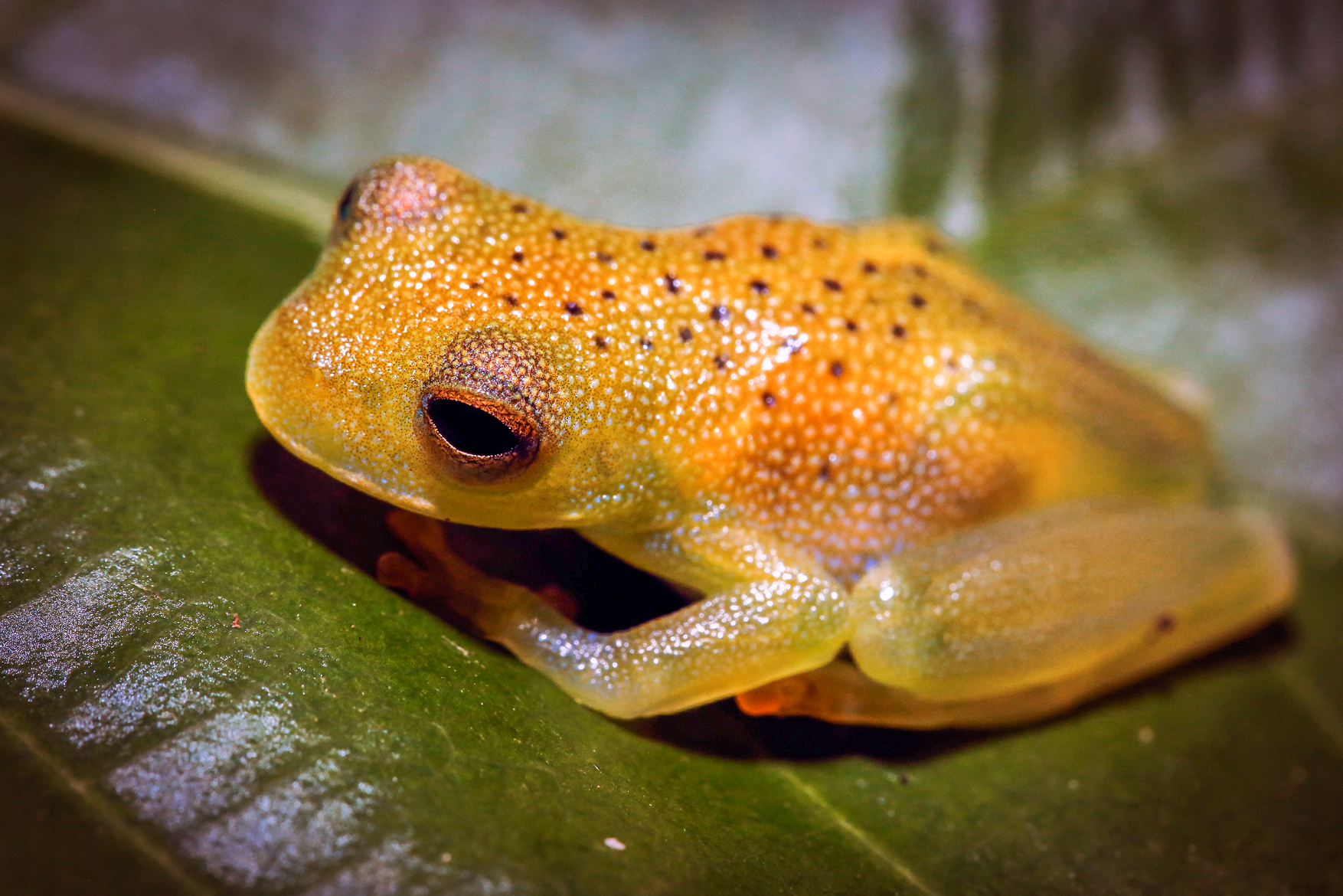
This granular glass frog was observed on a nighttime amphibian and reptile survey by the NGO Frontier in Carate, Costa Rica on the Osa Peninsula. Glass frogs get their name from their characteristic translucent skin which allows them to better blend in with whatever surface they are sitting on as a defense mechanism. Taken March, 2017. Photo by Ben Blankenship.

A large American Crocodile basks in the sun of Rio Sierpe near Drake Bay in Costa Rica. Taken in February 2020. Photo by Ben Blankenship/©2020


A great gray owl perches amongst a grove of aspen trees, scanning the ground for movement on its quest for a meal. Taken in Grand Teton National Park, October 2019. Photo by Ben Blankenship/©2020

This adult female Baird’s Tapir was spotted in Costa Rica’s Corcovado National Park as she moved through thick underbrush. Not pictured is her yearling offspring that I was unable to get into the picture. Taken February 2020. Photo by Ben Blankenship/©2020

A spectacled caiman uses its excellent camouflage to hide amongst downed limbs in the canals of Costa Rica’s Tortuguero National Park. Taken February 2020. Photo by Ben Blankenship/©2020

A scarlet macaw makes its final approach to its nest on the Osa Peninsula in Costa Rica. Taken in February 2020. Photo by Ben Blankenship/©2020

A young white face capuchin munches on a mangrove leaf while resting on the mangrove branches. Taken at Rio Sierpe, Costa Rica February 2020. Photo by Ben Blankenship/©2020

An osprey leaves its perch in a dive for fish in Costa Rica’s Tortuguero National Park. Taken February 2020. Photo by Ben Blankenship/©2020

A white faced capuchin walks along a palm frond in Costa Rica’s Tortuguero National Park. February 2020. Photo by Ben Blankenship/©2020

A sockeye salmon makes the leap up Brooks Falls at Katmai National Park, straight towards a waiting brown bear waiting at the top of the falls. Taken September 2019. Photo by Ben Blankenship/©2020

This juvenile blue-throated toucanet (aka emerald toucanet) was spotted in the cloud forests of Costa Rica’s Talamanca Mountains near Los Quetzales National Park. February 2020. Photo by Ben Blankenship/©2020
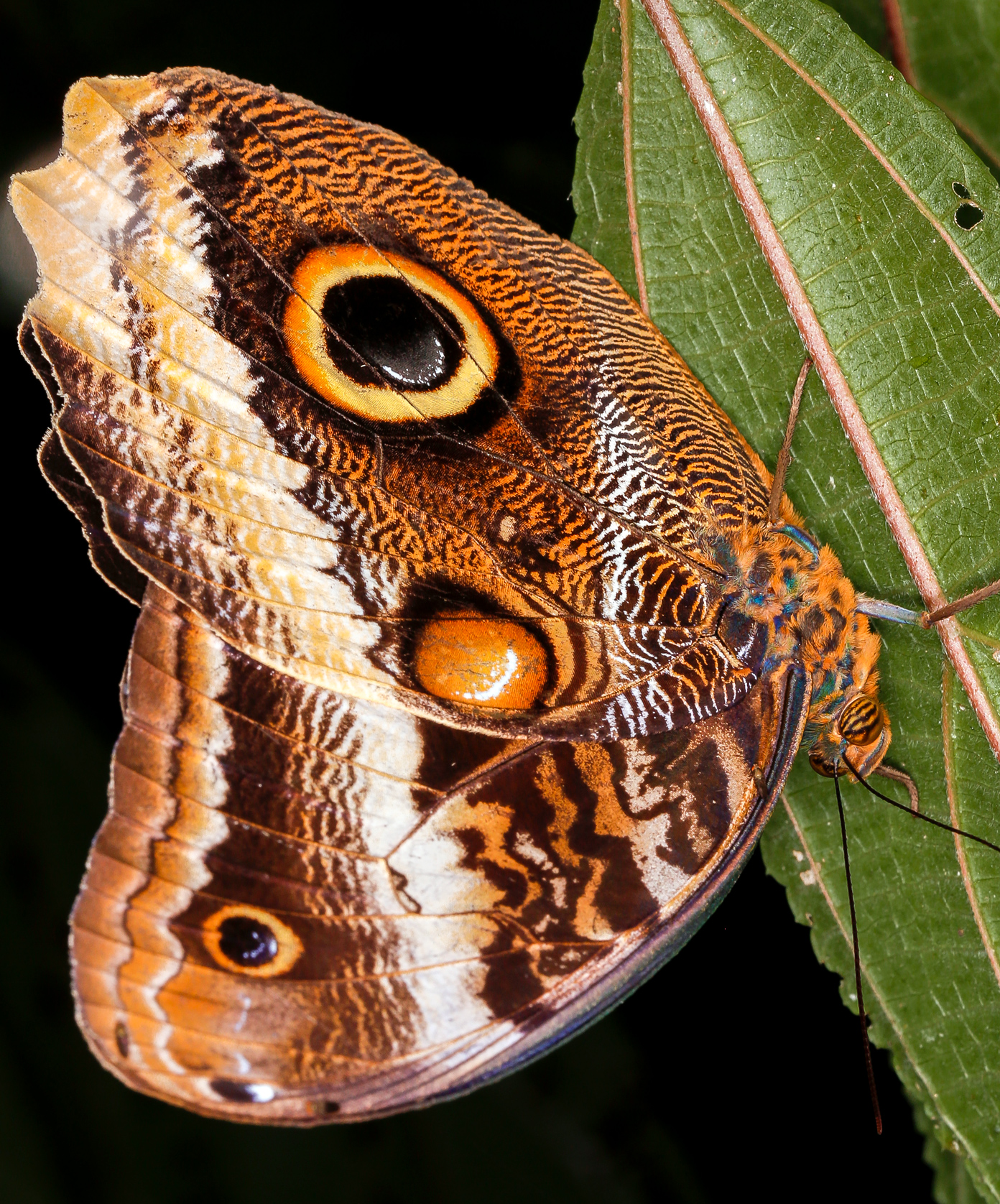
This enormous and beautiful example of an Owl Butterfly was observed on a nighttime amphibian and reptile survey conducted by the NGO Frontier in Carate, Costa Rica on the Osa Peninsula. Taken April, 2017. Photo by Ben Blankenship.

The golden strands of this spider provide its namesake, the golden orb weaver. Taken in Cabo Matapalo, Costa Rica. February 2020. Photo by Ben Blankenship/©2020

The permanent smile of the scarlet smile is displayed here as the bird roosted on a palm frond near Costa Rica's Corcovado National Park. Taken December 2019. Photo by Ben Blankenship/©2020

This American Crocodile was spotted basking in the sun along the banks of Rio Sierpe near Drake Bay in Costa Rica. February 2020. Photo by Ben Blankenship/©2020

This female Baird’s Tapir was spotted in Costa Rica’s Corcovado National Park with her calf, which happened to be very camera shy. February 2020. Photo by Ben Blankenship/©2020

A cinnamon colored black bear traverses the rocks adjacent to the Madison River in Yellowstone National Park. Taken May 2019. Photo by Ben Blankenship/©2020

This beautiful male resplendent quetzal was spotted in San Gerardo, Costa Rica as it fed on young avocados in the early morning light. December 2019. Photo by Ben Blankenship/©2020

Two subadult brown bears wrestle and play fight in Katmai National Park, Alaska. Taken September 2019. Photo by Ben Blankenship/©2020

This male black throated trogon was spotted in Costa Rica’s Corcovado National Park as it took turns digging out a nesting hole with its female counterpart. December 2019. Photo by Ben Blankenship/©2020

This large example of a harlequin beetle was spotted near Puerto Jimenez on Costa Rica’s Osa Peninsula. December 2019. Photo by Ben Blankenship/©2020

A female Geoffrey’s spider monkey surveys the surroundings as it hangs from its prehensile tail. Taken near Costa Rica’s Corcovado National Park. December 2019. Photo by Ben Blankenship/©2020
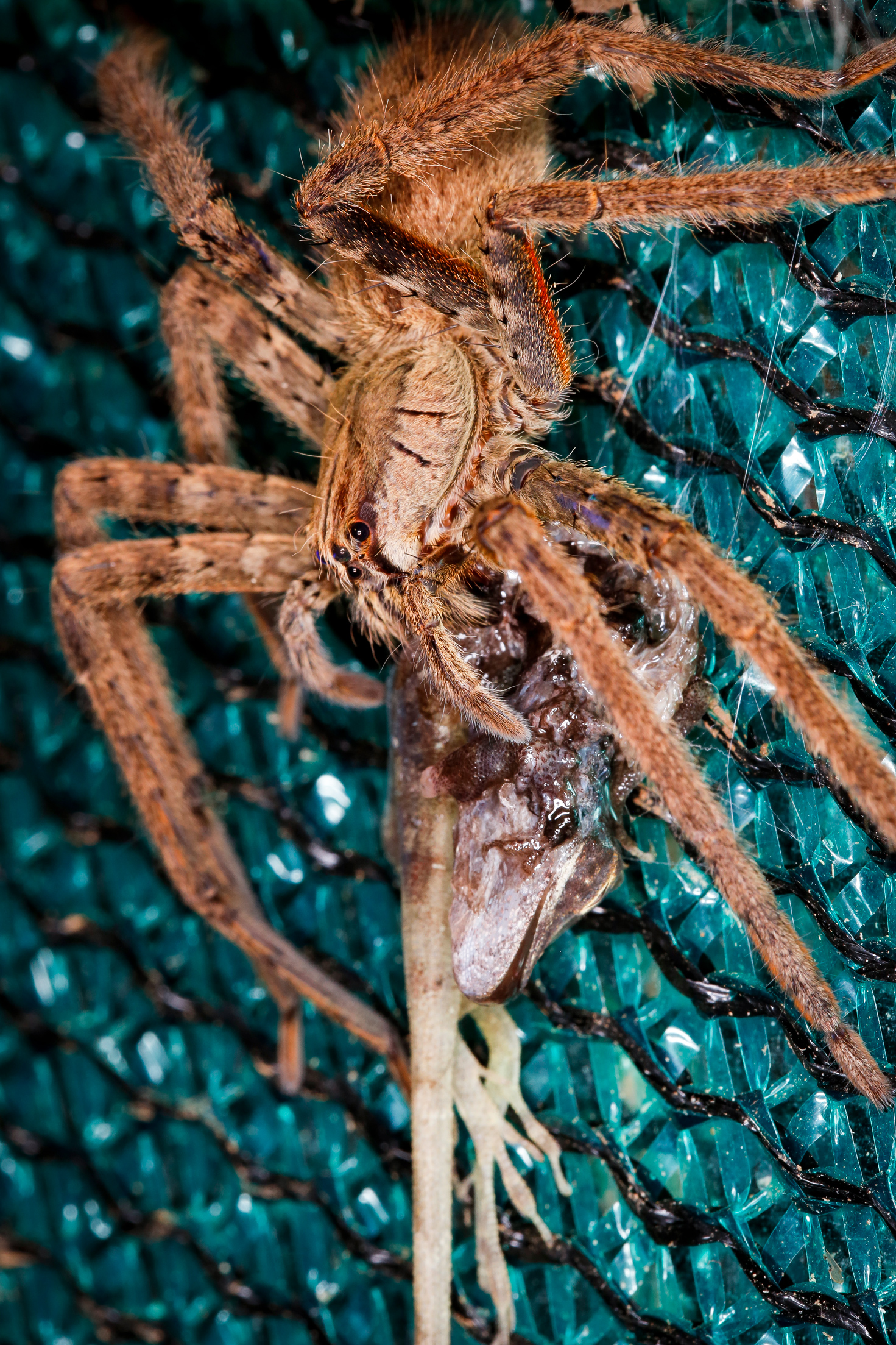
The Brazilian Wandering Spider, also known as the Banana Spider for its proclivity for lying its eggs in bananas, holds the Guinness World Record for being the most venomous spider in the world. It's venom is so potent that some victims die even after receiving anti-venom. Another bizarre characteristic of the Brazilian Wandering Spider's venom is its blood vessel dilating properties, which can cause men who are bitten to suffer from painful and lasting erections. This characteristic has led to some pharmaceutical companies researching this venom on the quest for the next viagra. This large and aggressive spider is very common in Costa Rica. This individual was observed on the outer wall of a cabin at Frontier's Base Camp as it consumed this young basilisk lizard. Taken May, 2017. Photo by Ben Blankenship.

This female mantled howler monkey was being harassed by a troupe of spider monkeys and took refuge on this exposed vine. December 2019. Photo by Ben Blankenship/©2020
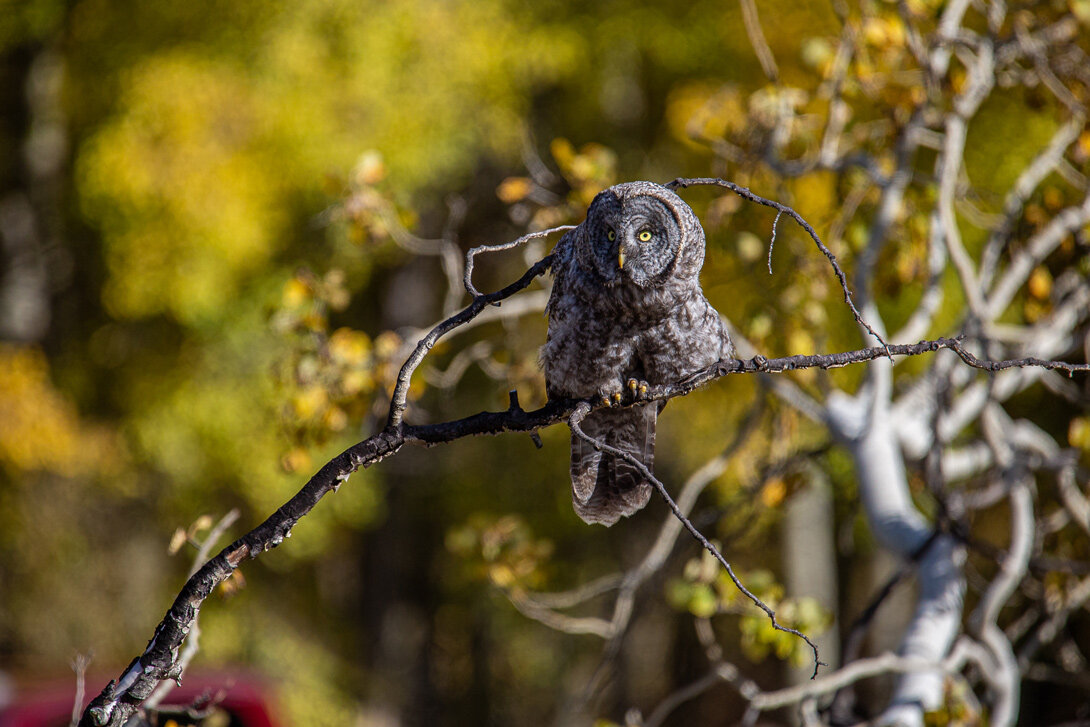
A great owl surveys his surrounds in Grand Teton National Park. Taken in September 2019. Photo by Ben Blankenship.

A pair of subadult brown bears pause their play fighting to check me out in Katmai National Park. Taken September 2019. Photo by Ben Blankenship/©2020
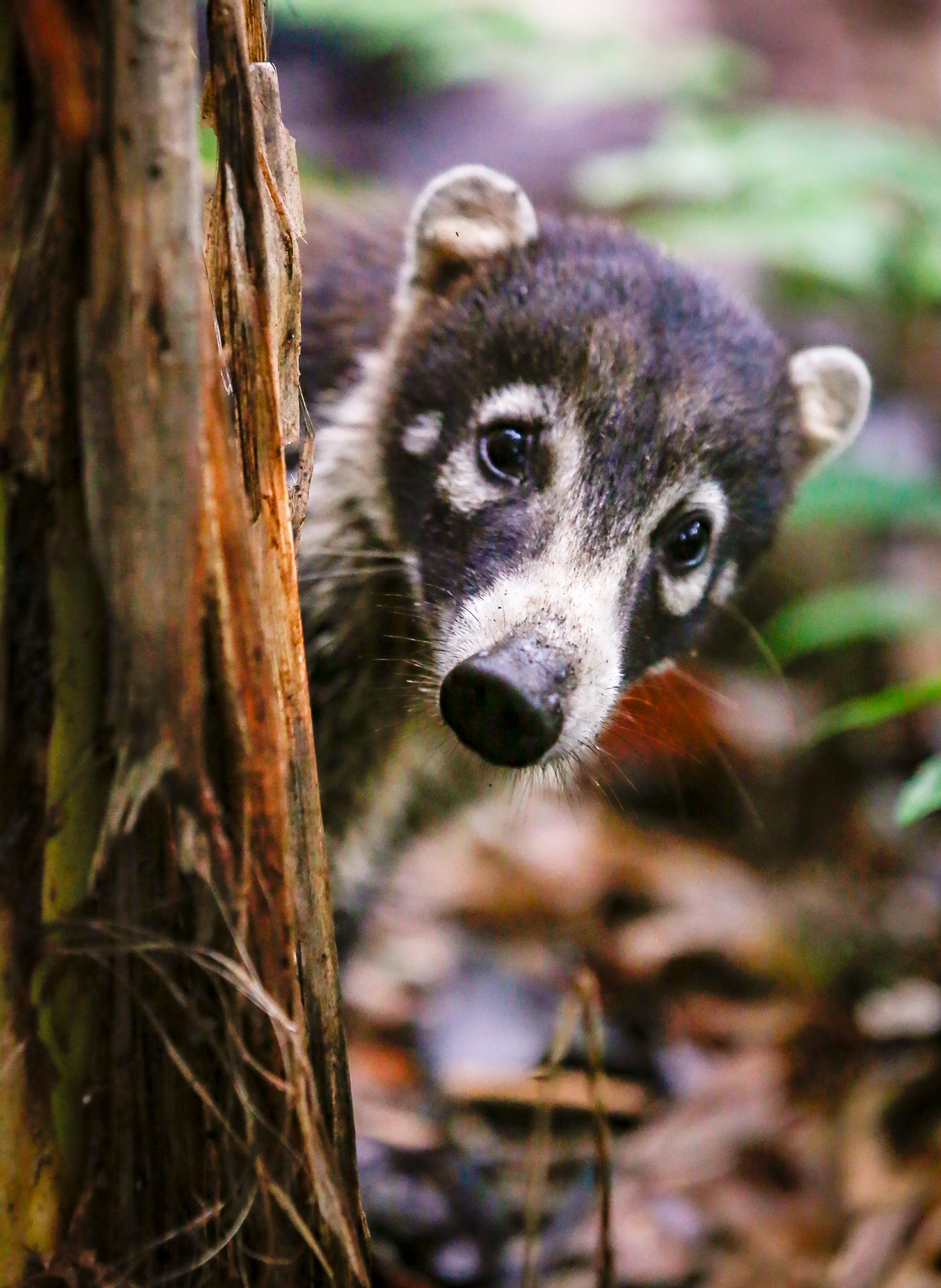
This White Nosed Coati paused for a moment from its hunt for buried land crabs to check out the camera. Taken in Corcovado National Park, Costa Rica. August, 2017. Photo by Ben Blankenship.

Glacier NP. July 2021. By Ben Blankenship.

Two scarlet macaws preen and dry their feathers after a soaking rain on Costa Rica’s Osa Peninsula. Taken December 2019. Photo by Ben Blankenship/©2020


Two subadult brown bears wrestle and play-fight in Katmai National Park. Taken September 2019. Photo by Ben Blankenship/©2020

Yellowstone NP. October 2021. By Ben Blankenship.


Golfo Dulce, Costa Rica. September 2021. By Ben Blankenship.

Lake Clark NP, Alaska. June 2021. Photo by Ben Blankenship.

Two male humpbacks compete for mating rights with a female in Costa Rica’s Golfo Dulce. September 2021. By Ben Blankenship.

Katmai NP, Alaska. September 2021. Photo by Ben Blankenship.

Katmai NP, Alaska. July 2021. By Ben Blankenship.
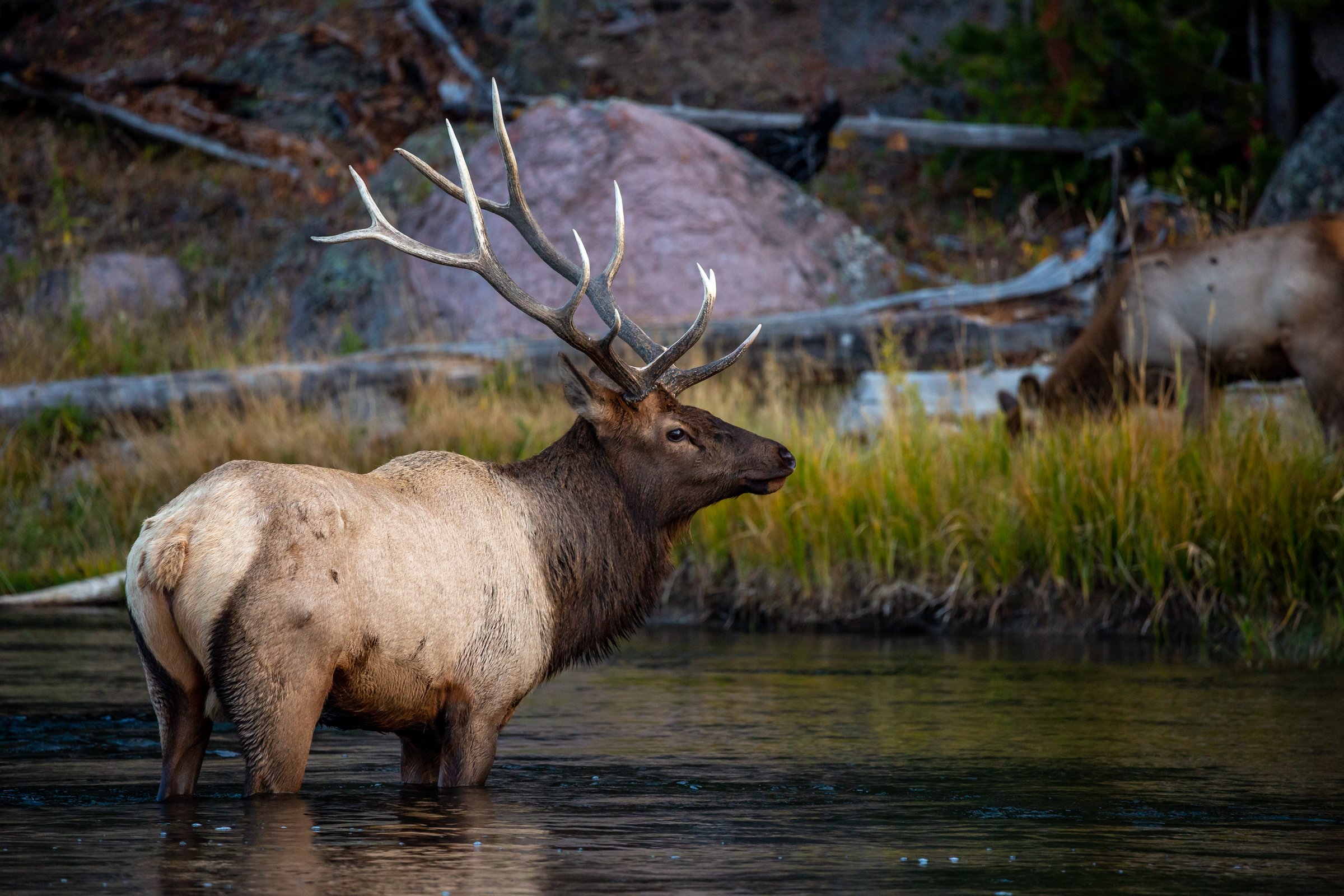






















































































































































































































































During the 2019 summer season in Katmai National Park, temperatures reached record highs for the sixth time in the last ten years. With temperatures soaring over 33 degrees celsius (90 Fahrenheit), the sockeye salmon run completely shutdown for two weeks. Hungry bears still waited at Brooks Falls in anticipation for the return of the salmon for as long as they could before hunger drove them to forage elsewhere. After two weeks, the temperature broke and the salmon run exploded, with over 500 fish jumping the falls per day. Taken in Katmai National Park, July 2019. Photo by Ben Blankenship.
This little snake has spunk. Though only mildly venomous, with rear facing fangs, it lashes out at anything that gets too close. This is a daytime photo taken with a low-powered ring flash to reduce stress on the animal. Taken in Puerto Jimenez, Costa Rica. December 2019. Photo by Ben Blankenship.
One of my favorite Costa Rican birds, the emerald toucanet loves its fruit, as can be seen here. But it also hunts other birds’ eggs and chicks, including the famous resplendent quetzal. Taken in San Gerardo de Dota, Costa Rica. December 2019. Photo by Ben Blankenship.
A juvenile three toed sloth on Costa Rica’s Osa Peninsula. September 2021. Photo by Ben Blankenship.
A dominant male howler stares me down unafraid and in full display of his dominance. Taken on the Osa Peninsula of Costa Rica. Taken April 2019. Photo by Ben Blankenship/©2020
Many people don’t realize that toucans are opportunistic omnivores. They do eat fruits and nuts, but also are notorious amongst Costa Rican locals for raiding the nests of other birds, snatching up eggs and even baby birds. Taken in Carate, Costa Rica, February 2019. Photo by Ben Blankenship.
Katmai NP, Alaska. September 2021. By Ben Blankenship.
Osa Peninsula, Costa Rica. September 2021. By Ben Blankenship.
Kenai Fjords NP, Alaska. June 2021. By Ben Blankenship.
Yellowstone National Park. October 2020. By Ben Blankenship.
Taken in Murchison Falls National Park, Uganda. July 2018. Photo by Ben Blankenship.
A dominant male brown bear shows off his battle scars in Katmai National Park, Alaska. Taken September 2019. Photo by Ben Blankenship/©2020
For my 2019 trip into Lake Clark National Park, I found myself surrounded by brown bears from sun up oil sun down and beyond. This subadult bear had picked a perch to bed down for a few hours between feeding amongst the arctic lupine flowers. This image is one of my favorites from the trip, as it has a magical feel to it. Taken in Lake Clark National Park, June 2019. Photo by Ben Blankenship.
The unofficial mascot of Costa Rica, the red eye tree frog is a photographer’s favorite. Its blood red eyes and blue stripes make it a real stunner. This day time photo was made with the assistance of the amazing folks at Osa Interactive Gardens in Puerto Jimenez. Taken December 2019. Photo by Ben Blankenship.
A violet eared humming bird feeds on a flower in the cloud forests of Costa Rica’s Talamanca Mountains. Taken February 2020. Photo by Ben Blankenship. ©2020
A three toed sloth moves through a tree with her young offspring clinging to her underside. Sloths like these are common along the canals of Tortuguero National Park, Costa Rica. Taken in February 2020. Photo by Ben Blankenship/©2020
This is Benita, a young boa constrictor that was hit by a car several months back near Puerto Jimenez, Costa Rica. It was brought to Osa Interactive Gardens to be rehabilitated under the watchful care of the property’s owners. Now the snake is used to educate local students on how to deal with snakes safely, an important lesson in Costa Rica! Taken December 2019. Photo by Ben Blankenship.
Kenai Fjords NP, Alaska. June 2021. Photo by Ben Blankenship.
This squirrel monkey took a short break from foraging and closed its eyes for a few moments on Costa Rica’s Osa Peninsula. Taken in Carate, Costa Rica. December 2018. Photo by Ben Blankenship.
Wading along the Brooks River in Katmai National Park is like performing a constant dance to keep a safe viewing distance from the multiple brown bears fishing in the river. This pretty young female emerged from the tall grasses just behind me, giving me a real surprise. I retreated to a safe distance for shooting this image. Taken in Katmai National Park, July 2019. Photo by Ben Blankenship.
I spotted this quetzal in the cloud forests near San Gerardo de Dota, Costa Rica. You can tell by the length of his tail that he is a young male. A mature male’s tail can be over 75% longer than this bird’s. Taken December 2019. Photo by Ben Blankenship.
A juvenile spectacled caiman rests on a log on Costa Rica’s Osa Peninsula. Taken February 2020. Photo by Ben Blankenship. ©2020
The depth of this tapir’s eyes tell of a soul and intelligence beyond our ability to understand. This female was moving through thick underbrush in Costa Rica’s Corcovado National Park. Taken in February 2020. Photo by Ben Blankenship/©2020
The red eye tree frog is the unofficial mascot of Costa Rica, and is one of my favorite macro subjects to photograph. This female frog was hanging around the ponds of Osa Interactive Gardens which allowed some daytime shots of this little beauty. Taken in Puerto Jimenez, Costa Rica, December 2019. Photo by Ben Blankenship/©2020
A bull bison follows a female across the lower geyser basin in Yellowstone National Park. Taken in September 2019. Photo by Ben Blankenship.
This young female became known as Limpy during my stay in Lake Clark National Park. A noticeable wound can be seen on her left rear leg, most likely caused by another bear. Brown bears in Lake Clark National Park, like other brown bears, are constantly jockeying for dominance, occasionally fighting. This young bear was most likely caught off guard by another bear, as she is too small to want to stand up and fight at this point in her life. Taken in June 2019. Photo by Ben Blankenship.
Glass frogs get their name from their characteristic translucent skin which allows them to better blend in with whatever surface they are sitting on as a defense mechanism. The bare hearted glass frog is considered to be the most transparent of all of the glass frog species. This individual was smitten with the camera flash. After this image was taken, the frog jumped onto the camera lens, crawled up onto the flash, and then jumped onto my face. Taken March, 2017. Carate, Costa Rica. Photo by Ben Blankenship.
Taken in Murchison Falls National Park, Uganda. July 2018. Photo by Ben Blankenship.
Taken in the could forests of San Gerardo de Dota, Costa Rica. December 2019. Photo by Ben Blankenship.
A subadult brown bear digs for clams at low tide on Chinitna Bay in Lake Clark National Park, Alaska. Twenty years ago, only a few of the local bears were known to dig for clams during low tide. But, this generation of coastal brown bears has taken up clamming as one of their primary means of finding protein after they leave their dens in the spring. Taken in Lake Clark National Park, Alaska. June 2019. Photo by Ben Blankenship.
A baby white faced capuchin clings to its mother’s back in Costa Rica. Taken in Carate, Costa Rica. December 2018. Photo by Ben Blankenship.
Amongst the most common of Osa Peninsula reptiles, the black spiny tailed iguana may be photogenic, but has attitude! This big male has occupied the same tree for the last two years, scaring off any rivals with that gaping mouth and aggressive head banging. Taking in Carate, Costa Rica, February 2019. Photo by Ben Blankenship.
I’ve photographed brown and black bears in several destinations in Alaska, Montana, and Wyoming. And of those, Lake Clark National Park is my favorite. The bears here are everywhere and wild. This mother and cub surprised me by coming over a low hill on my left while I was photographing a different female bear. I was able to grab a quick shot before slinking back out of their way. Taken in June 2019. Photo by Ben Blankenship.
This pootoo spent nearly three weeks on this perch guarding its nest and eggs. In Spanish, this bird is known as pajaro palo, translated as “stick bird,” for its incredible camouflage. Taken on the Osa Peninsula, Costa Rica. December 2018. Photo by Ben Blankenship.
Lake Clark National Park is a remote wilderness in southern Alaska, and it is one of the premier locations for viewing wild coastal brown bears in their natural habitat. It is also one of my favorite locations for photographing bears due to the variety of backgrounds and behaviors one is able to witness there. In this photo, a bank of thick fog blanketed the Chinitna Bay mud flats as bears were clamming. Taken in Lake Clark National Park, Alaska. June 2019. Photo by Ben Blankenship.
This two toed sloth happened to fall asleep in a great pose for this photograph. Taken on the Osa Peninsula, Costa Rica. December 2018. Photo by Ben Blankenship.
One of my favorite bears seen at Brooks Falls in Katmai National Park, I took to caring her Blondie. Here she moves up Brooks River in search of summer sockeye salmon. Taken Katmai National Park, Alaska. July 2019. Photo by Ben Blankenship.
Often called the "elves of the Costa Rican rainforest," squirrel monkeys are agile, playful, and intelligent. The smallest of the four primate species living in Costa Rica, it is believed that they first made their way to Central America as pets of traders and/or indigenous nomads.
Three yearling brown bear cubs wait alongside Brooks River while their mother fishes for sockeye salmon nearby. The life of a bear cub is perilous, as male bears will attack and kill cubs sired by other males. Taken in Katmai National Park, July 2019. Photo by Ben Blankenship
This toucan was all about making a scene on Costa Rica’s Osa Peninsula. Taken in Carate, Costa Rica. December 2018. Photo by Ben Blankenship.
A violet eared hummingbird pokes its perfectly shaped beak into a flower in the cloud forests of Costa Rica’s Talamanca Mountains. Taken in February 2020. Photo by Ben Blankenship/©2020
A bull bison grazes amongst golden grasses in Yellowstone National Park. Taken September 2019. Photo by Ben Blankenship.
This tamandua was one weird little dude. Usually, their lighter fur is a creamy white. But this guy was chocolate brown. I’m not sure if he was simply very dirty or if he was just a strangely colored little anteater. Taken in Rio Oro, Costa Rica, February 2019. Photo by Ben Blankenship.
Taken in Carate, Costa Rica. Photo by Ben Blankenship. March 2018.
Taken in Murchison Falls National Park, Uganda. July 2018. Photo by Ben Blankenship.
Brooks River, Katmai National Park, Alaska. 2022
This white faced capuchin reveals his sizable chompers in a threat display. Taken in Carate, Costa Rica. December 2018. Photo by Ben Blankenship
On this juvenile frog, you can see its tadpole tail still nearly completely intact, and its newly formed legs. This individual was observed on a nighttime amphibian and reptile survey conducted by the NGO Frontier in Carate, Costa Rica on the Osa Peninsula. Taken May, 2017. Photo by Ben Blankenship.
A bear known as Lefty fishes the lip at Brooks Falls in Katmai National Park. Taken in July 2019. Photo by Ben Blankenship.
This Brown Blunt Headed Vine Snake was extended out over a trail near Corcovado National Park in Costa Rica. The snake was spotted during a nighttime amphibian and reptile survey being conducted by the conservation NGO Frontier. Taken January 2017. Photo by Ben Blankenship
This young brown bear had just emerged from hibernation in Lake Clark National Park. He is skinny and hungry here, and was digging for clams on the mud flats of Chinitna Bay during low tide. Taken in June 2019. Photo by Ben Blankenship.
Taken in Carate, Costa Rica. December 2018. Photo by Ben Blankenship
Taken in Murchison Falls National Park, Uganda. July 2018. Photo by Ben Blankenship.
This young brown bear, with her light blonde coat, was quite curious about the humans on this stretch of Brooks River in Katmai National Park. She seemed more comfortable in close proximity to the people who were either fishing or shooting photos. Perhaps because the bigger bears that could pose a risk to her wanted nothing to do with us. Taken in Katmai National Park, July 2019. Photo by Ben Blankenship.
A mother Geoffrey’s spider monkey sits in the tree limbs with her youngster. Taken on the Osa Peninsula of Costa Rica. Taken April 2019. Photo by Ben Blankenship/©2020
Hanging from a leaf about three meters above a stream, this gelatinous frog's nest was filled with wriggling tadpoles awaiting to be mature enough to emerge from their mucous covered eggs. This was a sight we had been seeking for weeks, and to discover this nest at such a stage of development was a real treat. Observed on a nighttime amphibian and reptile survey conducted by the NGO Frontier in Carate, Costa Rica on the Osa Peninsula. Taken May, 2017. Photo by Ben Blankenship.
Taken in Murchison Falls National Park, Uganda. July 2018. Photo by Ben Blankenship.
These two granular glass frogs were observed on a nighttime amphibian and reptile survey by the NGO Frontier in Carate, Costa Rica on the Osa Peninsula. Glass frogs get their name from their characteristic translucent skin which allows them to better blend in with whatever surface they are sitting on as a defense mechanism.Taken March, 2017. Photo by Ben Blankenship.
The Central American squirrel monkey, known in Costa Rica as El Mono Titi, is one of my favorites for its beautiful expressive eyes. This curious monkey was oscillating between napping and gazing into my lens in Carate, Costa Rica. Taken in February 2019. Photo by Ben Blankenship.
This male resplendent quetzal, one of the most famous of Central American birds, sits here in an avocado tree waiting for his mate to arrive. These magnificent birds adorn flags, have national currencies named after them (Guatemala), and are the subject of ancient folklore, dating back to pre-Colombian era Central America. This photo was taken in San Gerardo de Dota, Costa Rica, February 2019. Photo by Ben Blankenship.
This beautiful little female bear earned the nickname Limpy due to a wound suffered to her rear left leg, most likely caused by another brown bear. Taken in Lake Clark National Park, June 2019. Photo by Ben Blankenship.
A Gladiator Tree Frog observed during a nighttime Amphibian and Reptile survey conducted by the NGO Frontier in Carate, Costa Rica on the Osa Peninsula. Photo by Ben Blankenship.
Lake Clark NP, Alaska. June 2021. Photo by Ben Blankenship.
A small group of females and calves approach during the fall in Yellowstone National Park. Taken in September 2019. Photo by Ben Blankenship.
A violet eared hummingbird’s iridescent plumage gleams in the soft light of the cloud forest. Taken in San Gerardo de Dota, Costa Rica. February 2020. Photo by Ben Blankenship/©2020
This gladiator tree frog took a special interest in my camera flash, staring straight into the camera lens for its portrait. The gladiator tree frog gets its name from the male's characteristic barbs on its hind legs which it uses to battle other males for mating rights with females. Battles are sometimes to the death. It was observed on a nighttime amphibian and reptile survey by the NGO Frontier in Carate, Costa Rica on the Osa Peninsula. Taken March, 2017. Photo by Ben Blankenship.
Taken in Yellowstone National Park, September 2019. Photo by Ben Blankenship.
This resident pod of orcas live in and around Kenai Fjords National Park, Alaska. This young female spy hopped frequently to check out the boat of photographers floating nearby. Taken in June 2019. Photo by Ben Blankenship.
Lake Clark NP, Alaska. June 2021. Photo by Ben Blankenship.
A dominant Alaskan brown bear, known as Otis, fishes below Brooks Falls in Katmai National Park, Alaska. Taken July 2019. Photo by Ben Blankenship/©2020
This female Golfo Dulce anole was observed on a nighttime amphibian and reptile survey conducted by the NGO Frontier in Carate, Costa Rica on the Osa Peninsula. The Golfo Dulce anole gets its name from El Golfo Dulce, the gulf that separates the Osa Peninsula from mainland Costa Rica.Taken March, 2017. Photo by Ben Blankenship.
This white nosed coati was part of a troupe of around 16 individual animals that were making their way through the canopy just above the NGO Frontier's jungle camp around sunset. Taken February, 2017. Photo by Ben Blankenship.
This small headed tree frog was observed on a nighttime amphibian and reptile survey by the NGO Frontier in Carate, Costa Rica on the Osa Peninsula. Taken March, 2017. Photo by Ben Blankenship.
A scarlet macaw lands gracefully in the treetops on Costa Rica’s Osa Peninsula. Taken in Carate, Costa Rica. December 2018. Photo by Ben Blankenship
A young brown bear stands to survey his surroundings while fishing on Brooks River in Katmai National Park. Taken in July 2019. Photo by Ben Blankenship.
A Great White Egret stalks the lagoon for fish and crustaceans on the Osa Peninsula, Costa Rica. Taken February 2019. Photo by Ben Blankenship.
This spider eating its prey was observed on a nighttime amphibian and reptile survey conducted by the NGO Frontier in Carate, Costa Rica on the Osa Peninsula. Taken March, 2017. Photo by Ben Blankenship.
This female orca surfaced so close to our boat that she coated me and my camera in a spray of sea water and orca snot. Taken in Kenai Fjords National Park, Alaska. June 2019. Photo by Ben Blankenship
This beautiful brown bear was walking the beaches of Lake Clark National Park just before sunset. Her beautiful dish shaped face lit up in the soft warm light, she was curious and a bit grouchy as she walked past. Taken in June 2019. Photo by Ben Blankenship.
Two subadult brown bears wrestle in the grass adjacent to Brooks River in Katmai National Park. Taken September 2019. Photo by Ben Blankenship/©2020
A sea otter floats in Resurrection Bay near Seward, Alaska. Taken in June 2019. Photo by Ben Blankenship.
Brooks Falls, Katmai NP, Alaska. Taken July 2021. By Ben Blankenship.
A green basilisk lizard (aka the Jesus Christ Lizard) gazes warily into my camera lens as we float by a on a boat in Tortuguero National Park, Costa Rica. Taken February 2020. Photo by Ben Blankenship/©2020
This Golfo Dulce anole was observed on a nighttime amphibian and reptile survey conducted by the NGO Frontier in Carate, Costa Rica on the Osa Peninsula. The Golfo Dulce anole gets its name from El Golfo Dulce, the gulf that separates the Osa Peninsula from mainland Costa Rica. Taken May, 2017. Photo by Ben Blankenship.
Brown bears fish all day long during the summer on Brooks River in Katmai National Park. Here, a bear takes a break from “snorkeling” for sockeye salmon to give me and my camera a quick glance. Taken in Katmai National Park, July 2019. Photo by Ben Blankenship.
A mother bison guides her two yearling calves through the lower geyser basin in Yellowstone National Park. Taken in September 2019. Photo by Ben Blankenship.
This bizarre and beautiful Harlequin Beetle was observed on a nighttime amphibian and reptile survey conducted by the NGO Frontier in Carate, Costa Rica on the Osa Peninsula. Taken March, 2017. Photo by Ben Blankenship.
This large gladiator tree frog was observed on a nighttime amphibian and reptile survey conducted by the NGO Frontier in Carate, Costa Rica on the Osa Peninsula. The gladiator tree frog gets its name from the male's characteristic barbs on its hind legs which it uses to battle other males for mating rights with females. Battles are sometimes to the death. Taken March, 2017. Photo by Ben Blankenship.
Here, Otis, one of the oldest bears at Brooks Falls, fishes the area known as “The Office” for summer sockeye salmon in Katmai National Park, Alaska. Taken in July 2019. Photo by Ben Blankenship.
A Red Eye Tree Frog perches on a the petals on a flower on Costa Rica’s Osa Peninsula. Taken in February 2020. Photo by Ben Blankenship/©2020
A male orca surfaces in Kenai Fjords National Park, Alaska. Taken June 2019. Photo by Ben Blankenship/©2020
A bull elk moves his harem of cows through the town of Mammoth Hot Springs in Yellowstone National Park. Taken in September 2019. Photo by Ben Blankenship.
A three toed sloth basks in the morning sun, clinging to the branches of a tree overhanging a canal of the Rio Sierpe river system near Drake Bay, Costa Rica. Taken February 2020. Photo by Ben Blankenship/©2020
A brown bear catches a sockeye salmon at Brooks Falls in Katmai National Park. The force of the bear’s bite sent a stream of blood pouring from the doomed salmon. Taken September 2019. Photo by Ben Blankenship/©2020
This big bull bison was cruising along in Yellowstone National Park in the autumn of 2019. He had apparently had an action-packed summer, during the annual bison rut, during which males battle ferociously for mating rights. You can see his left horn is splintered from some massive impact, most likely with the skull of another bull bison.
The sound of this frog's call sounds very similar to the sound of an old video game laser sound effect. In fact, the first time I heard its call, I believed it to be emanating from my cell phone. Upon research online though, we learned the calls were being emitted by the Tungara Frog, sometimes apparently nicknamed, the video game frog. This individual was observed on a nighttime amphibian and reptile survey conducted by the NGO Frontier in Carate, Costa Rica on the Osa Peninsula. Taken March, 2017. Photo by Ben Blankenship.
A black bear cub grazes on fresh sedges in Yellowstone National Park. Taken in May 2019. Photo by Ben Blankenship.
This Yellow Hornet was observed on a nighttime amphibian and reptile survey conducted by the NGO Frontier in Carate, Costa Rica on the Osa Peninsula. Taken March, 2017. Photo by Ben Blankenship.
The Green and Black Poison Dart Frog's name is derived from the historical practice of indigenous peoples harvesting its poison and using it to coat their darts and arrows for hunting. The very small amount of poison the frog possesses is enough to make a human heart stop beating. However, like most poison dart frogs, the green-and-black poison dart frog only releases its poison if it feels threatened. This individual was observed in Corcovado National Park, Costa Rica, on the Osa Peninsula. Taken August, 2017. Photo by Ben Blankenship.
This young male was out for trouble as he approached myself and a group of other photographers in Lake Clark National Park. But, with some requisite huffing and puffing, we convinced him we were more trouble than it was worth. Taken in June 2019. Photo by Ben Blankenship.
This adult Geoffrey's Spider Monkey was observed inside Corcovado National Park, Costa Rica. It's body position and "sad-looking" eyes gave me an impression of forlornness. Taken August, 2017. Photo by Ben Blankenship.
This male Geoffrey's Spider Monkey was observed leaping from tree to tree inside Corcovado National Park, Costa Rica. Taken August, 2017. Photo by Ben Blankenship.
This male Geoffrey's Spider Monkey was observed hanging by its tail from a tree limb inside Corcovado National Park, Costa Rica. Taken August, 2017. Photo by Ben Blankenship.
This granular glass frog was observed on a nighttime amphibian and reptile survey by the NGO Frontier in Carate, Costa Rica on the Osa Peninsula. Glass frogs get their name from their characteristic translucent skin which allows them to better blend in with whatever surface they are sitting on as a defense mechanism. Taken March, 2017. Photo by Ben Blankenship.
A large American Crocodile basks in the sun of Rio Sierpe near Drake Bay in Costa Rica. Taken in February 2020. Photo by Ben Blankenship/©2020
A great gray owl perches amongst a grove of aspen trees, scanning the ground for movement on its quest for a meal. Taken in Grand Teton National Park, October 2019. Photo by Ben Blankenship/©2020
This adult female Baird’s Tapir was spotted in Costa Rica’s Corcovado National Park as she moved through thick underbrush. Not pictured is her yearling offspring that I was unable to get into the picture. Taken February 2020. Photo by Ben Blankenship/©2020
A spectacled caiman uses its excellent camouflage to hide amongst downed limbs in the canals of Costa Rica’s Tortuguero National Park. Taken February 2020. Photo by Ben Blankenship/©2020
A scarlet macaw makes its final approach to its nest on the Osa Peninsula in Costa Rica. Taken in February 2020. Photo by Ben Blankenship/©2020
A young white face capuchin munches on a mangrove leaf while resting on the mangrove branches. Taken at Rio Sierpe, Costa Rica February 2020. Photo by Ben Blankenship/©2020
An osprey leaves its perch in a dive for fish in Costa Rica’s Tortuguero National Park. Taken February 2020. Photo by Ben Blankenship/©2020
A white faced capuchin walks along a palm frond in Costa Rica’s Tortuguero National Park. February 2020. Photo by Ben Blankenship/©2020
A sockeye salmon makes the leap up Brooks Falls at Katmai National Park, straight towards a waiting brown bear waiting at the top of the falls. Taken September 2019. Photo by Ben Blankenship/©2020
This juvenile blue-throated toucanet (aka emerald toucanet) was spotted in the cloud forests of Costa Rica’s Talamanca Mountains near Los Quetzales National Park. February 2020. Photo by Ben Blankenship/©2020
This enormous and beautiful example of an Owl Butterfly was observed on a nighttime amphibian and reptile survey conducted by the NGO Frontier in Carate, Costa Rica on the Osa Peninsula. Taken April, 2017. Photo by Ben Blankenship.
The golden strands of this spider provide its namesake, the golden orb weaver. Taken in Cabo Matapalo, Costa Rica. February 2020. Photo by Ben Blankenship/©2020
The permanent smile of the scarlet smile is displayed here as the bird roosted on a palm frond near Costa Rica's Corcovado National Park. Taken December 2019. Photo by Ben Blankenship/©2020
This American Crocodile was spotted basking in the sun along the banks of Rio Sierpe near Drake Bay in Costa Rica. February 2020. Photo by Ben Blankenship/©2020
This female Baird’s Tapir was spotted in Costa Rica’s Corcovado National Park with her calf, which happened to be very camera shy. February 2020. Photo by Ben Blankenship/©2020
A cinnamon colored black bear traverses the rocks adjacent to the Madison River in Yellowstone National Park. Taken May 2019. Photo by Ben Blankenship/©2020
This beautiful male resplendent quetzal was spotted in San Gerardo, Costa Rica as it fed on young avocados in the early morning light. December 2019. Photo by Ben Blankenship/©2020
Two subadult brown bears wrestle and play fight in Katmai National Park, Alaska. Taken September 2019. Photo by Ben Blankenship/©2020
This male black throated trogon was spotted in Costa Rica’s Corcovado National Park as it took turns digging out a nesting hole with its female counterpart. December 2019. Photo by Ben Blankenship/©2020
This large example of a harlequin beetle was spotted near Puerto Jimenez on Costa Rica’s Osa Peninsula. December 2019. Photo by Ben Blankenship/©2020
A female Geoffrey’s spider monkey surveys the surroundings as it hangs from its prehensile tail. Taken near Costa Rica’s Corcovado National Park. December 2019. Photo by Ben Blankenship/©2020
The Brazilian Wandering Spider, also known as the Banana Spider for its proclivity for lying its eggs in bananas, holds the Guinness World Record for being the most venomous spider in the world. It's venom is so potent that some victims die even after receiving anti-venom. Another bizarre characteristic of the Brazilian Wandering Spider's venom is its blood vessel dilating properties, which can cause men who are bitten to suffer from painful and lasting erections. This characteristic has led to some pharmaceutical companies researching this venom on the quest for the next viagra. This large and aggressive spider is very common in Costa Rica. This individual was observed on the outer wall of a cabin at Frontier's Base Camp as it consumed this young basilisk lizard. Taken May, 2017. Photo by Ben Blankenship.
This female mantled howler monkey was being harassed by a troupe of spider monkeys and took refuge on this exposed vine. December 2019. Photo by Ben Blankenship/©2020
A great owl surveys his surrounds in Grand Teton National Park. Taken in September 2019. Photo by Ben Blankenship.
A pair of subadult brown bears pause their play fighting to check me out in Katmai National Park. Taken September 2019. Photo by Ben Blankenship/©2020
This White Nosed Coati paused for a moment from its hunt for buried land crabs to check out the camera. Taken in Corcovado National Park, Costa Rica. August, 2017. Photo by Ben Blankenship.
Glacier NP. July 2021. By Ben Blankenship.
Two scarlet macaws preen and dry their feathers after a soaking rain on Costa Rica’s Osa Peninsula. Taken December 2019. Photo by Ben Blankenship/©2020
Two subadult brown bears wrestle and play-fight in Katmai National Park. Taken September 2019. Photo by Ben Blankenship/©2020
Yellowstone NP. October 2021. By Ben Blankenship.
Golfo Dulce, Costa Rica. September 2021. By Ben Blankenship.
Lake Clark NP, Alaska. June 2021. Photo by Ben Blankenship.
Two male humpbacks compete for mating rights with a female in Costa Rica’s Golfo Dulce. September 2021. By Ben Blankenship.
Katmai NP, Alaska. September 2021. Photo by Ben Blankenship.
Katmai NP, Alaska. July 2021. By Ben Blankenship.